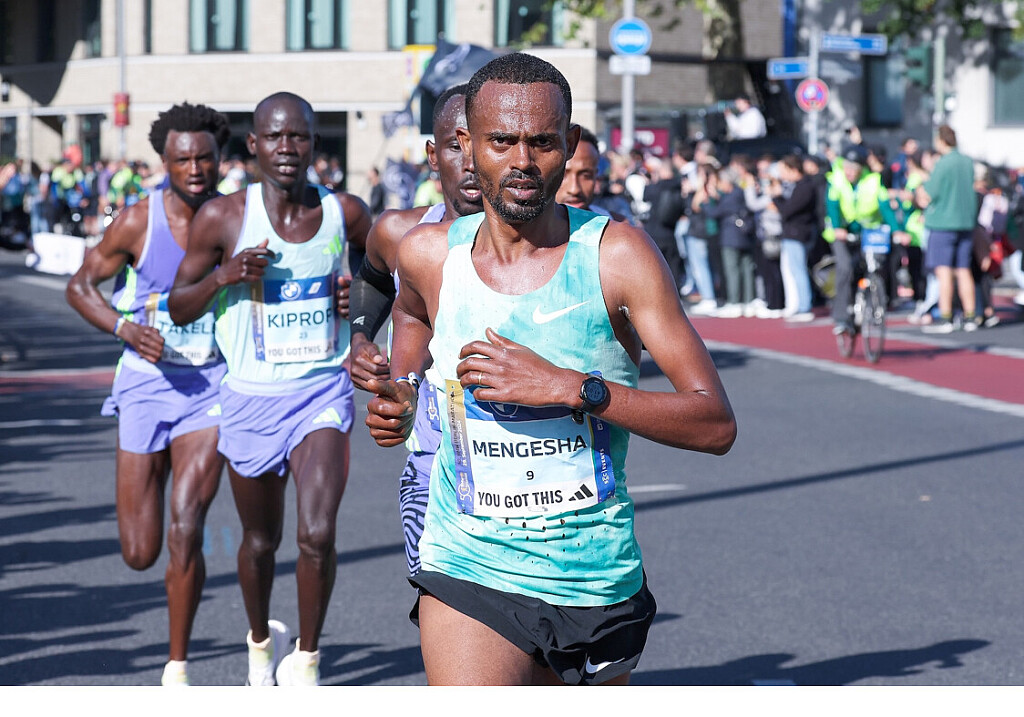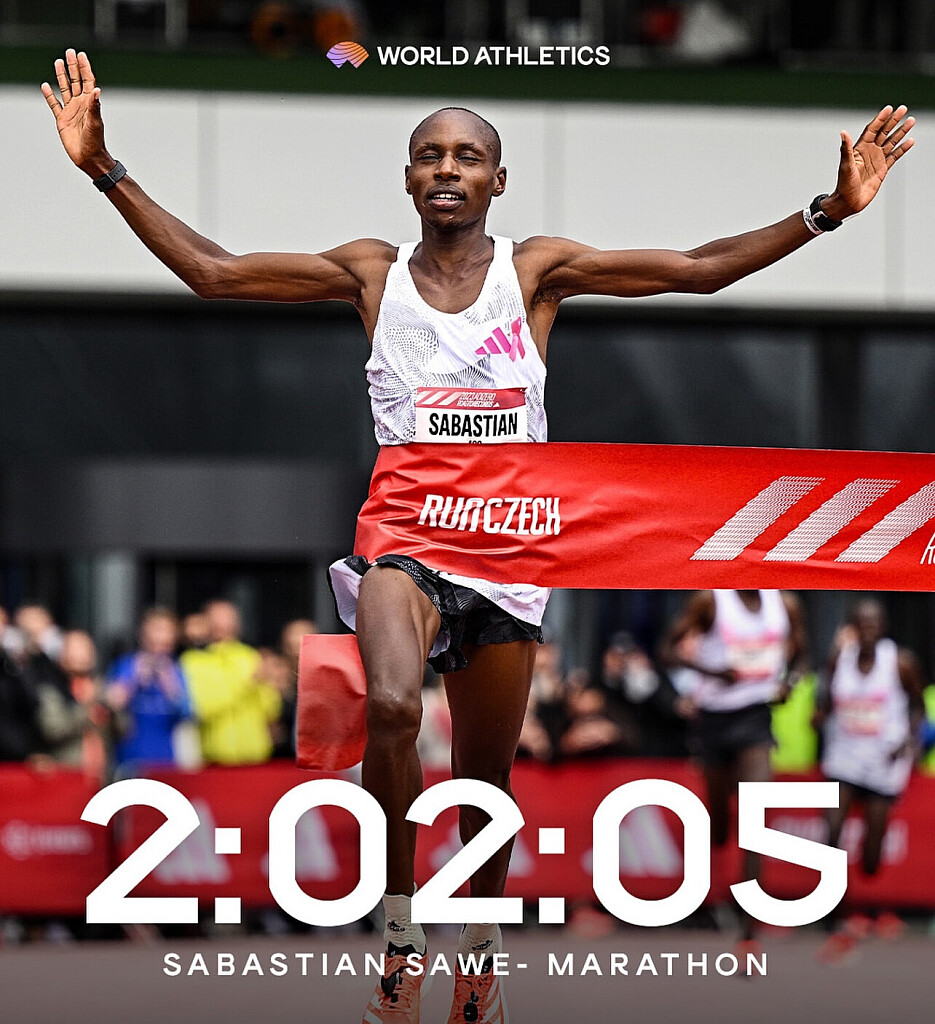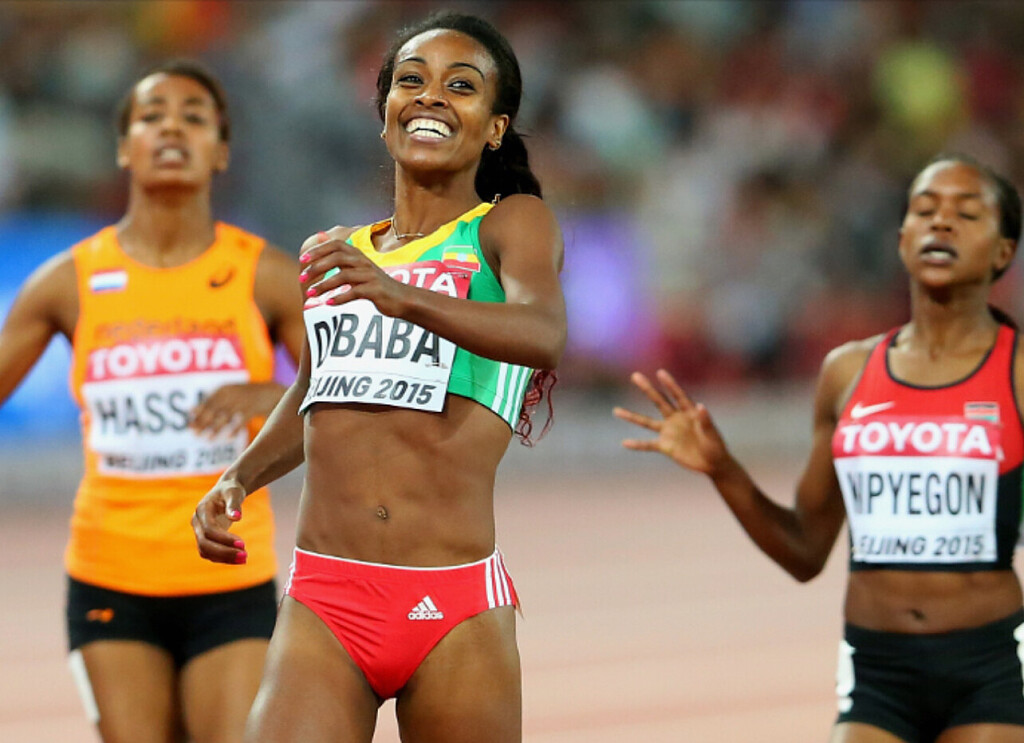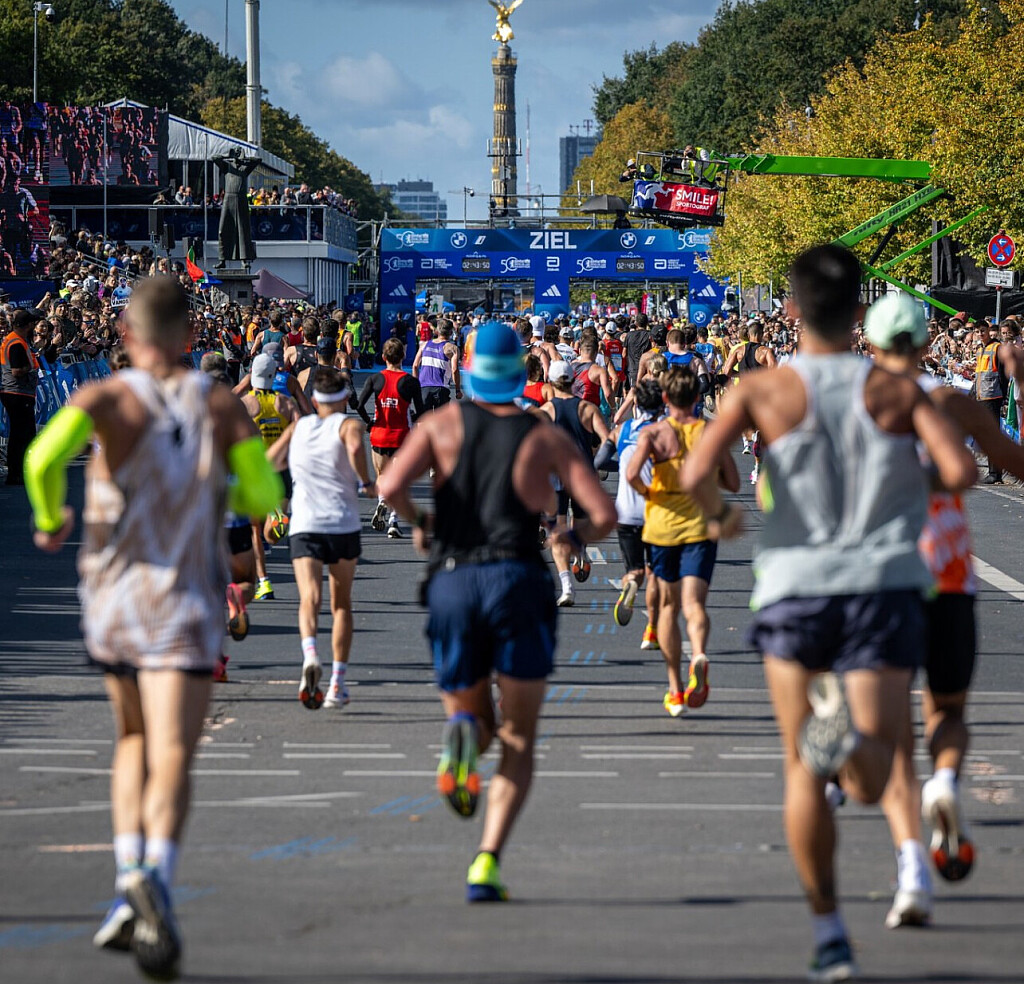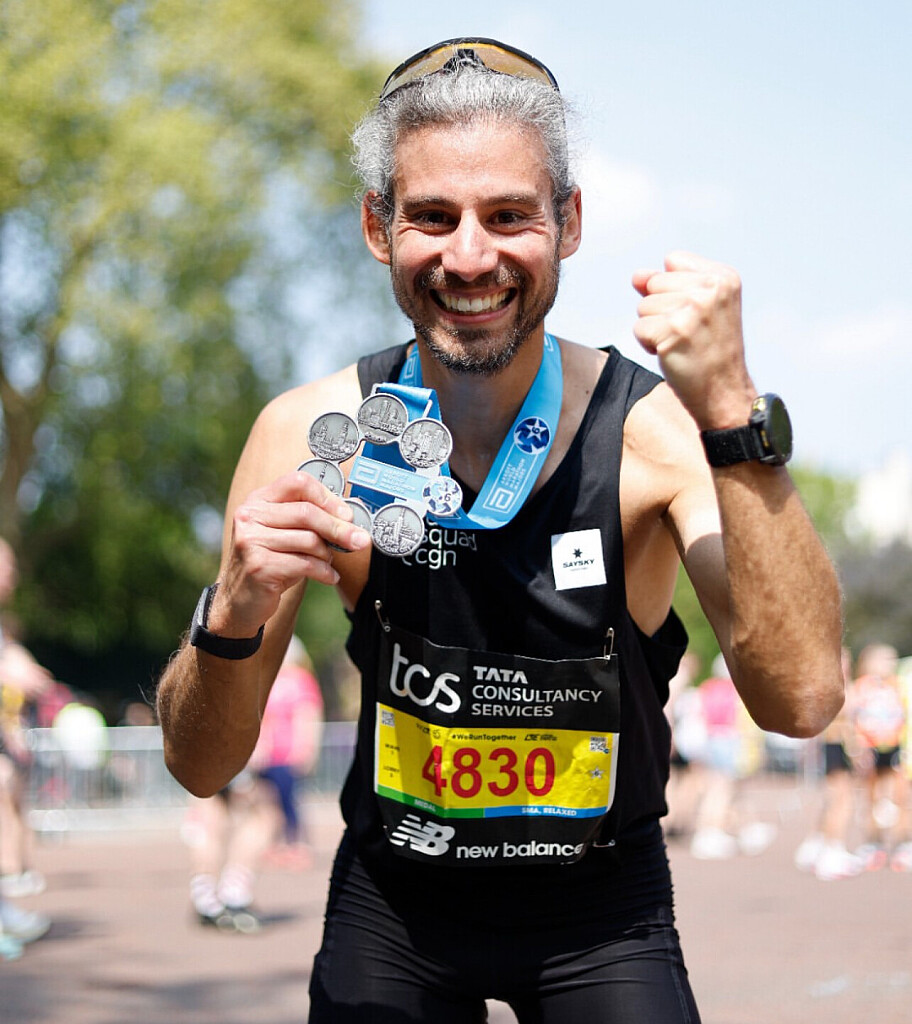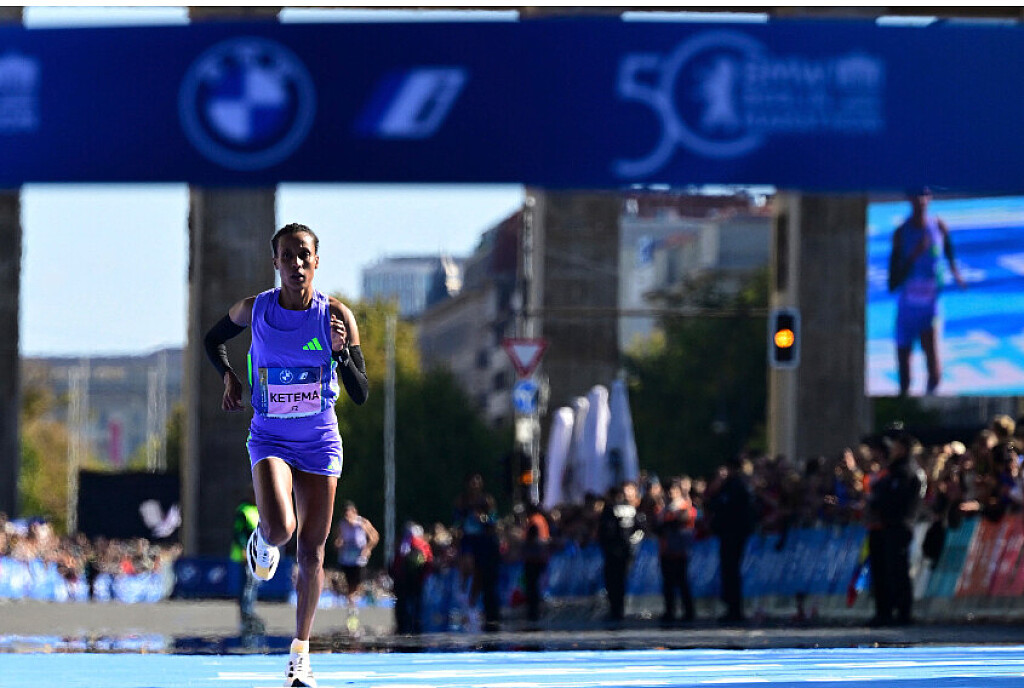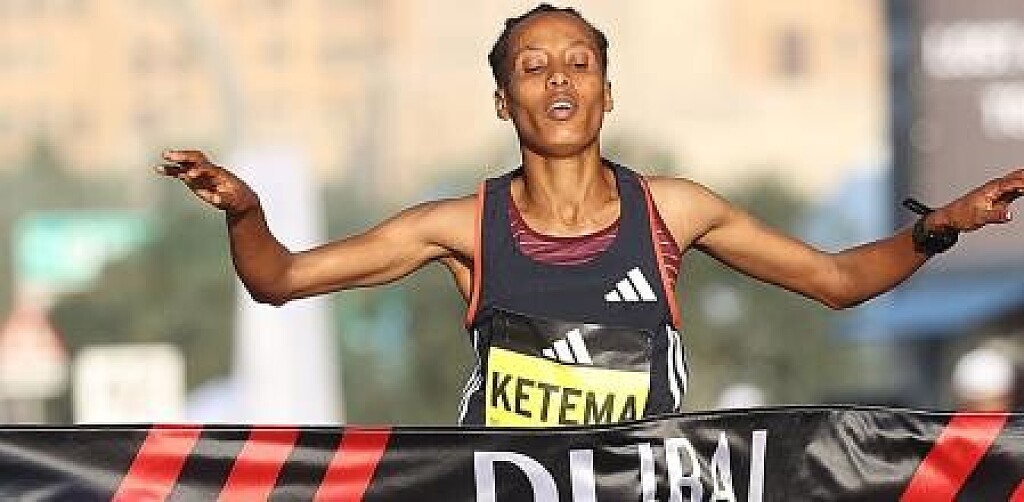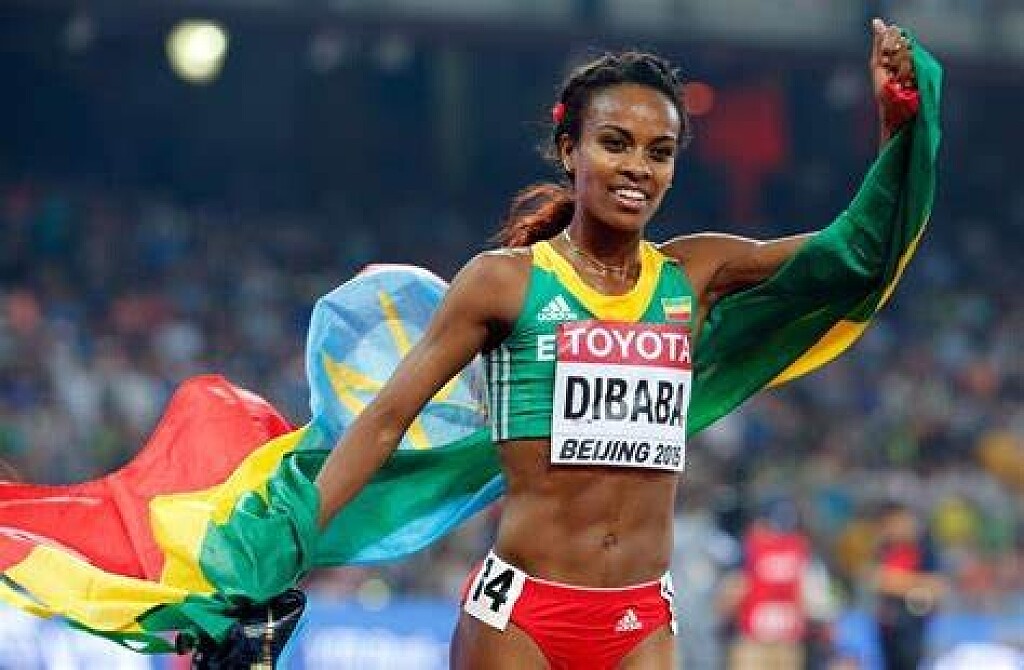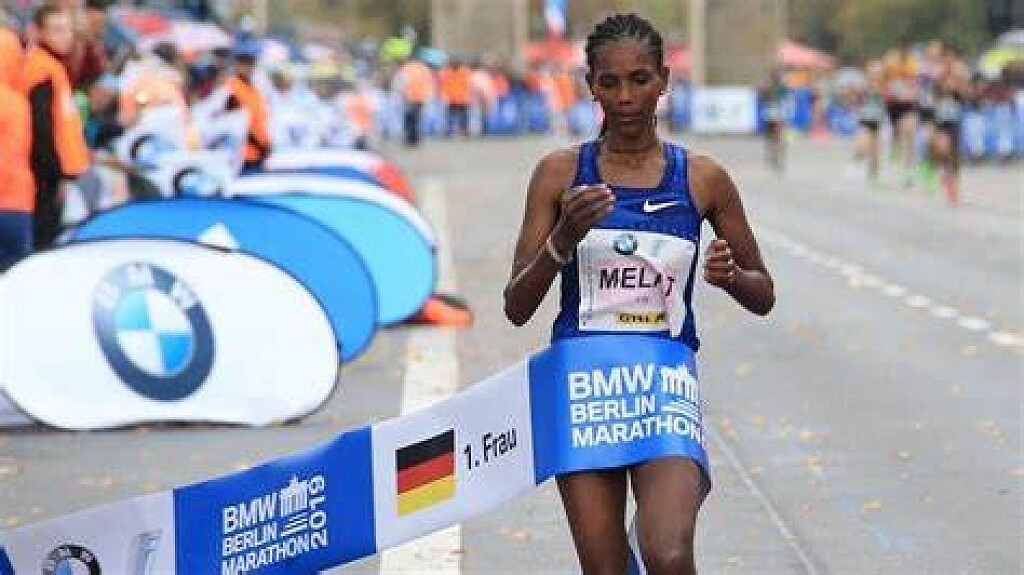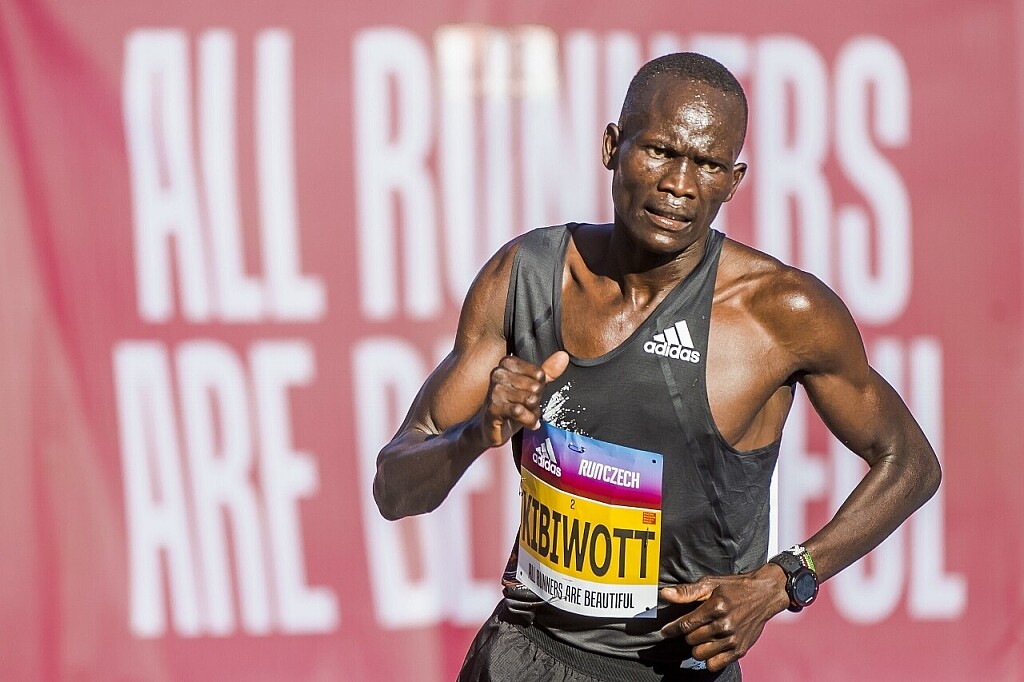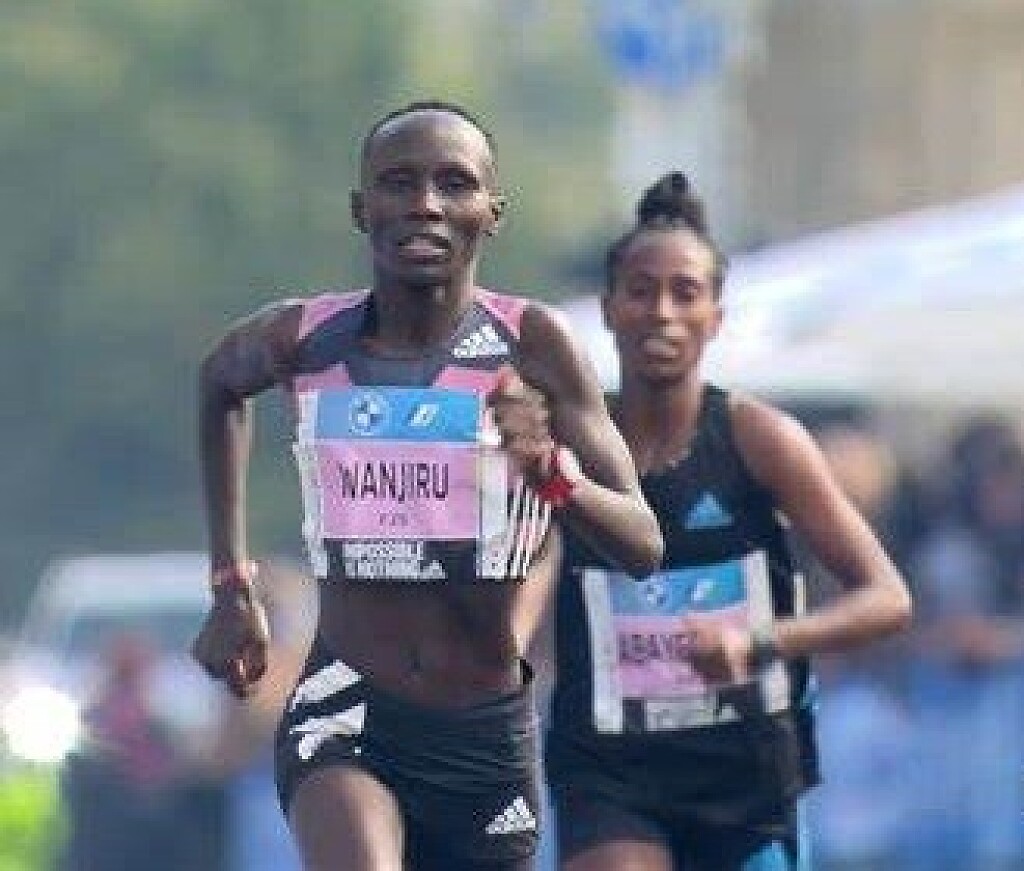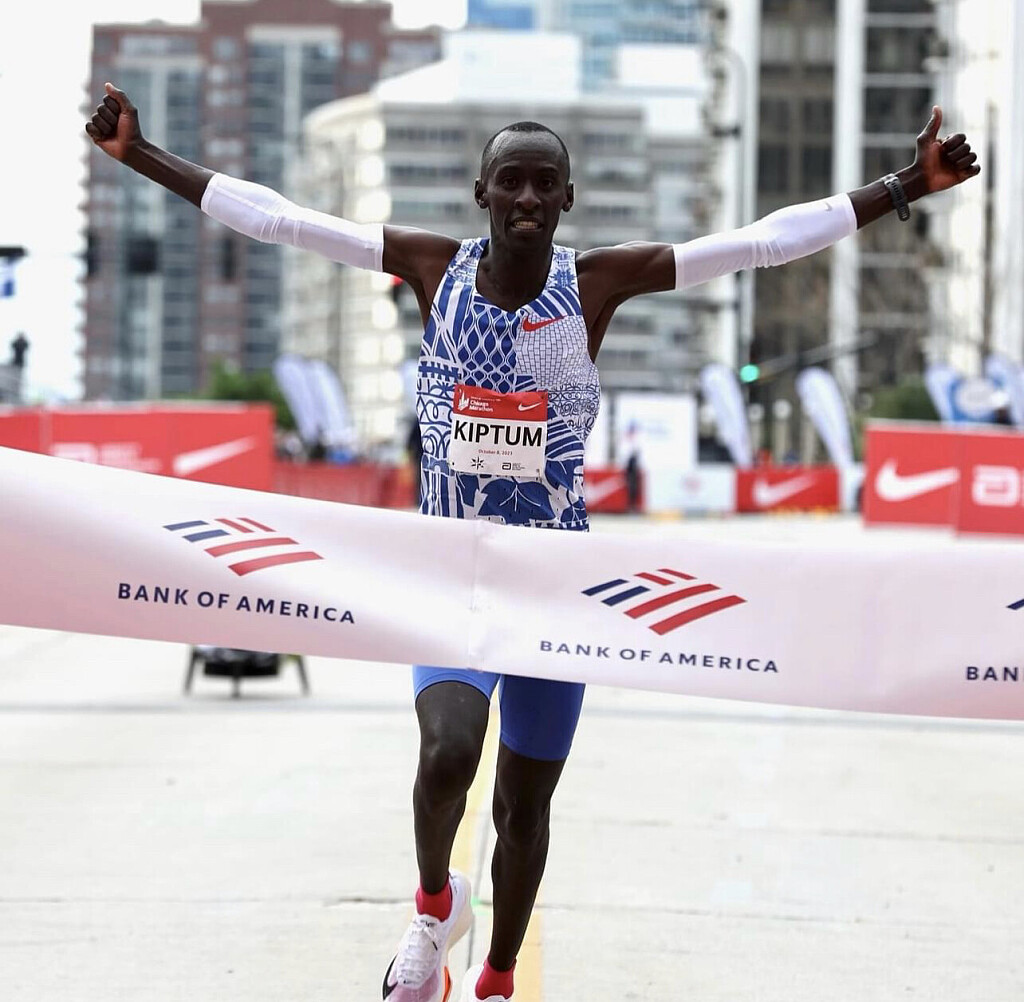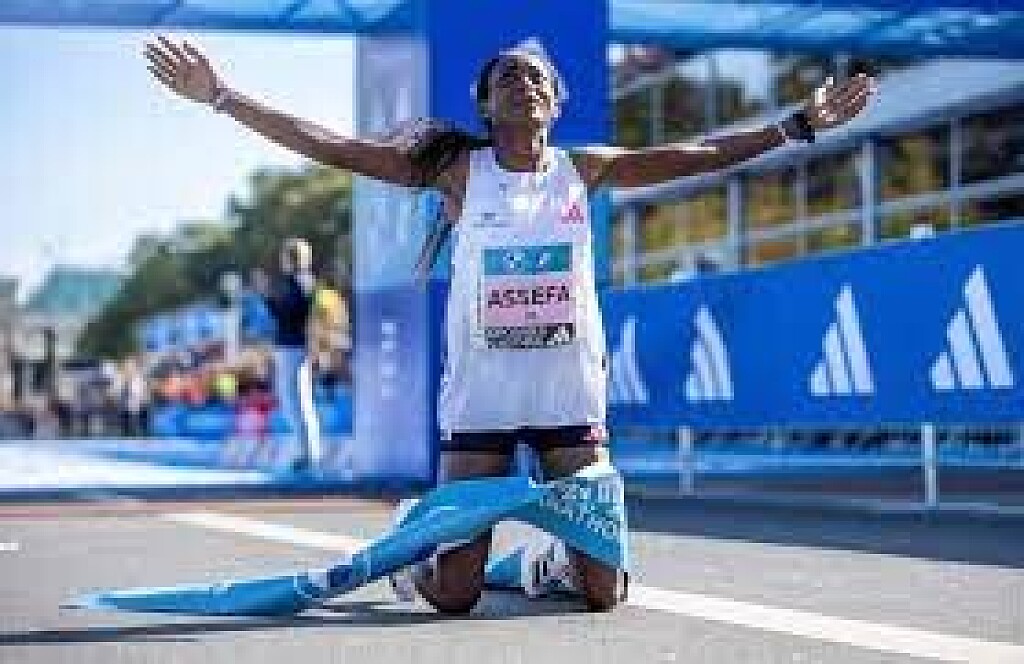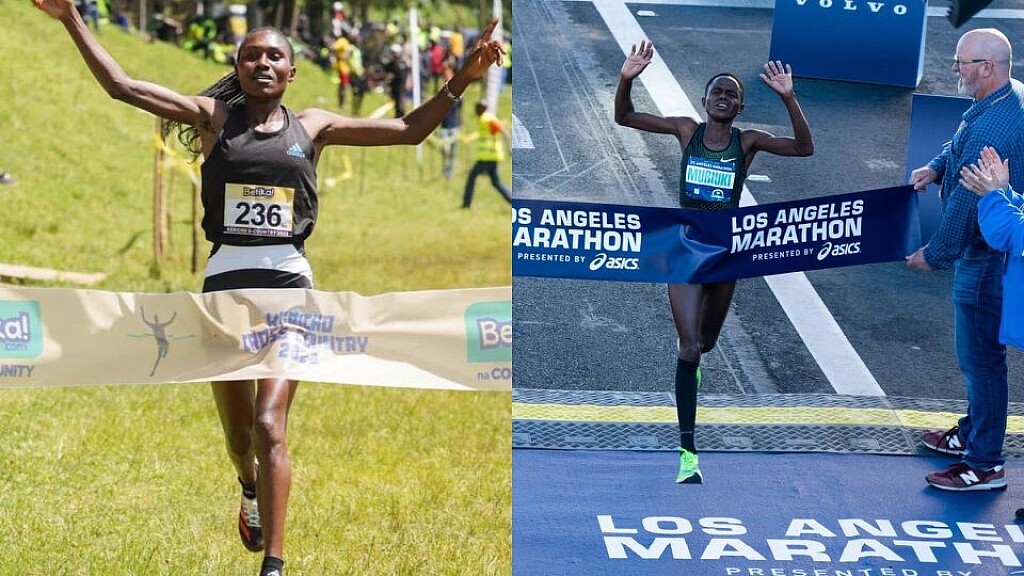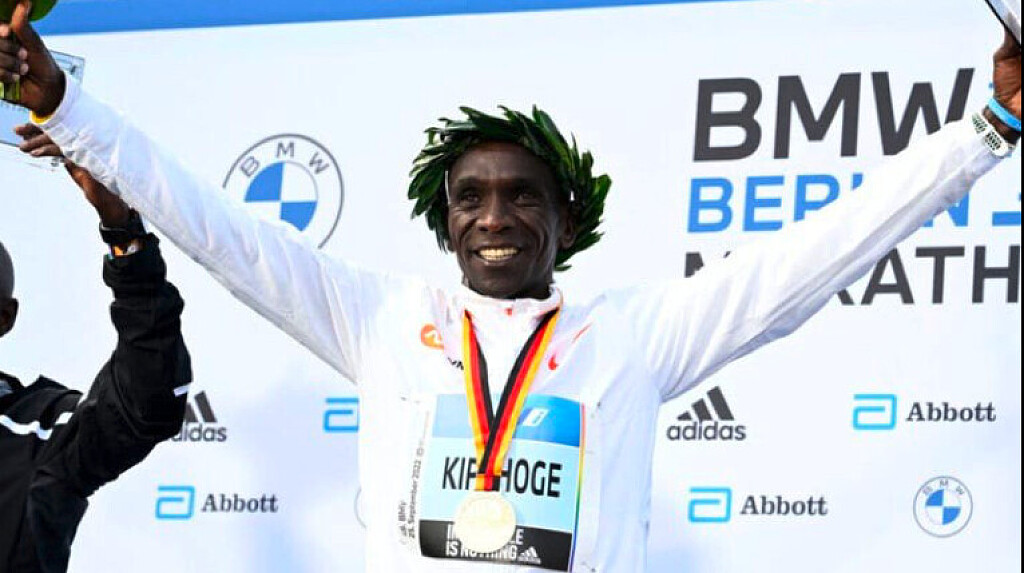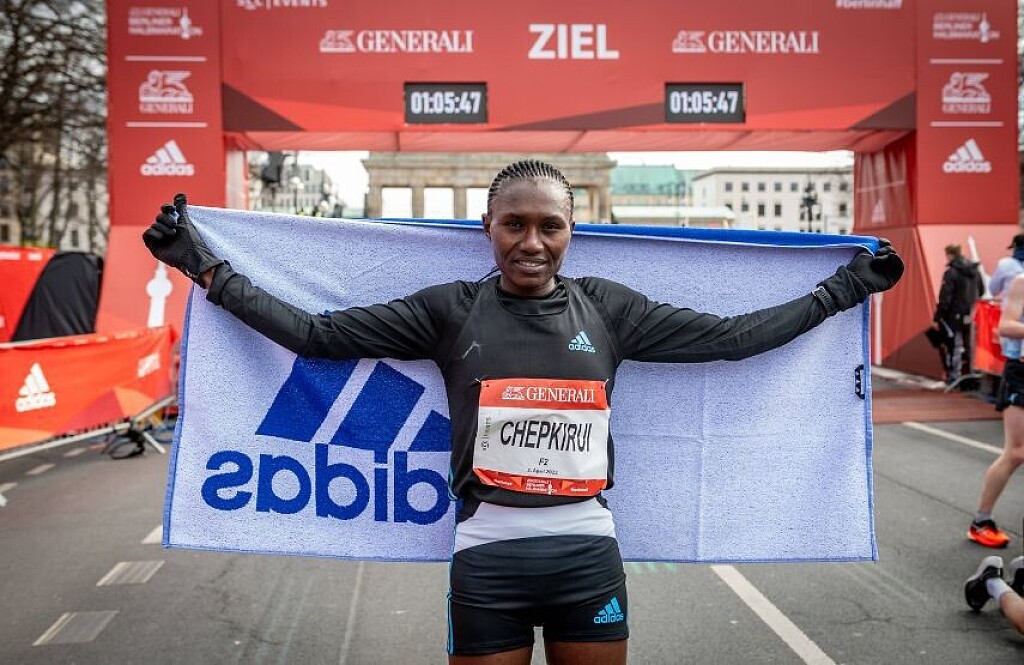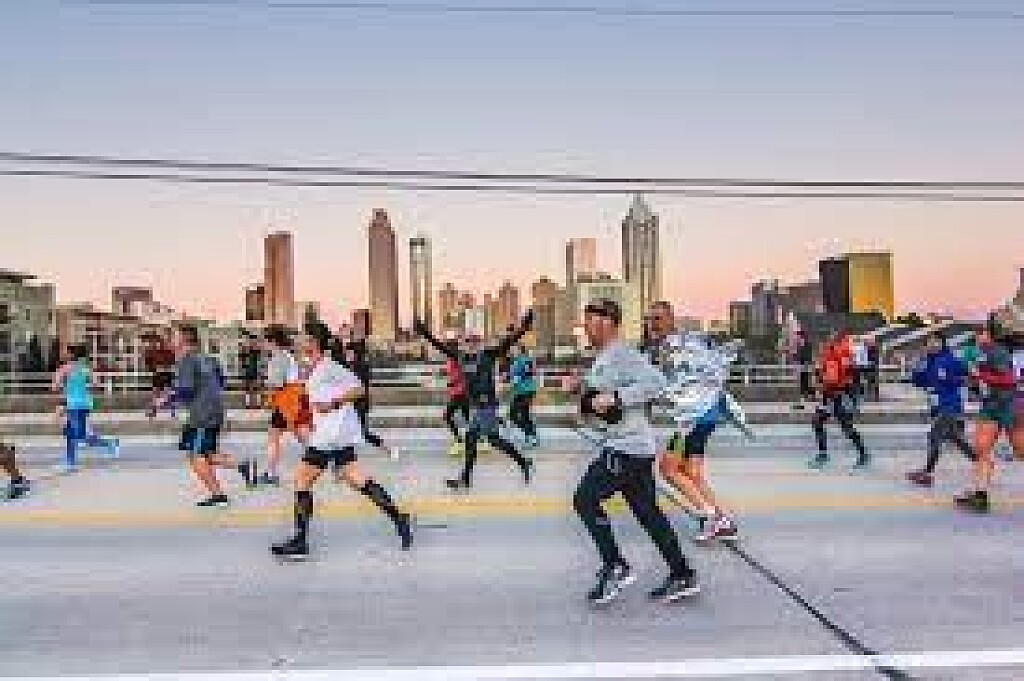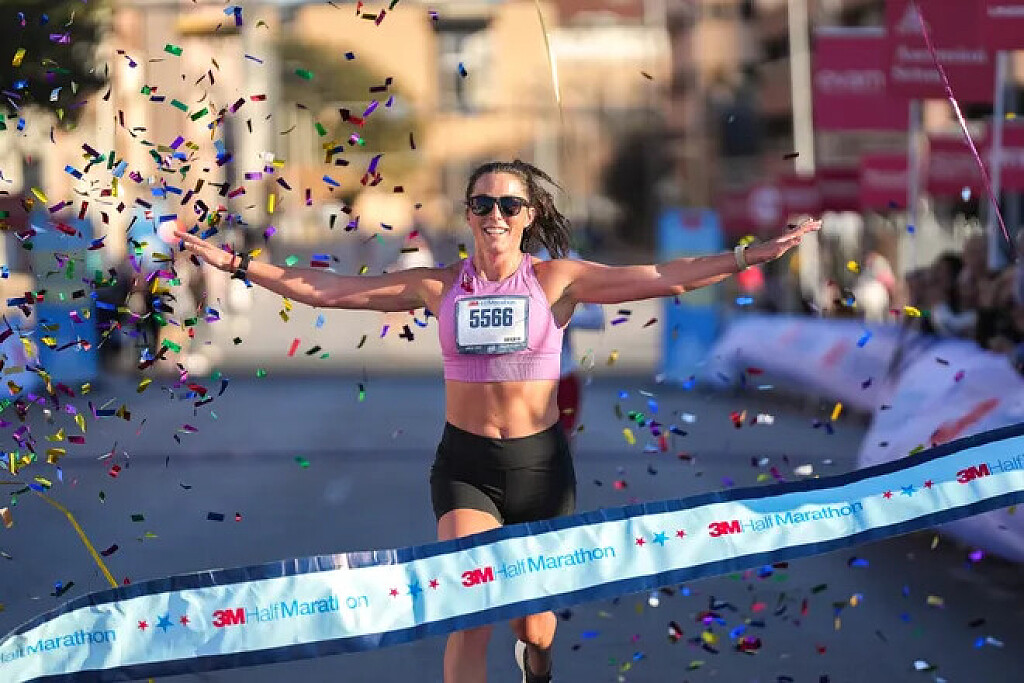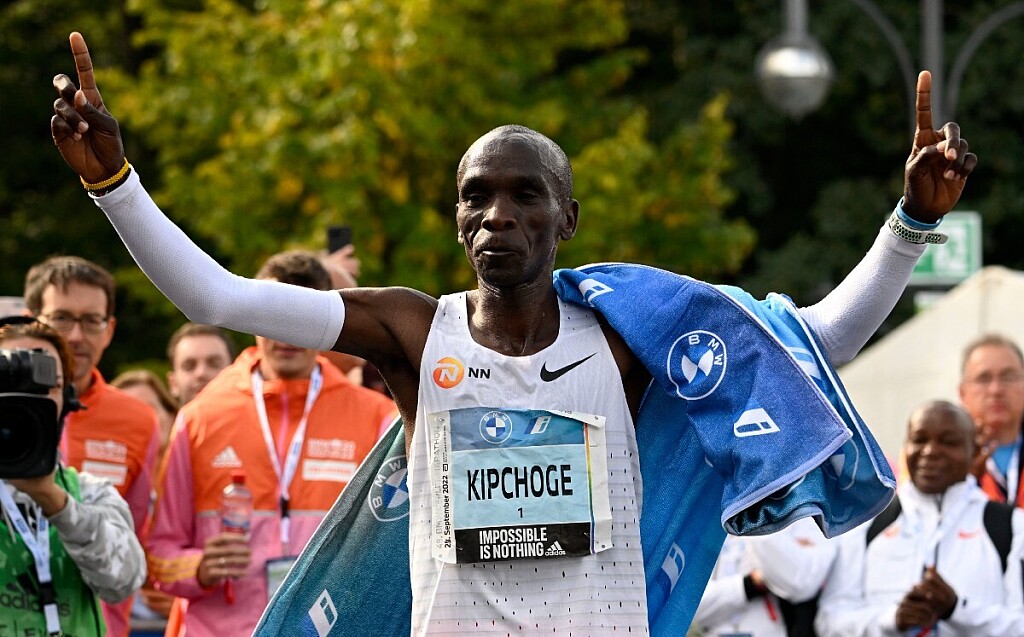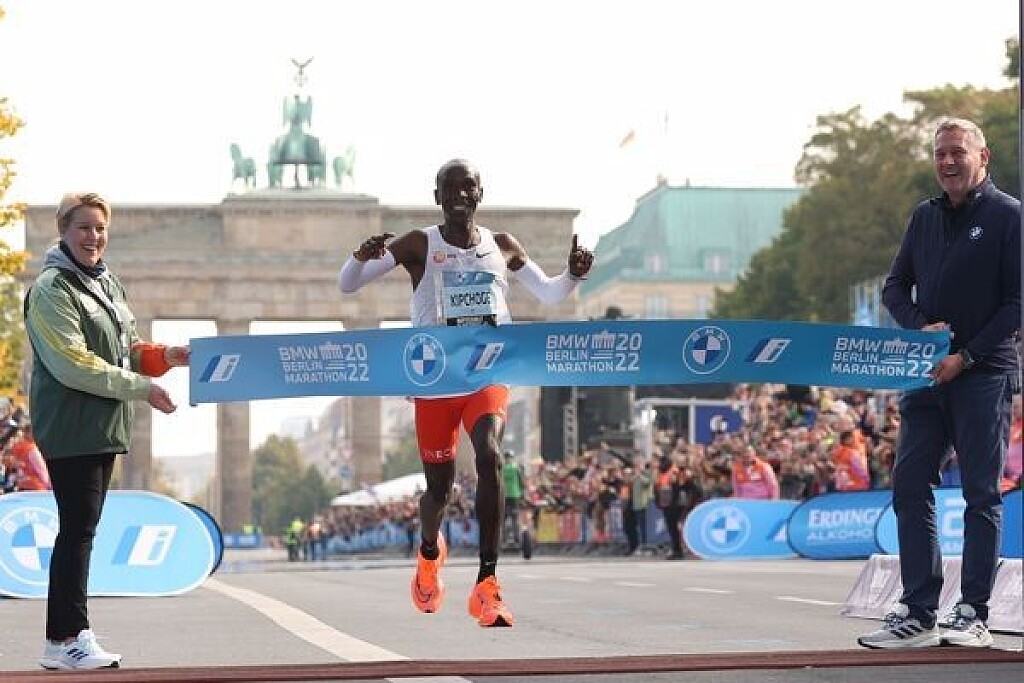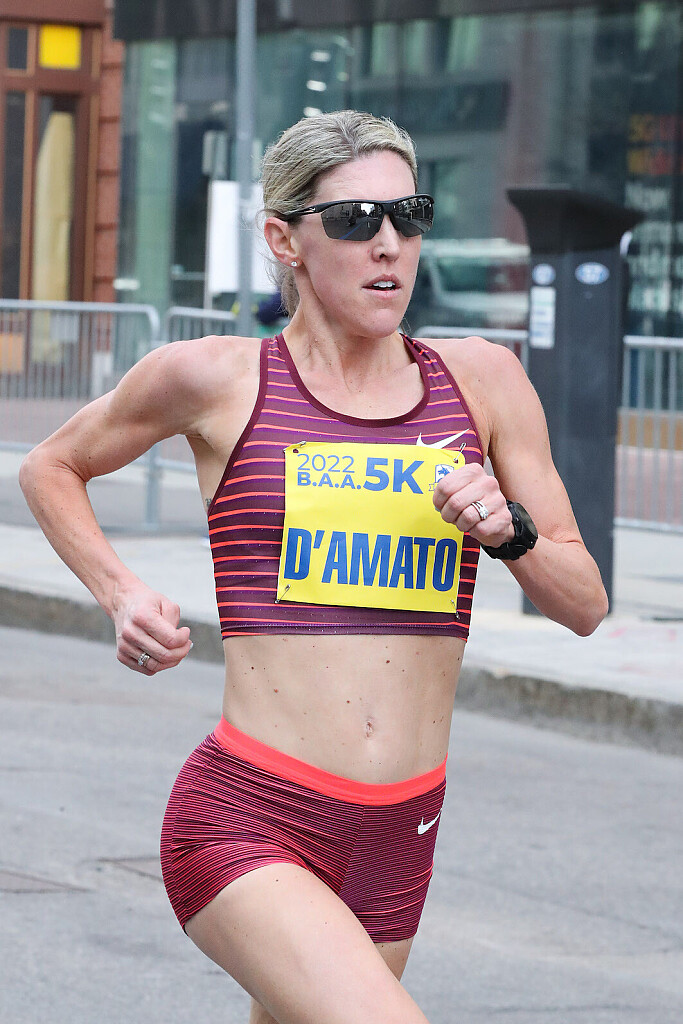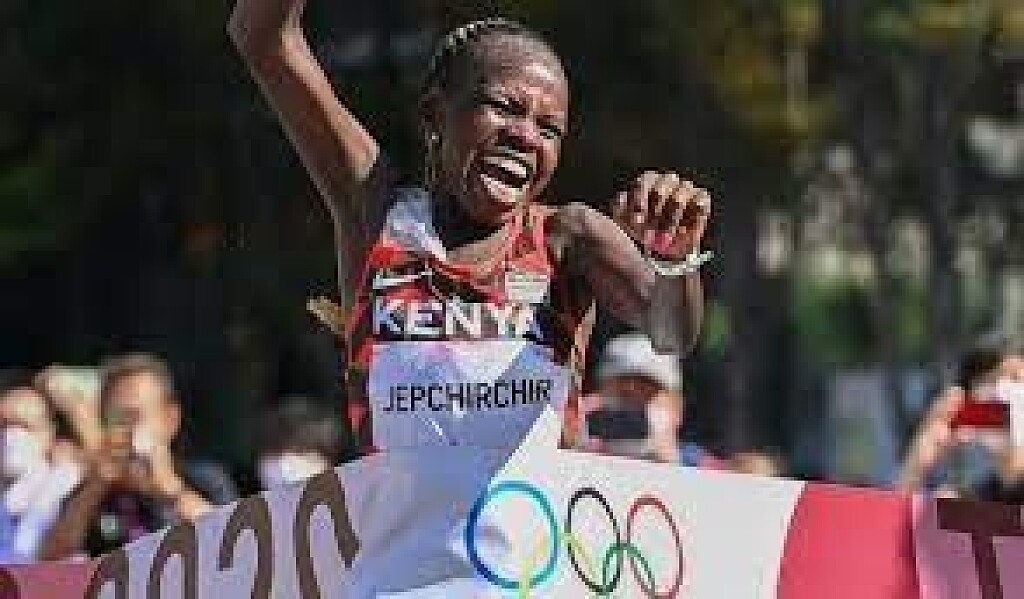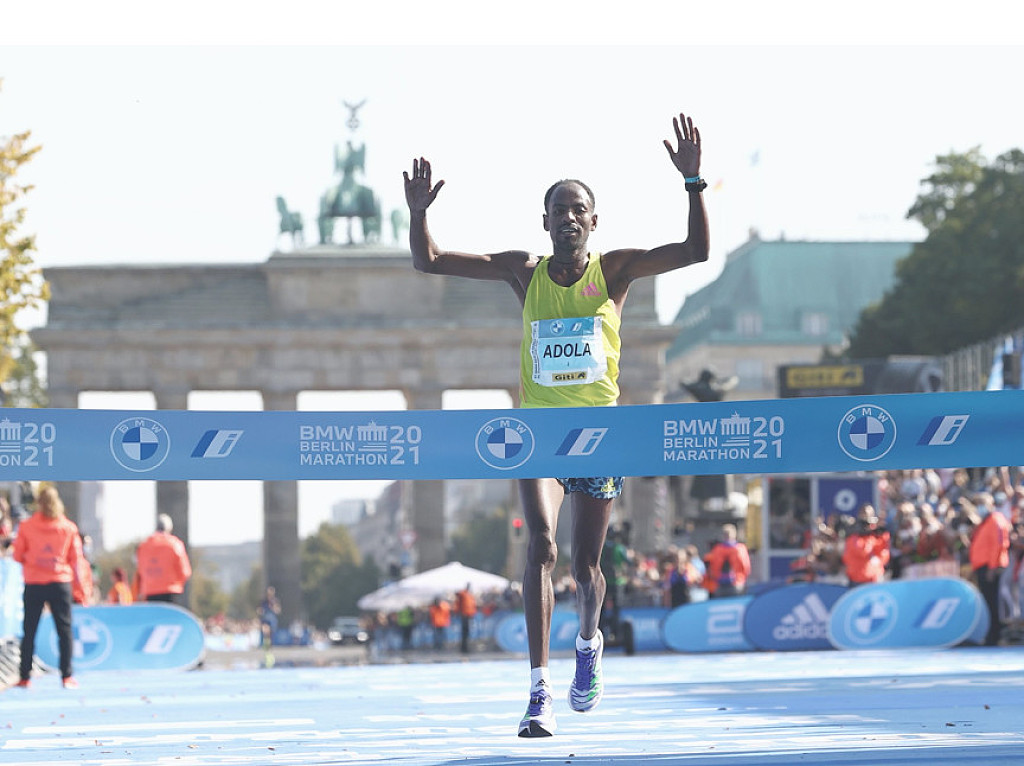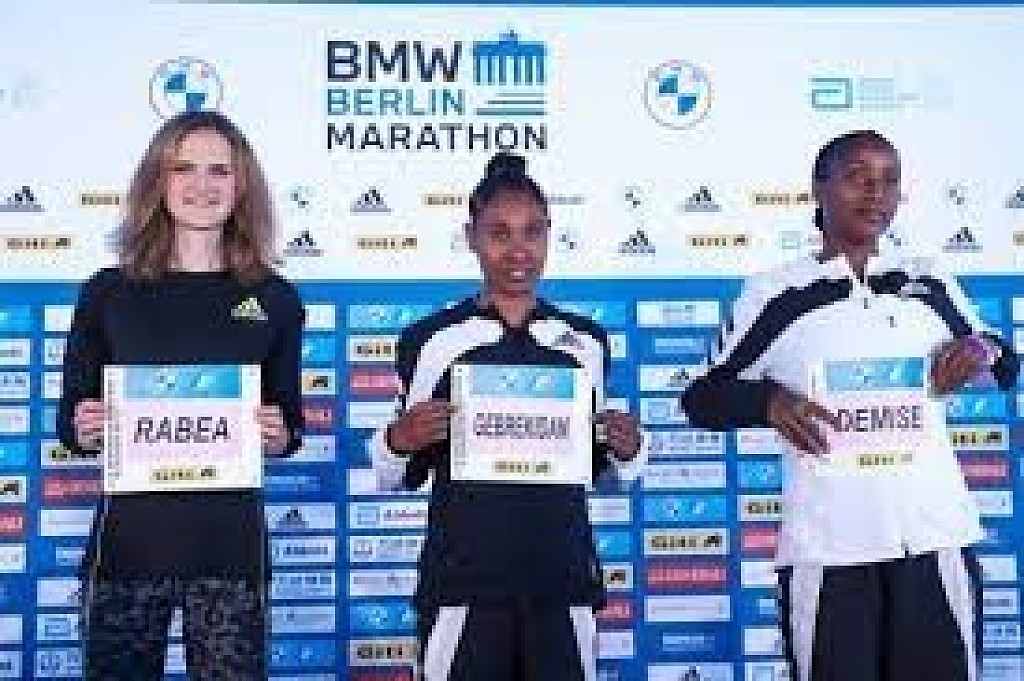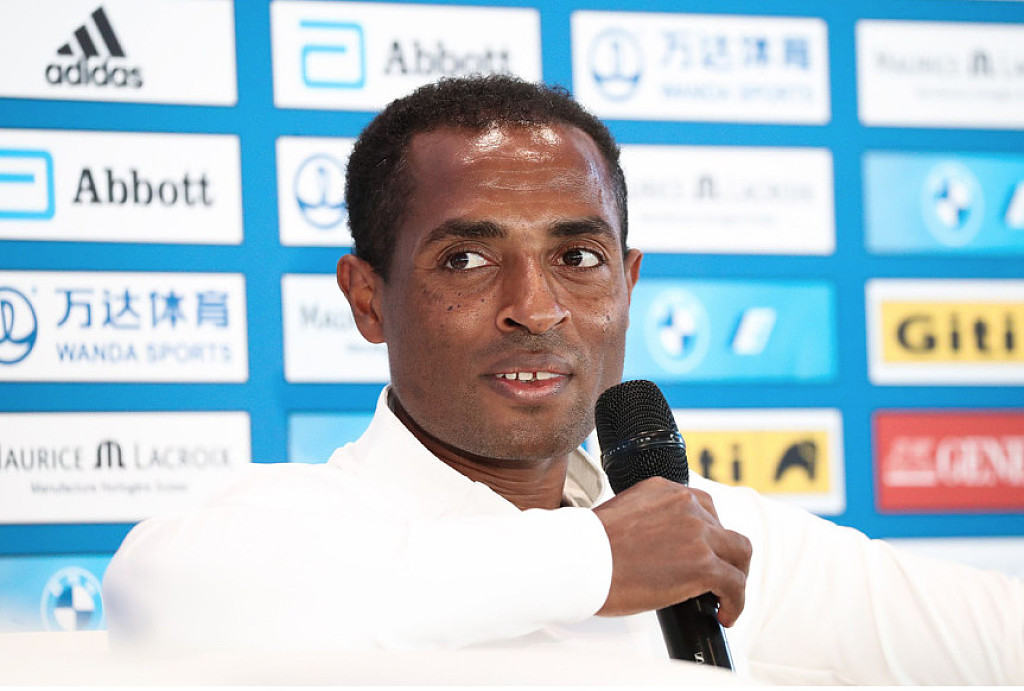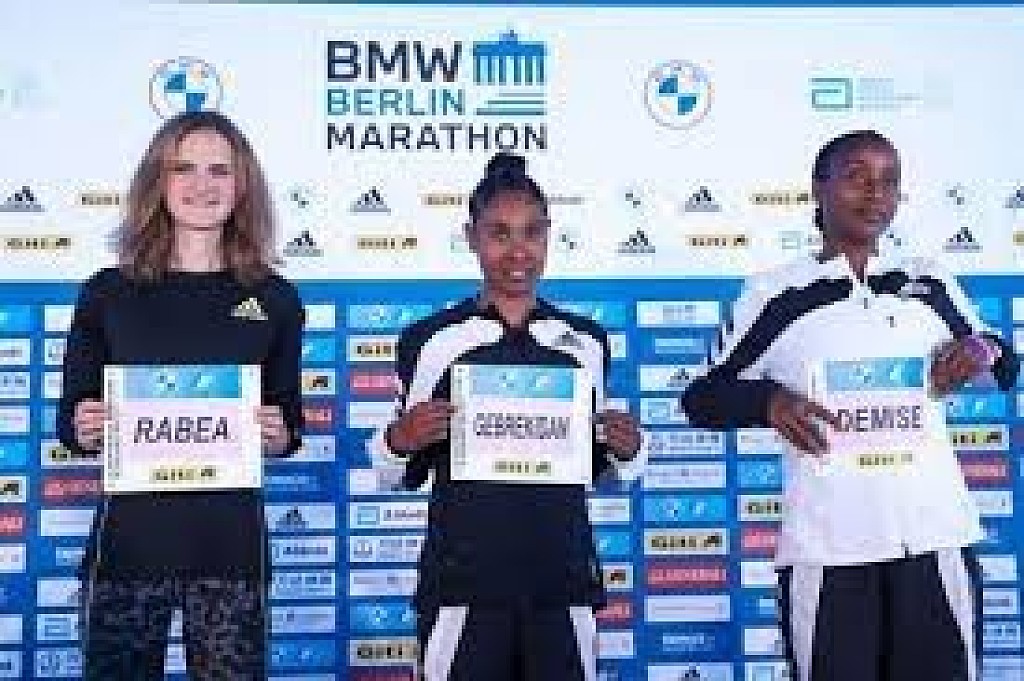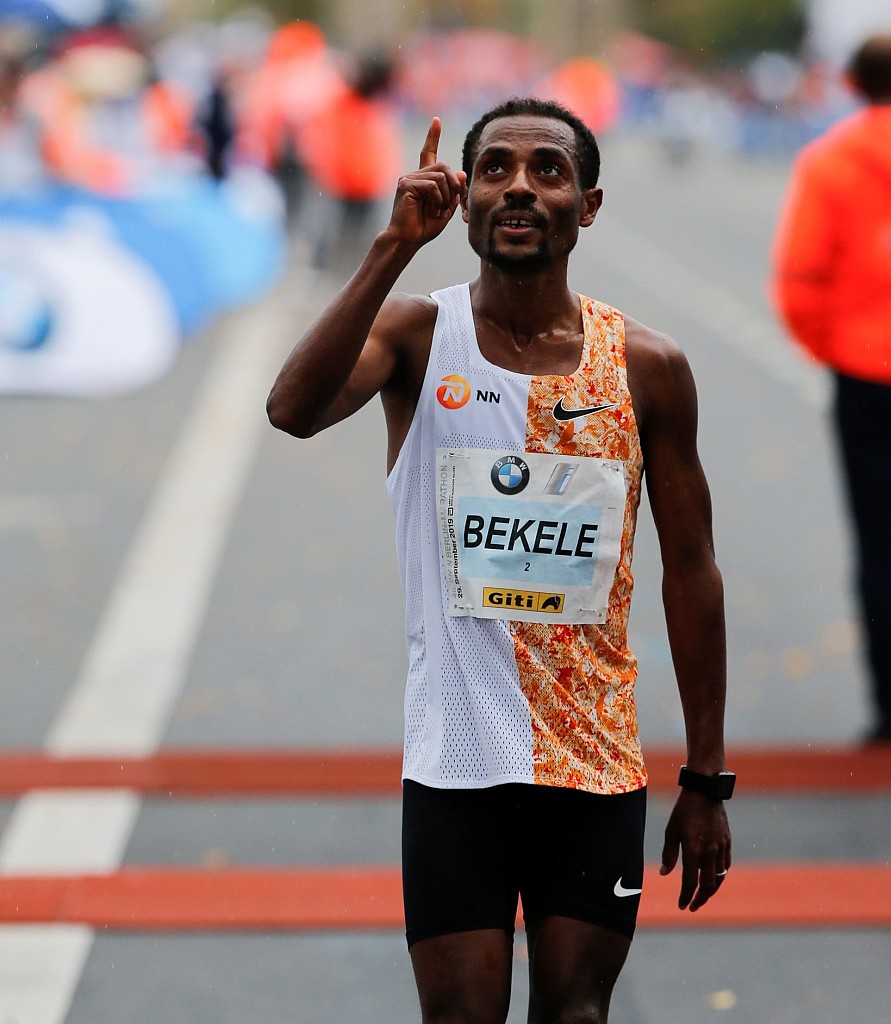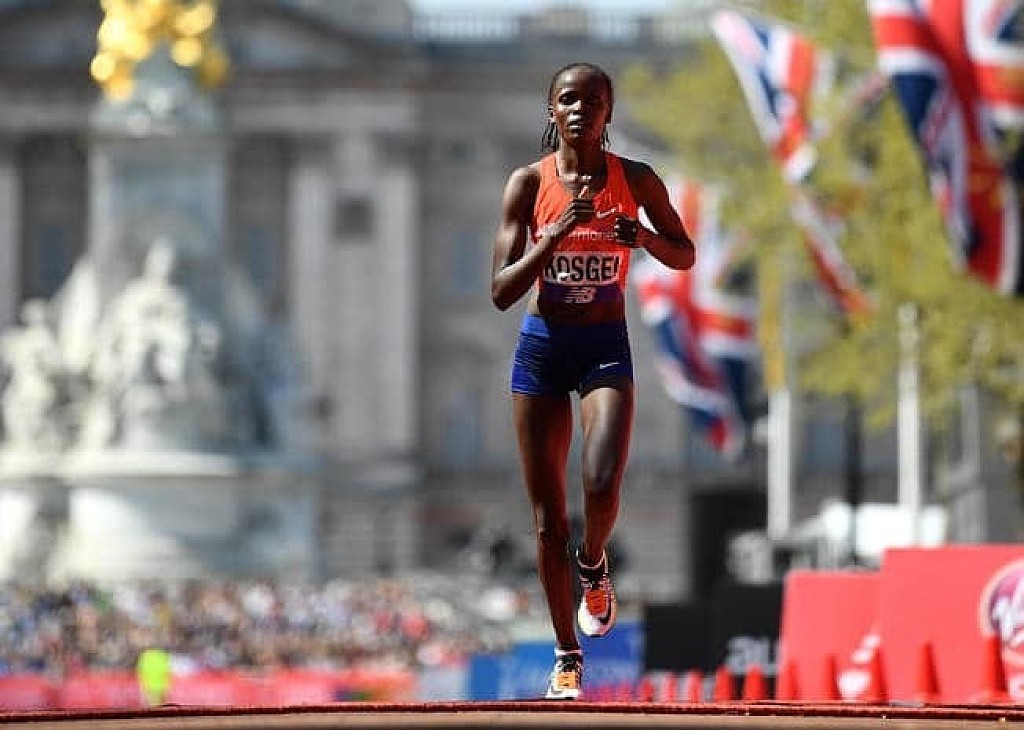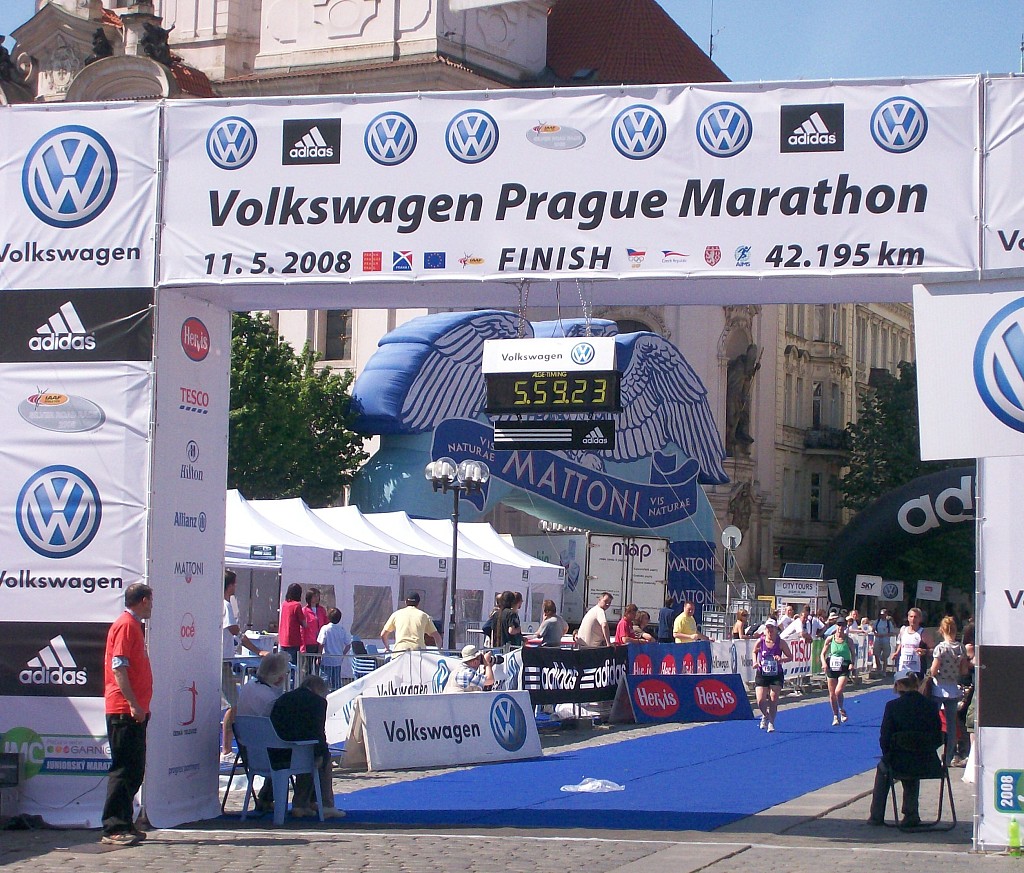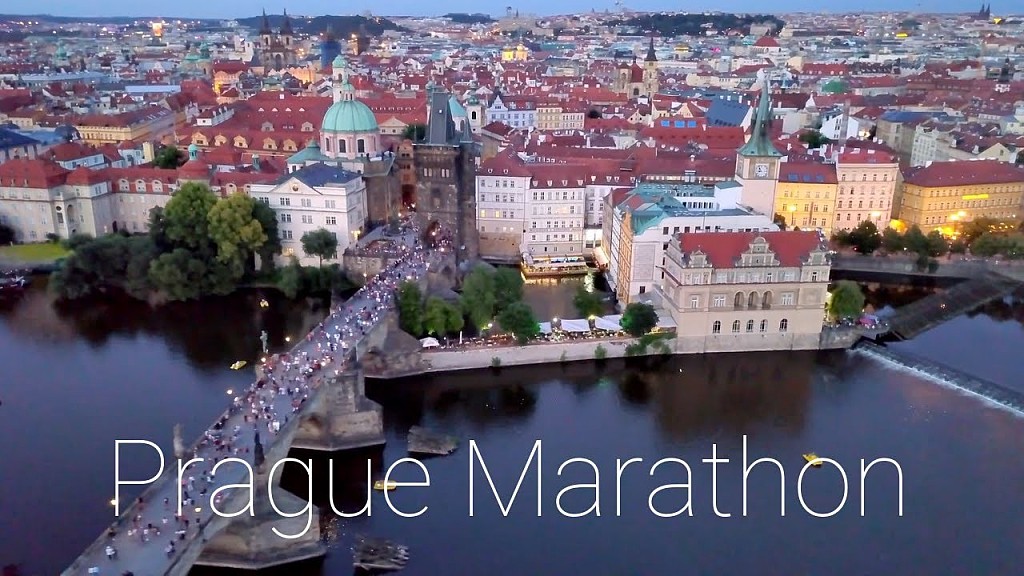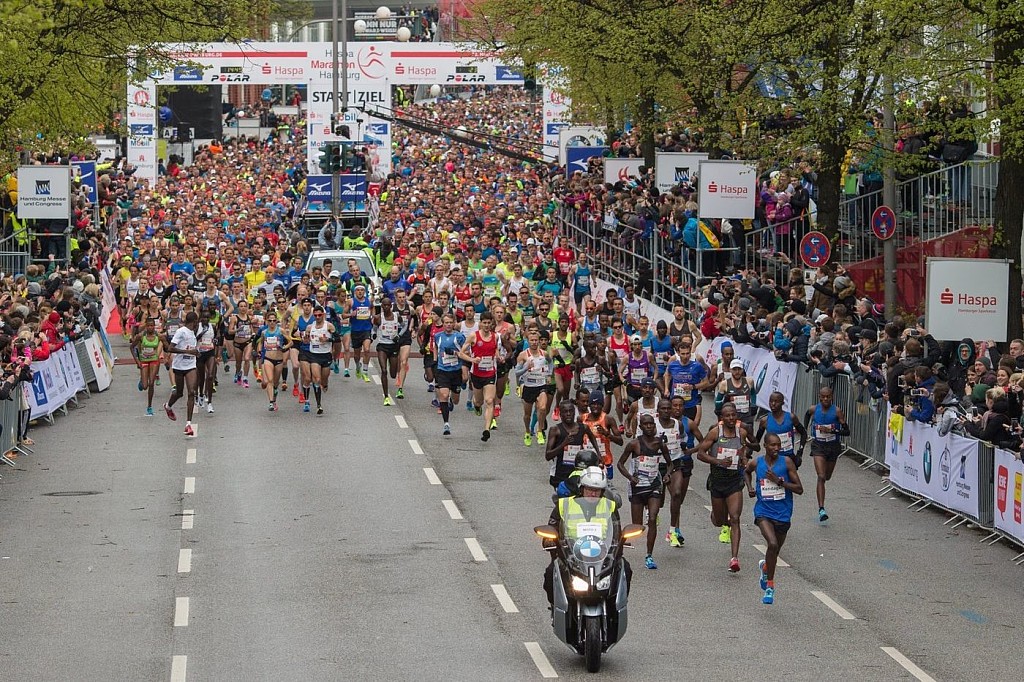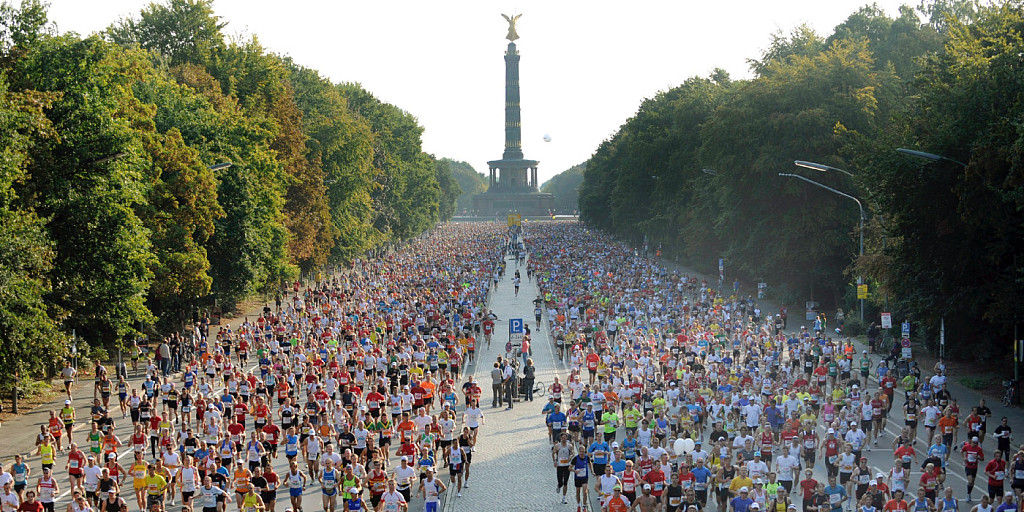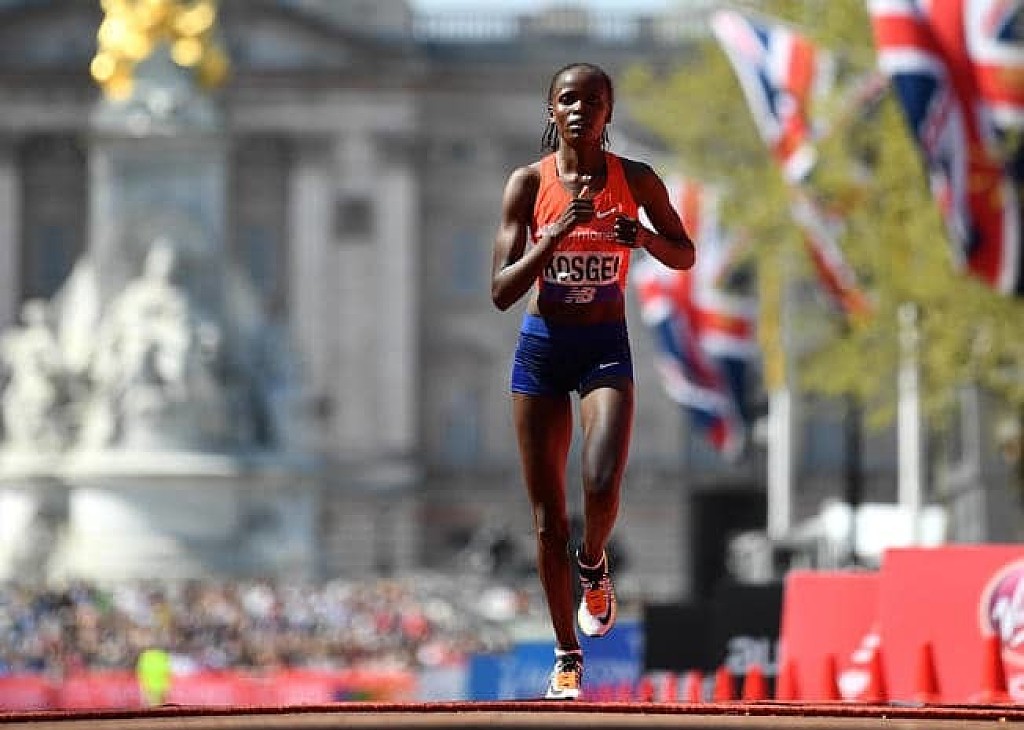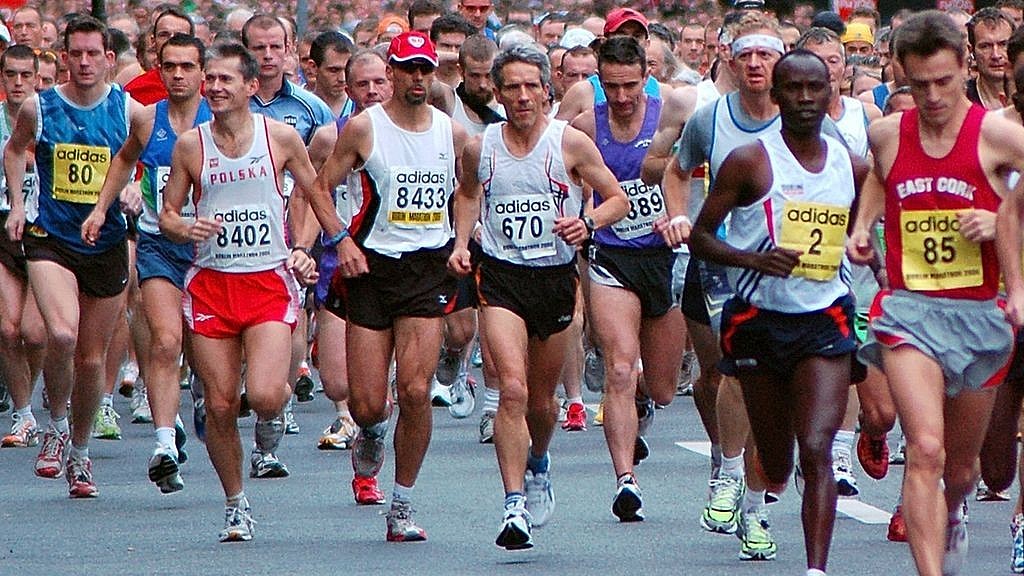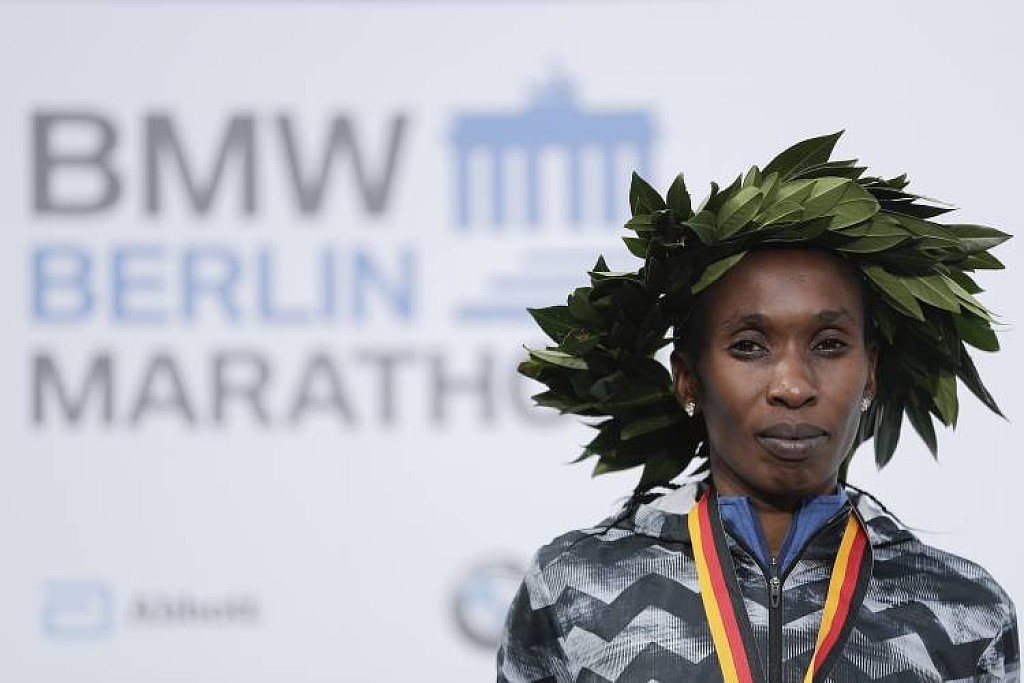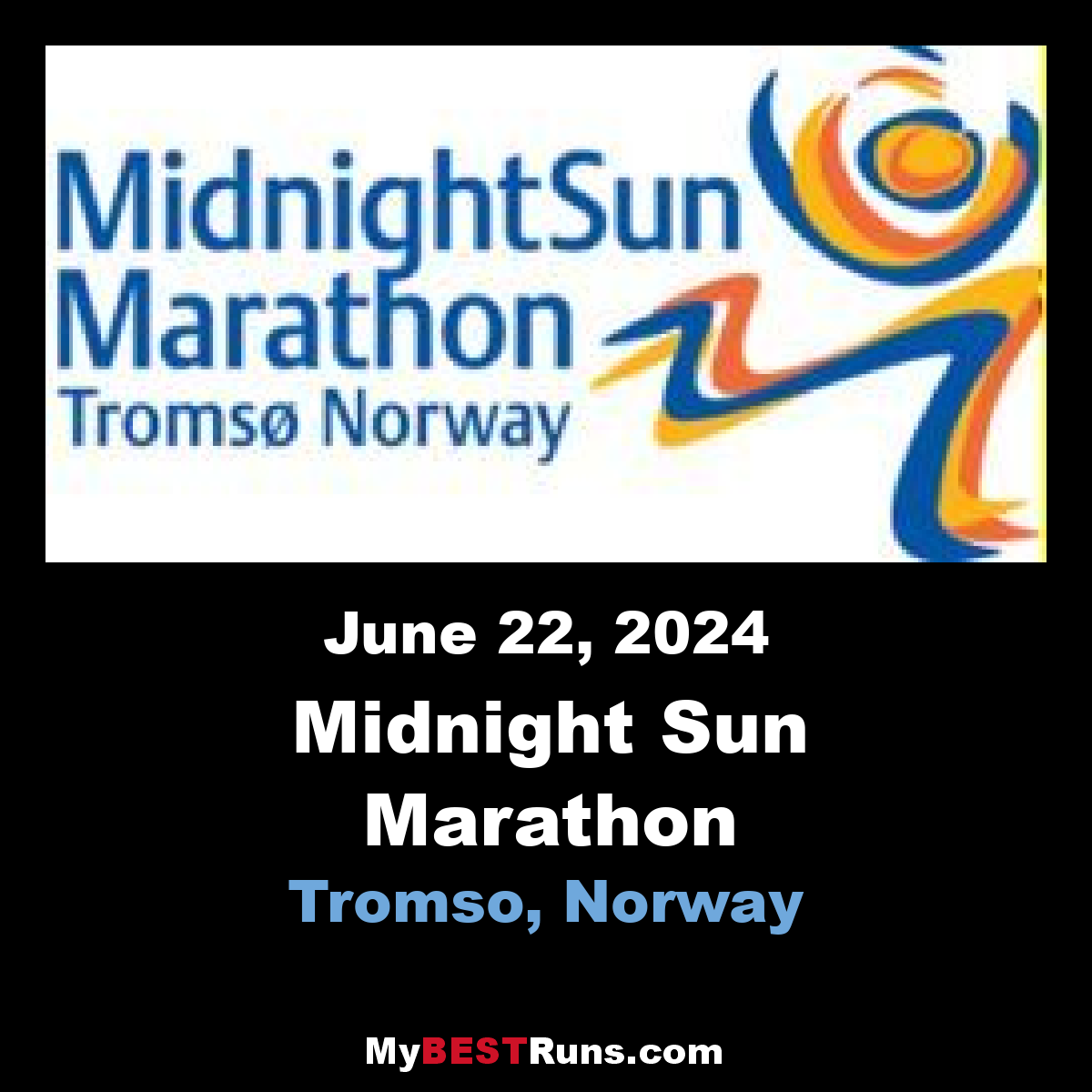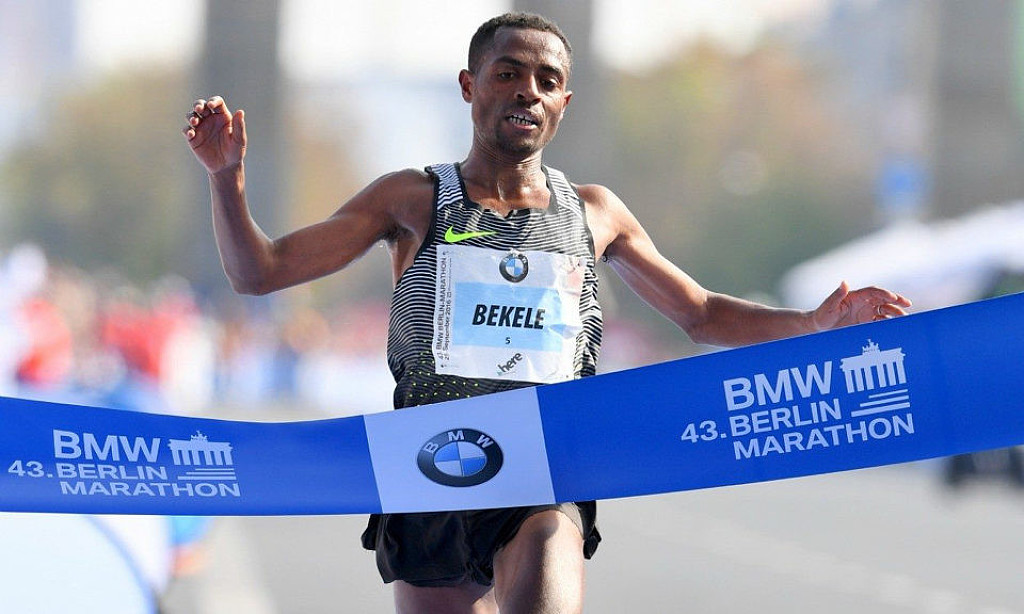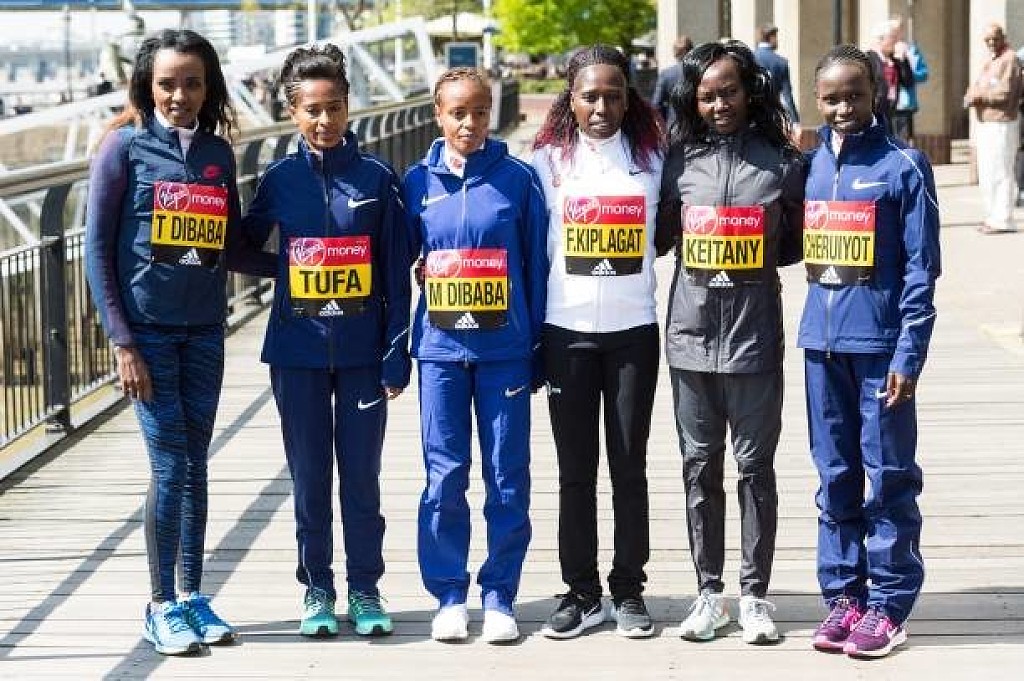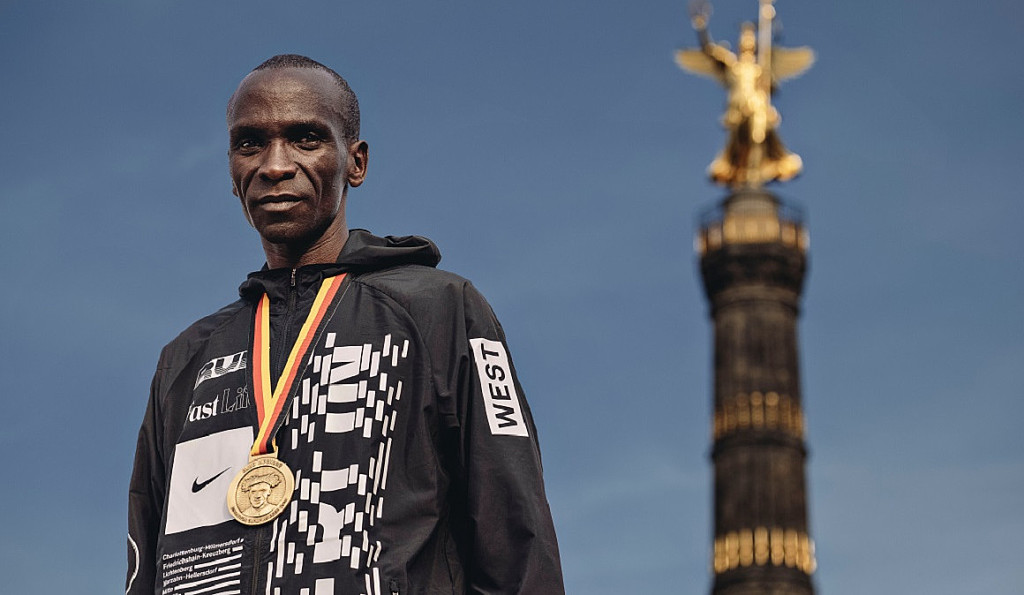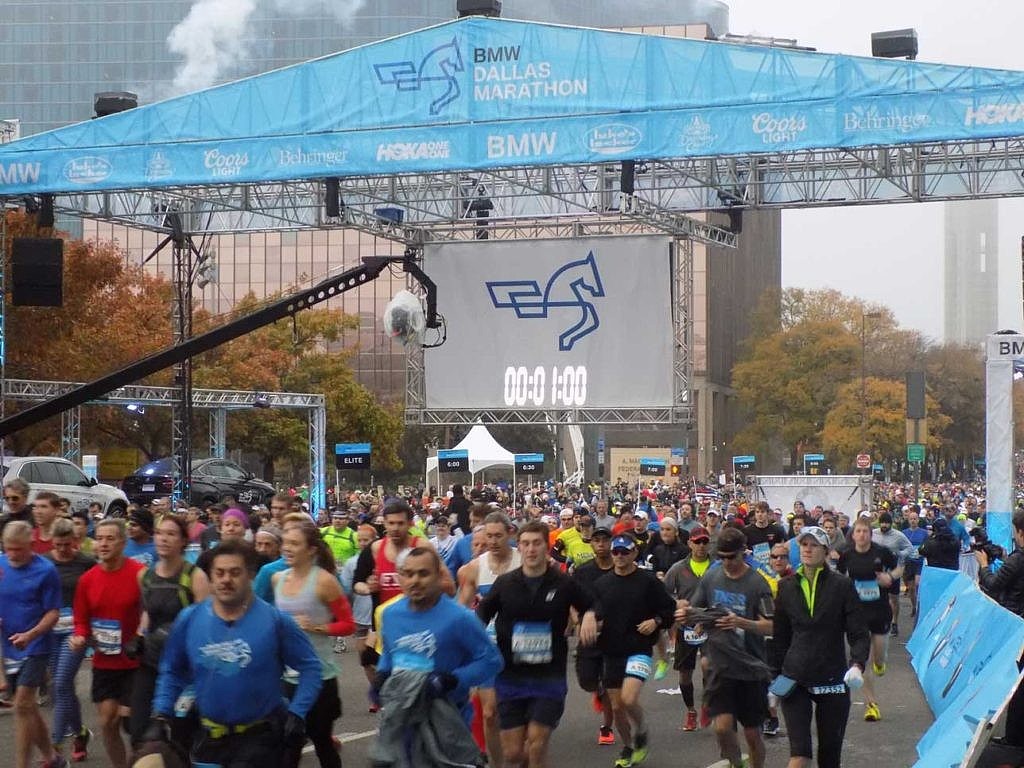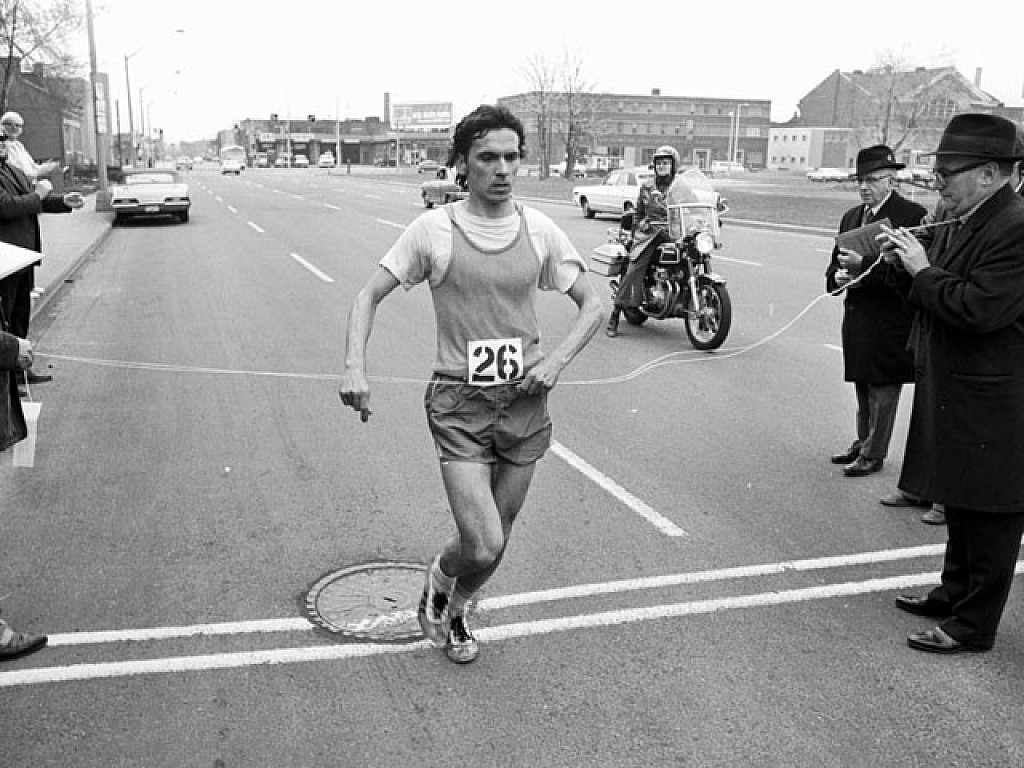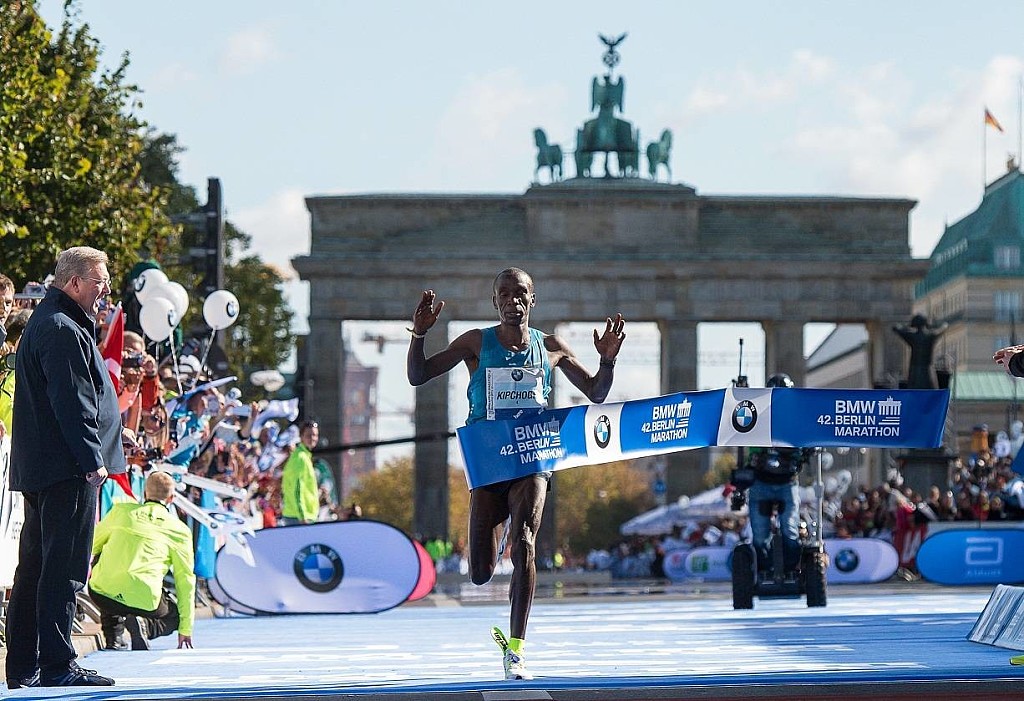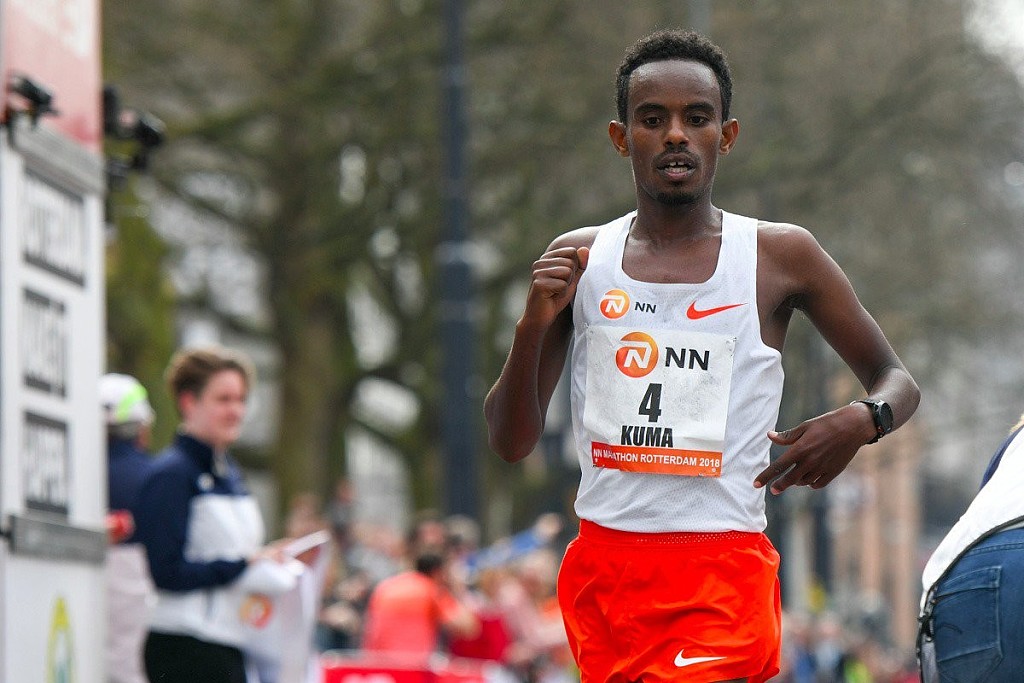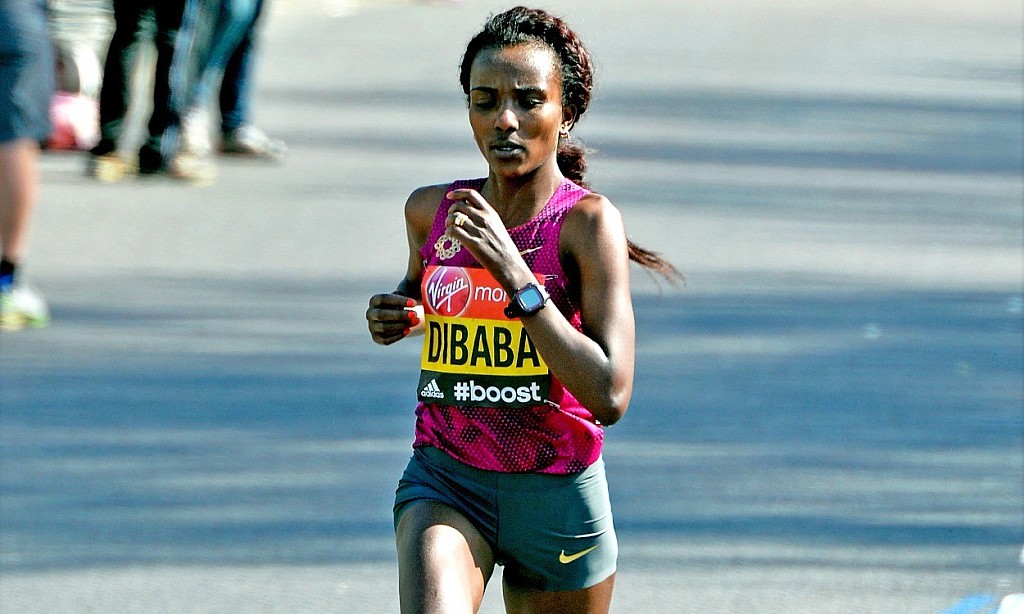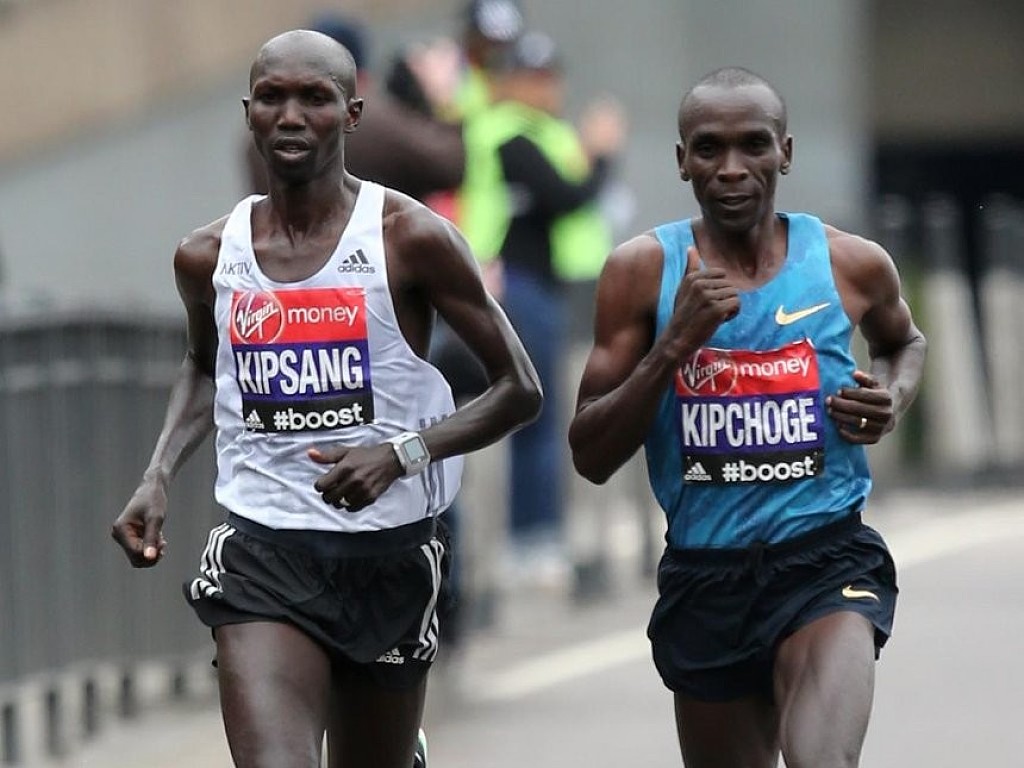Running News Daily
Running News Daily is edited by Bob Anderson. Send your news items to bob@mybestruns.com Advertising opportunities available. Train the Kenyan Way at KATA Kenya and Portugal owned and operated by Bob Anderson. Be sure to catch our movie A Long Run the movie KATA Running Camps and KATA Potato Farms - 31 now open in Kenya! https://kata.ke/
Index to Daily Posts · Sign Up For Updates · Run The World Feed
Articles tagged #BMW Berlin Marathon
Today's Running News
Sawe and Wanjiru Lead Record-Setting Fields at Berlin Marathon
A world-class lineup is set for the 51st edition of the BMW Berlin Marathon on September 21. Kenyans Sabastian Sawe and Rosemary Wanjiru headline the fields with personal bests of 2:02:05 and 2:16:14, respectively, making them clear favorites. Yet the men’s race also includes defending champion Milkesa Mengesha of Ethiopia, who clocked his 2:03:17 PB on this course last year.
The men’s start list features 10 athletes with personal bests under 2:05, while six women have already broken 2:19. By the numbers, it is the strongest PO Berlin lineup in history. The flat and fast course has been the stage for 13 world records over the past five decades, and another swift contest seems inevitable.
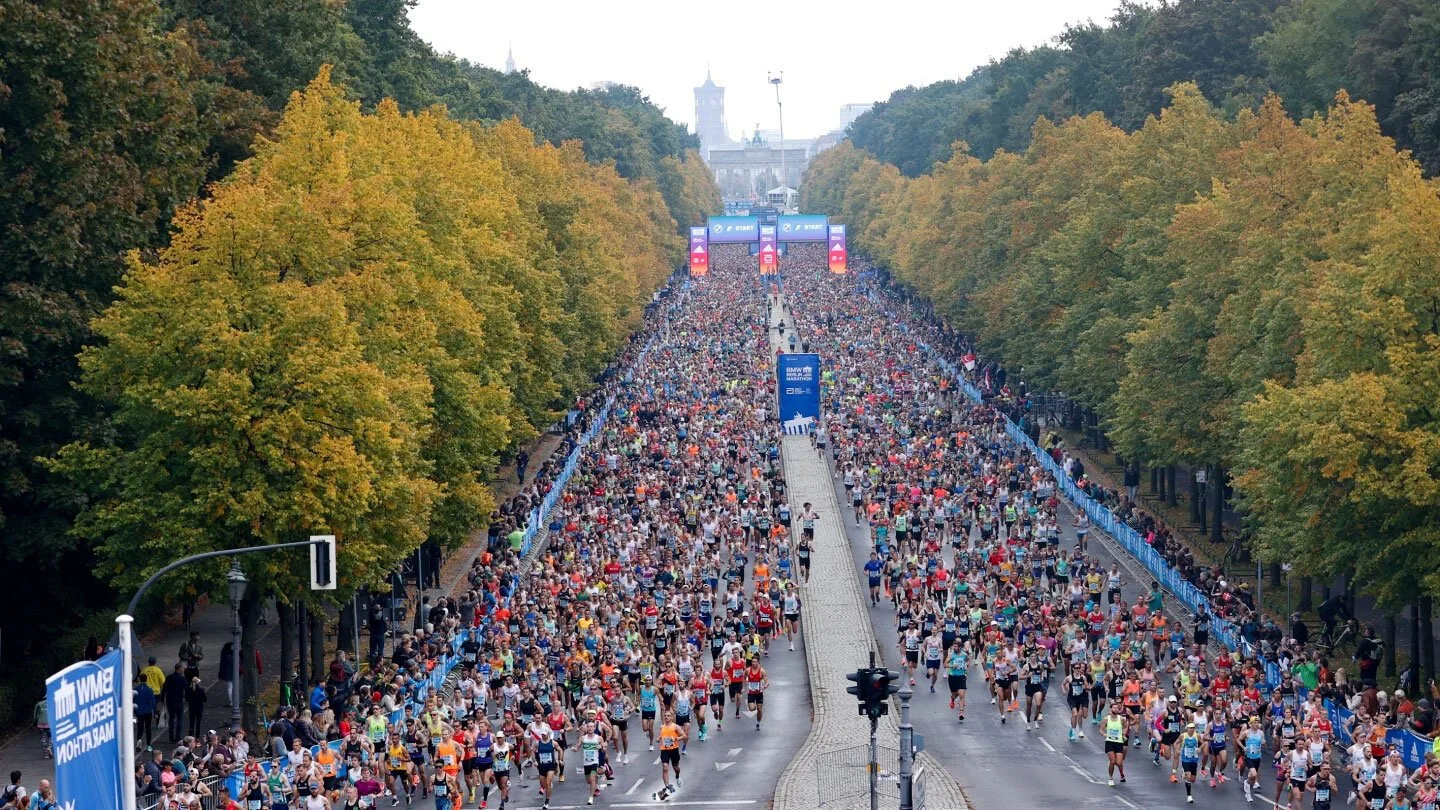
Organizers also achieved something remarkable: both Japanese marathon record holders will compete. Kengo Suzuki holds the men’s national record at 2:04:56, while Honami Maeda is the fastest Japanese woman of all time with her 2:18:59 mark. For the first time in at least 25 years, a city marathon outside Japan has managed to bring together both record holders, underscoring Berlin’s global prestige in long-distance running.
Selected Top Entries
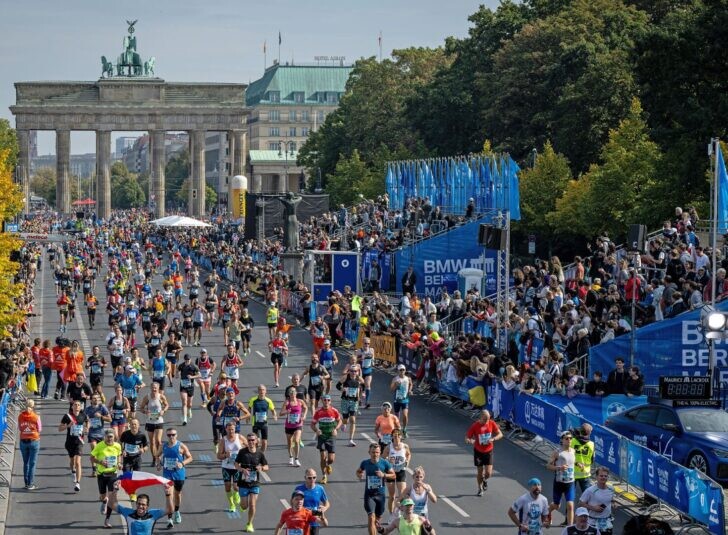
Men
• Sabastian Sawe (KEN) – 2:02:05, Valencia 2024
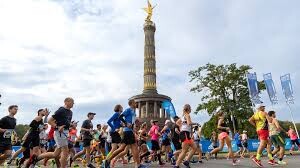
• Gabriel Geay (TAN) – 2:03:00, Valencia 2022
• Milkesa Mengesha (ETH) – 2:03:17, Berlin 2024
• Haymanot Alew (ETH) – 2:03:31, Berlin 2024
• Guye Adola (ETH) – 2:03:46, Berlin 2017
• Daniel Mateiko (KEN) – 2:04:24, Valencia 2024
• Kengo Suzuki (JPN) – 2:04:56, Otsu 2021
Women
• Rosemary Wanjiru (KEN) – 2:16:14, Tokyo 2024
• Degitu Azimeraw (ETH) – 2:17:58, London 2021
• Dera Dida (ETH) – 2:18:32, Dubai 2025
• Tigist Girma (ETH) – 2:18:52, Valencia 2022
• Honami Maeda (JPN) – 2:18:59, Osaka 2024
• Sharon Chelimo (KEN) – 2:19:33, Barcelona 2025
With such depth across both fields, the 2025 BMW Berlin Marathon is primed for fireworks—and perhaps even another historic performance on the sport’s fastest stage.
by Boris Baron
Login to leave a comment
BMW Berlin Marathon
The story of the BERLIN-MARATHON is a story of the development of road running. When the first BERLIN-MARATHON was started on 13th October 1974 on a minor road next to the stadium of the organisers‘ club SC Charlottenburg Berlin 286 athletes had entered. The first winners were runners from Berlin: Günter Hallas (2:44:53), who still runs the BERLIN-MARATHON today, and...
more...Men’s Elite Field Set for a Sizzling Showdown at the 2025 Berlin Marathon
Berlin, Germany – September 29, 2025 (Race Day)
With its flat, fast course and history of record-breaking performances, the BMW Berlin Marathon has become a magnet for the world’s best distance runners—and this year is no exception.
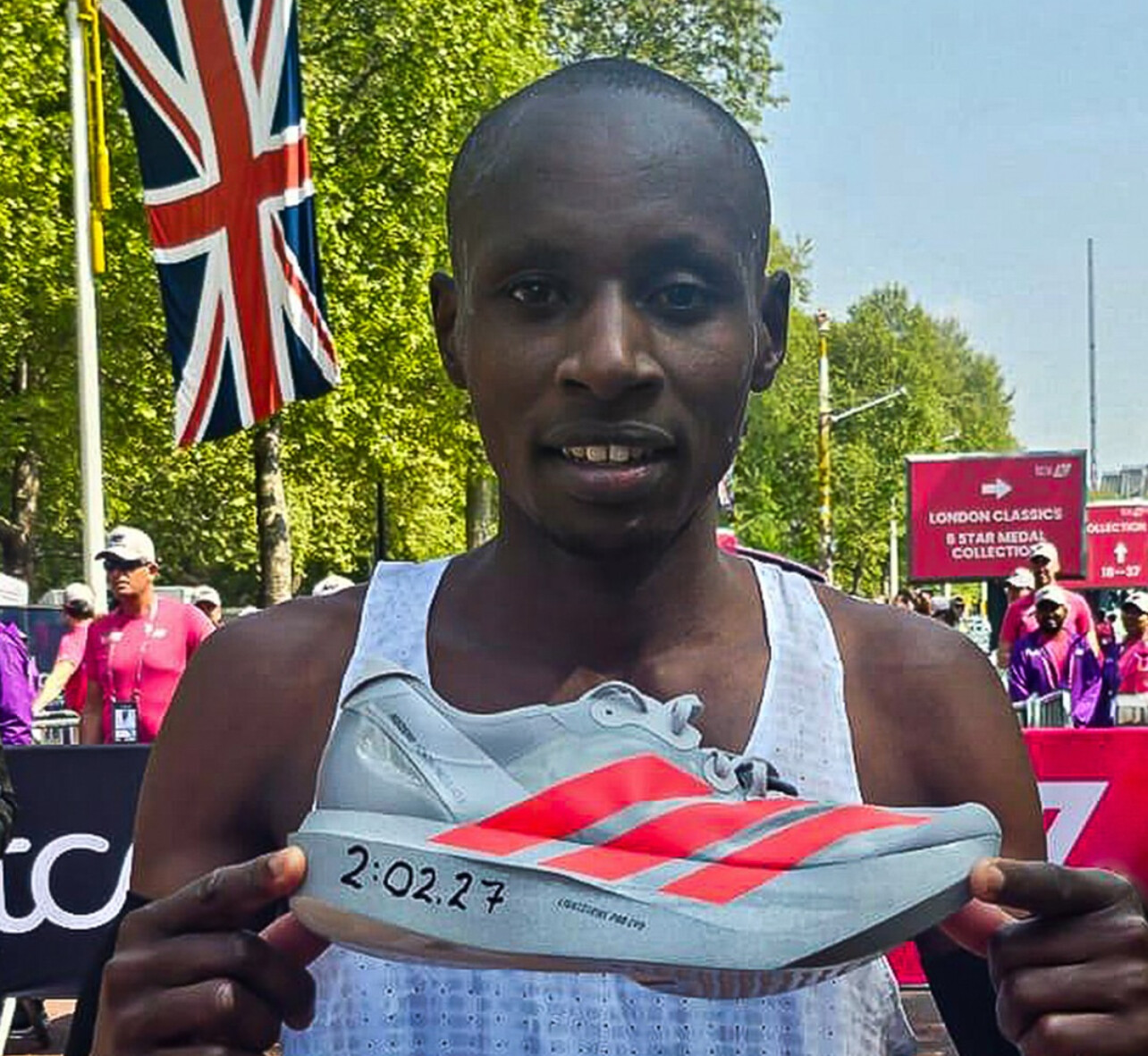
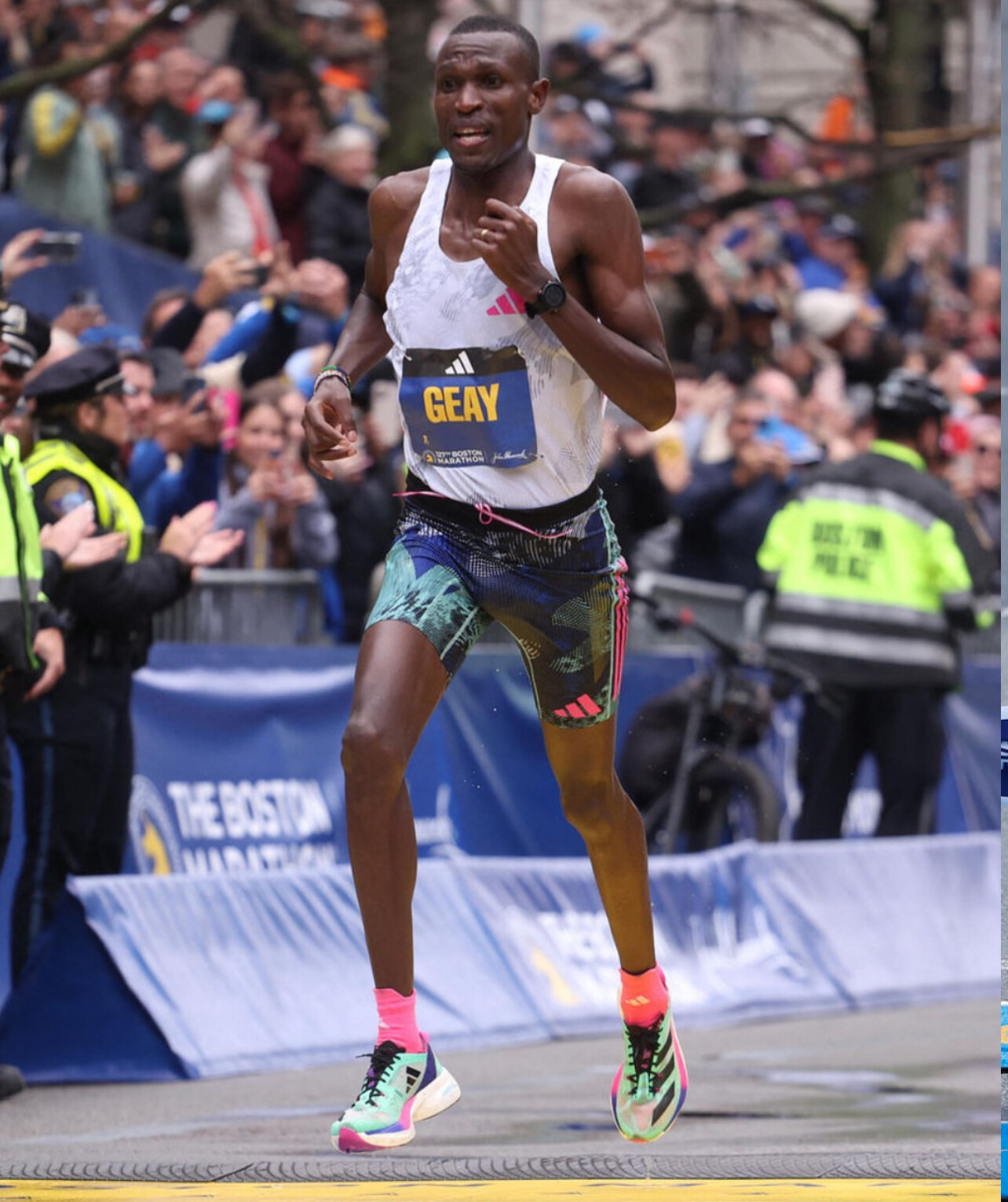
The 2025 men’s elite field is stacked with sub-2:05 talent from Kenya, Ethiopia, Tanzania, and Japan, including several proven champions and emerging stars. On September 29, all eyes will be on Berlin to see if the next marathon milestone can be broken.
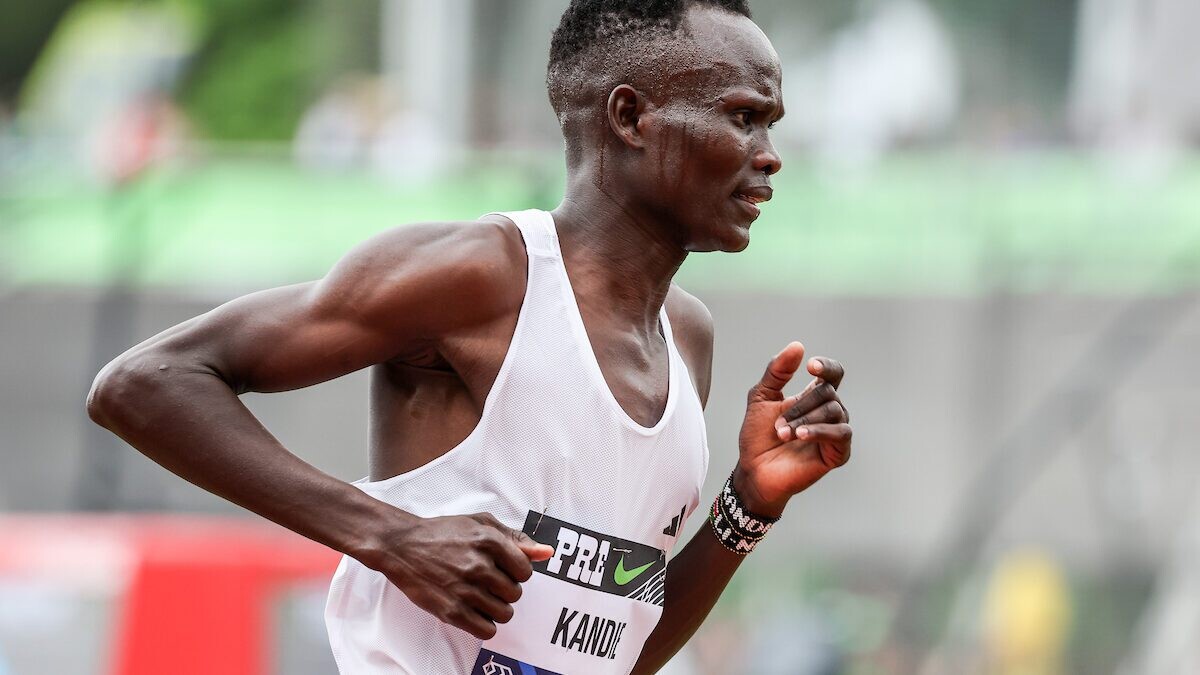
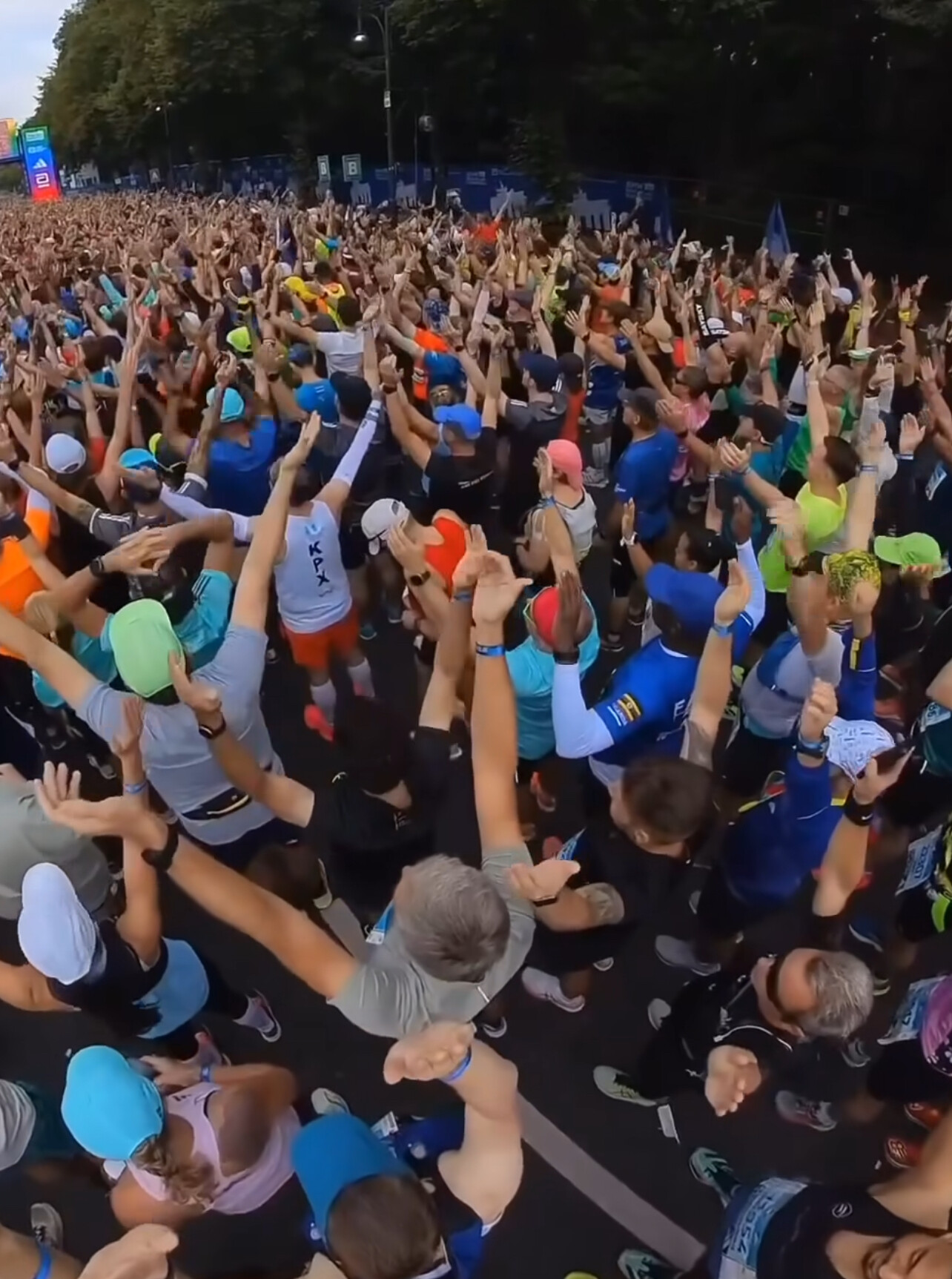
Top Contenders and Their Personal Bests
|
Name |
Country |
Personal Best |
|
Sabastian Sawe |
KEN |
2:02:05 |
|
Gabriel Gerald Geay |
TAN |
2:03:00 |
|
Milkesa Mengesha |
ETH |
2:03:17 |
|
Haymanot Alew |
ETH |
2:03:31 |
|
Guye Adola |
ETH |
2:03:46 |
|
Leul Gebresilase |
ETH |
2:04:02 |
|
Tesfaye Deriba |
ETH |
2:04:13 |
|
Daniel Mateiko |
KEN |
2:04:24 |
|
Haftu Teklu |
ETH |
2:04:42 |
|
Chimdessa Debele |
ETH |
2:04:44 |
|
Kengo Suzuki |
JPN |
2:04:56 |
|
Abel Kirui |
KEN |
2:05:04 |
|
Chala Regasa |
ETH |
2:05:06 |
|
Samwel Mailu |
KEN |
2:05:08 |
|
Yihunilign Adane |
ETH |
2:05:3 |
|
|
|
Kenya and Ethiopia Headline the Race
Kenya’s Sabastian Sawe, with a PB of 2:02:05, enters as the top seed. He’s followed closely by Tanzania’s Gabriel Geay, who made headlines in Boston and New York with aggressive front-running. Ethiopia is sending a deep and dangerous lineup—including Milkesa Mengesha, Haymanot Alew, and veteran Guye Adola (the 2021 Berlin champion).
Daniel Mateiko of Kenya, a former half marathon standout, will look to solidify his position as a full marathon threat, while Abel Kirui, the two-time world champion, continues to defy age with elite performances.
The Global Wildcard: Japan’s Kengo Suzuki
With a 2:04:56 personal best, Kengo Suzuki is the fastest Japanese marathoner ever and could be a serious factor if conditions align. His presence adds global depth to a field heavily dominated by East Africa.
Fast Times Almost Guaranteed
Berlin’s pancake-flat course, combined with cool fall weather and top-tier pacers, means fast times are almost inevitable. With six men holding PBs under 2:04 and over a dozen under 2:05, there’s a strong chance we could see a sub-2:03 winner, or even a new course record.
While the official world record still stands at 2:00:35 (set in 2023 by Eliud Kipchoge), several in this year’s field have the credentials—and ambition—to challenge history.
Race Day Outlook
• Date: Sunday, September 29, 2025
• Course: Flat and record-ready, through the streets of Berlin
• Weather Forecast: Typically cool (expected 11–13°C), ideal for fast times
• Live Coverage: Streaming and TV coverage expected worldwide
Stay tuned to My Best Runs for full coverage, live updates, and post-race analysis from Berlin!
by Boris Baron
Login to leave a comment
BMW Berlin Marathon
The story of the BERLIN-MARATHON is a story of the development of road running. When the first BERLIN-MARATHON was started on 13th October 1974 on a minor road next to the stadium of the organisers‘ club SC Charlottenburg Berlin 286 athletes had entered. The first winners were runners from Berlin: Günter Hallas (2:44:53), who still runs the BERLIN-MARATHON today, and...
more...Genzebe Dibaba: Chasing Greatness on the Roads, Will Berlin 2025 be her moment of redemption?
Where is Genzebe Dibaba?
Once the undisputed queen of the track, the six-time world champion and Olympic 1500m silver medalist has spent recent years grappling with one of the toughest transitions in elite running: the marathon.
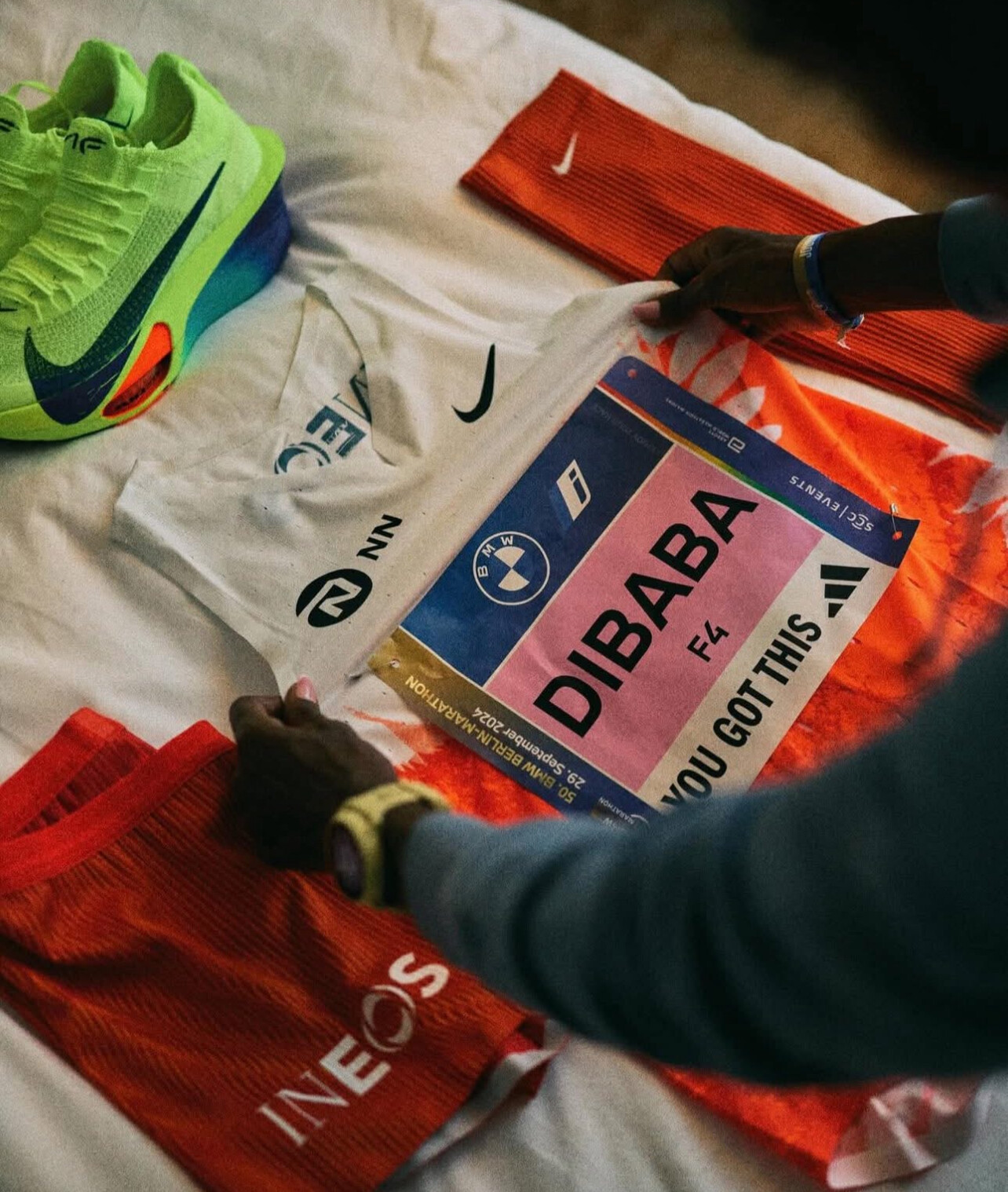
“The marathon is not only a test on race day,” Dibaba said recently. “It challenges every part of you—especially during training.”
Since stepping up to the 42.195-kilometer distance, the journey has been anything but smooth. Known for her devastating finishing kick and fluid stride on the track, Genzebe has found the roads to be an entirely different battleground—one that demands patience, endurance, and humility.
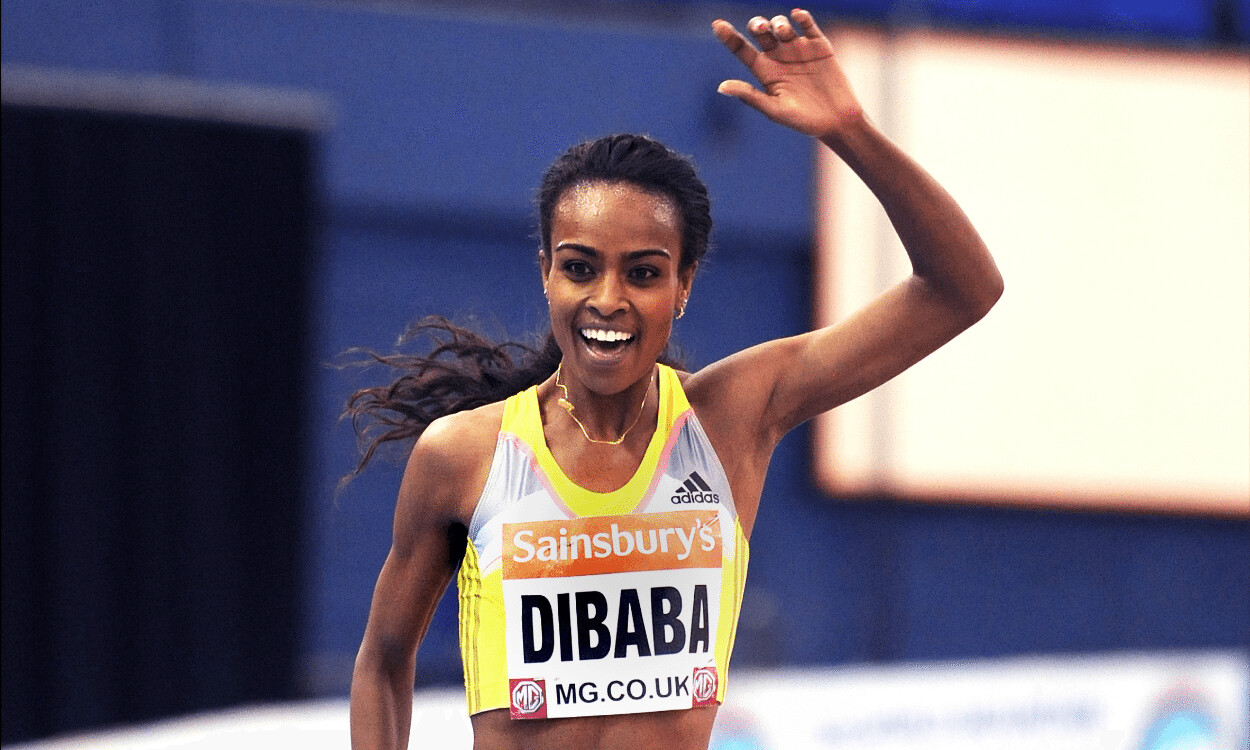
In 2024, the spotlight was on her return to Berlin, home of world records and legendary performances. But the race didn’t go as planned. Dibaba did not finish—a rare DNF for one of the most accomplished athletes of her generation. And just like that, she disappeared from competition.
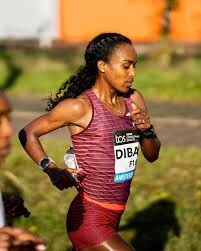
But not from the sport.
Back in the high-altitude terrain of Addis Ababa, Genzebe has been quietly rebuilding. Her training partner is her younger sister, Anna Dibaba—a rising star in her own right. Together, away from the noise, they’ve been logging miles, revisiting fundamentals, and chasing the kind of strength only the marathon demands.
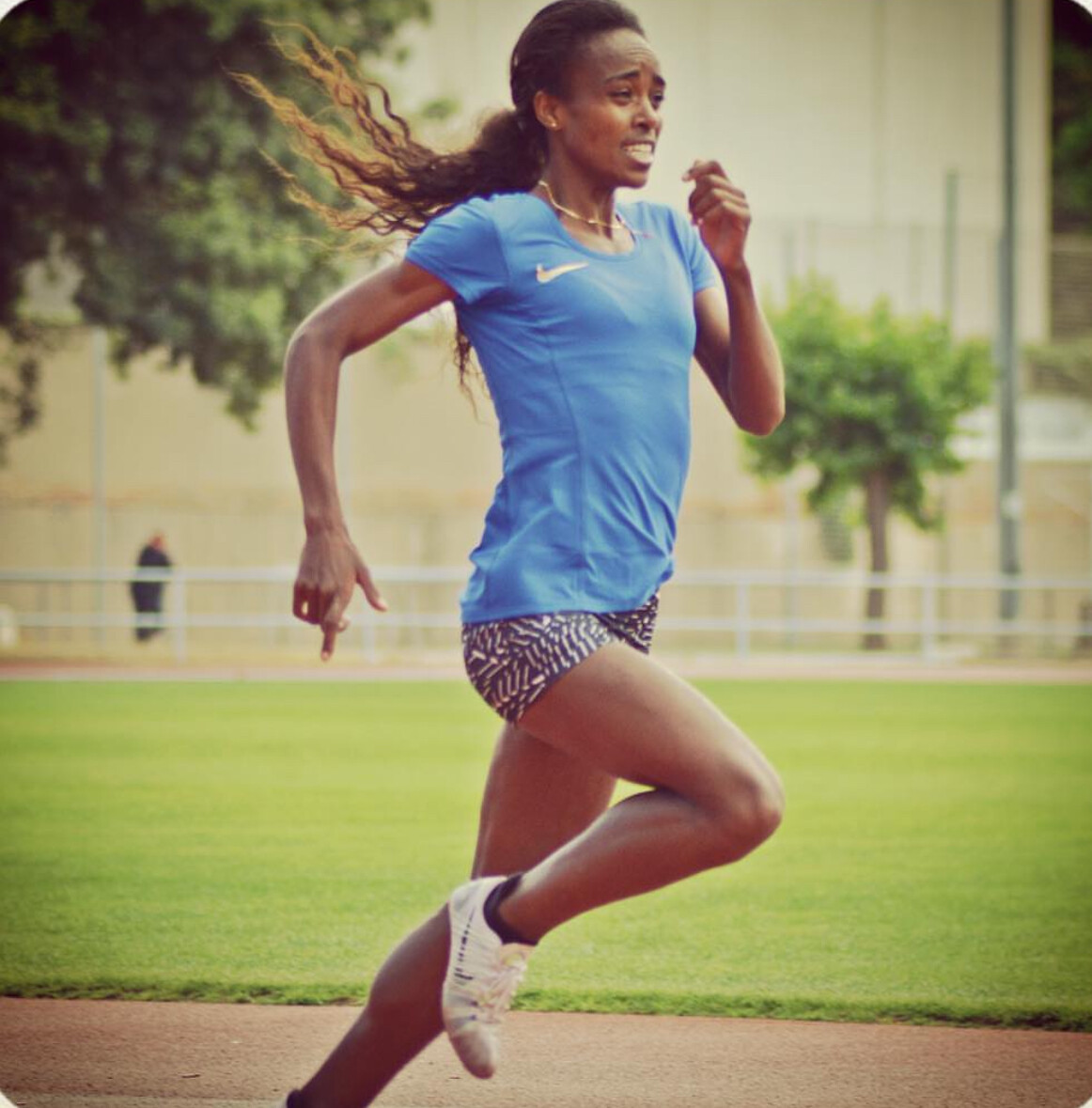
Genzebe’s pedigree remains unquestioned. From junior dominance to world indoor records, from global titles in cross country to Olympic medals on the track—few athletes have ever displayed her range or brilliance. While the marathon has stretched her, she’s shown time and again that she thrives on challenges.
Berlin 2025: A Race of Legends
Now, all eyes are turning once again toward the BMW Berlin Marathon, set for Sunday, September 28, 2025. As one of the six Abbott World Marathon Majors, Berlin is renowned for its flat, fast course and record-breaking performances. Eliud Kipchoge famously broke the world record there in 2022 (2:01:09), and Berlin has hosted more official men’s and women’s world records than any other marathon.
The 2025 edition is expected to feature a deep elite field, with organizers already teasing the return of top contenders from around the world. It’s a race that attracts nearly 50,000 runners and millions of spectators, making it one of the most iconic events on the global calendar.
And the big question lingers:
Will Genzebe Dibaba be among them? Will she return to Berlin in search of redemption and reassert her place among the greats—this time on the roads?
The countdown is on.
And if Genzebe lines up at the start in September, it won’t just be a race.
It will be a statement.
by Boris Baron
Login to leave a comment
Berlin Marathon Pumps Nearly $510 Million Into the Local Economy—Here’s How the Numbers Break Down
The BMW Berlin Marathon, set for Sunday, September 28, 2025, isn’t just a premier event for world-class athletes—it’s one of the biggest economic powerhouses in distance running.
A new independent study presented this week by Nielsen Sports found that the Berlin Marathon generated a total economic impact of €469.4 million, or approximately $509 million USD. That includes €142.7 million ($155 million USD) in direct spending by participants, visitors, and organizers, and €326.7 million ($354 million USD) in indirect economic activity such as hotels, restaurants, and retail.
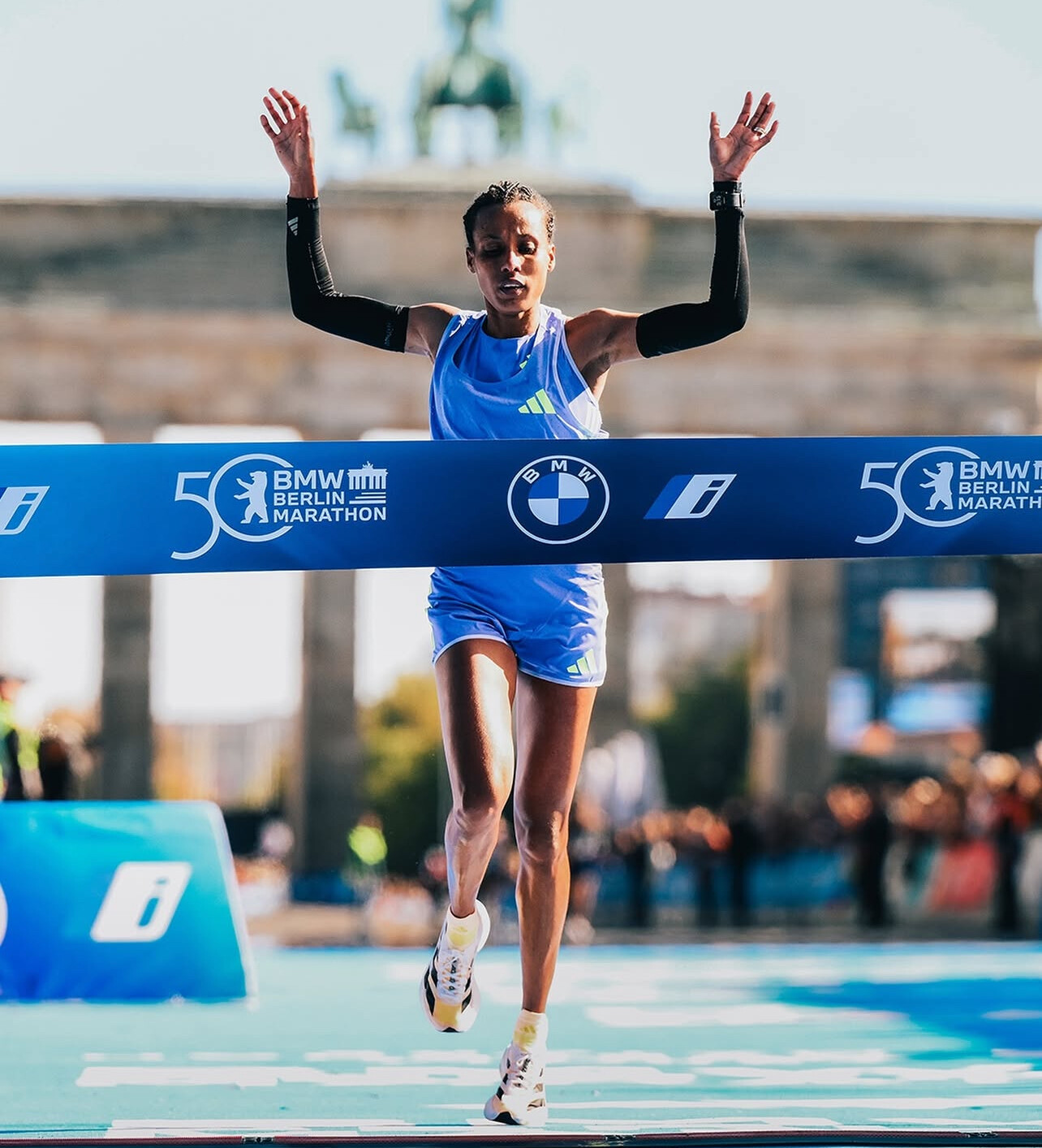
Where the Money Comes From
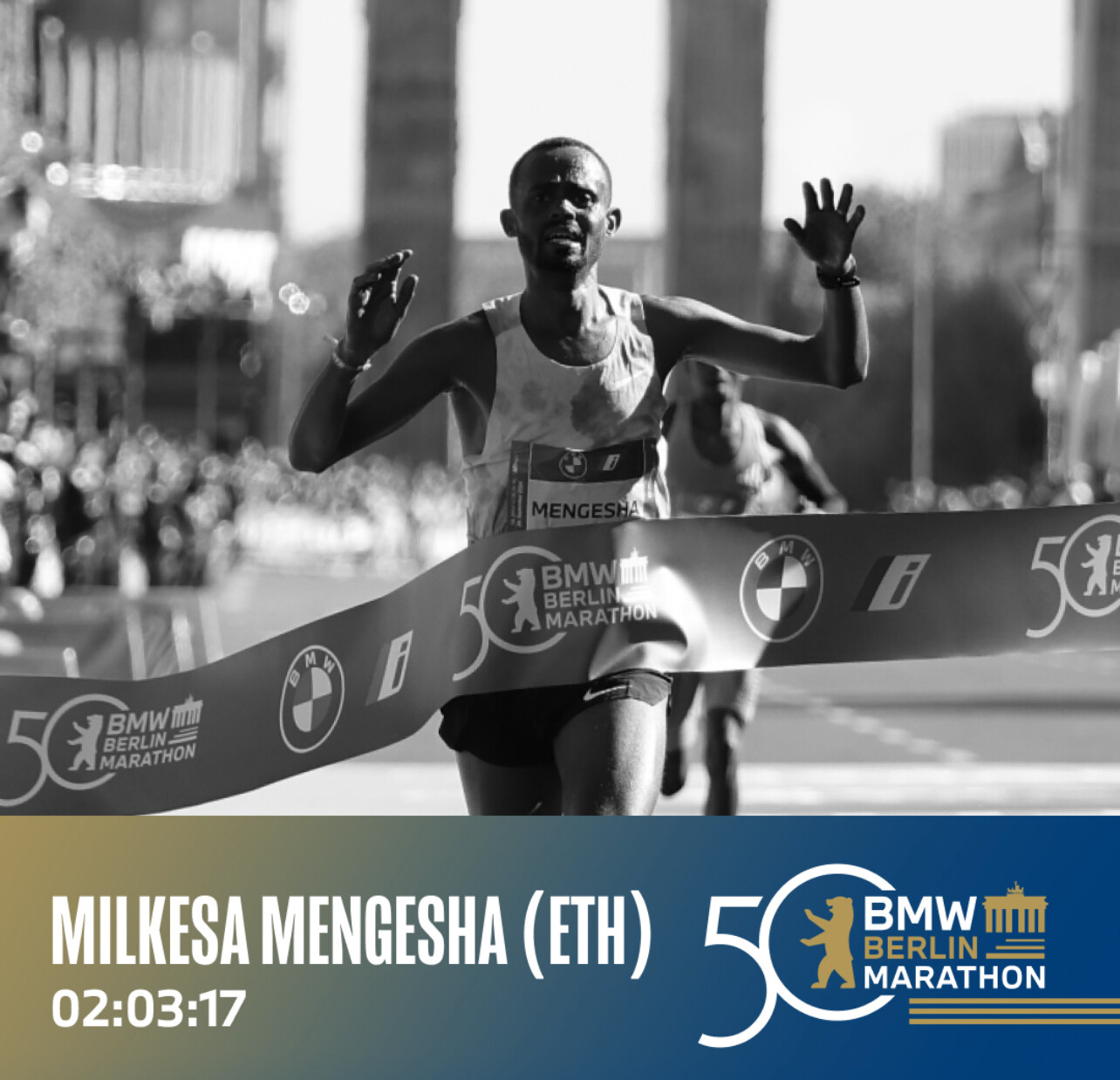
One key revenue stream is the entry fees paid by runners. With more than 47,000 participants, and an average fee of around €145 ($157 USD), that alone brings in an estimated €6.8 million ($7.4 million USD).
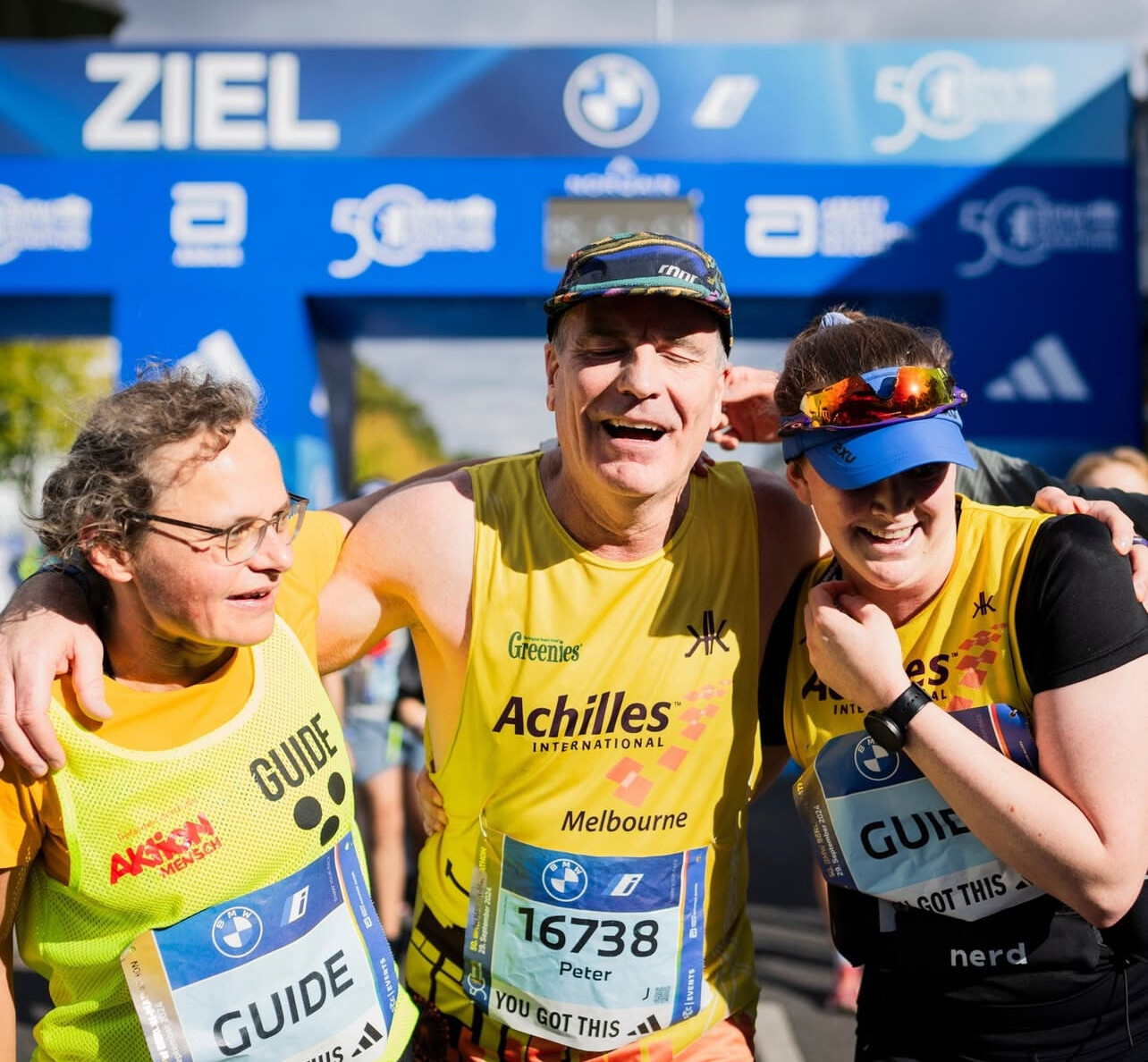
On the elite side, Berlin pays out competitive prize money, bonuses, and appearance fees. While exact figures aren’t published, estimates suggest:
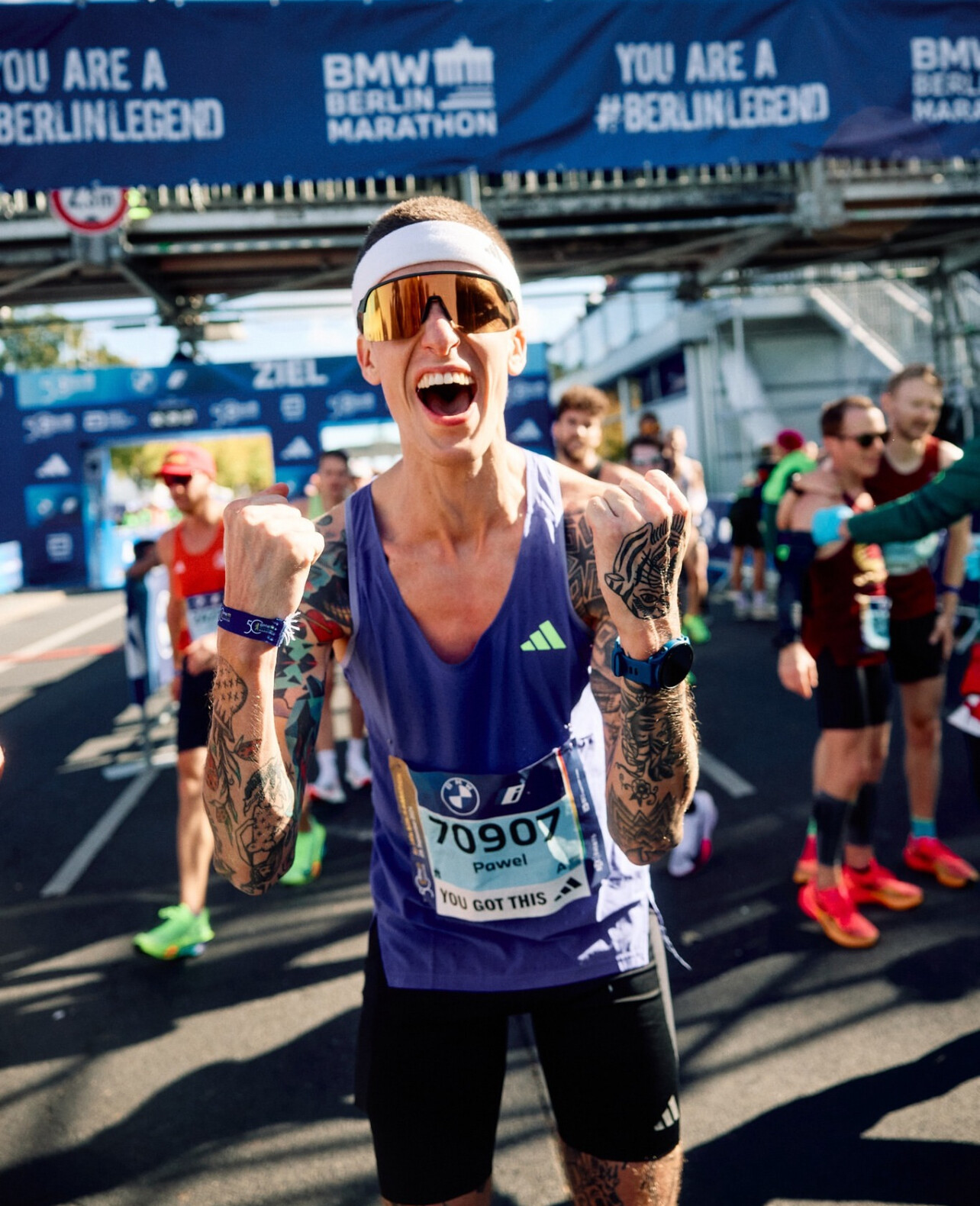
• Prize Money: Around $500,000 USD total, including winners and top-10 finishers.
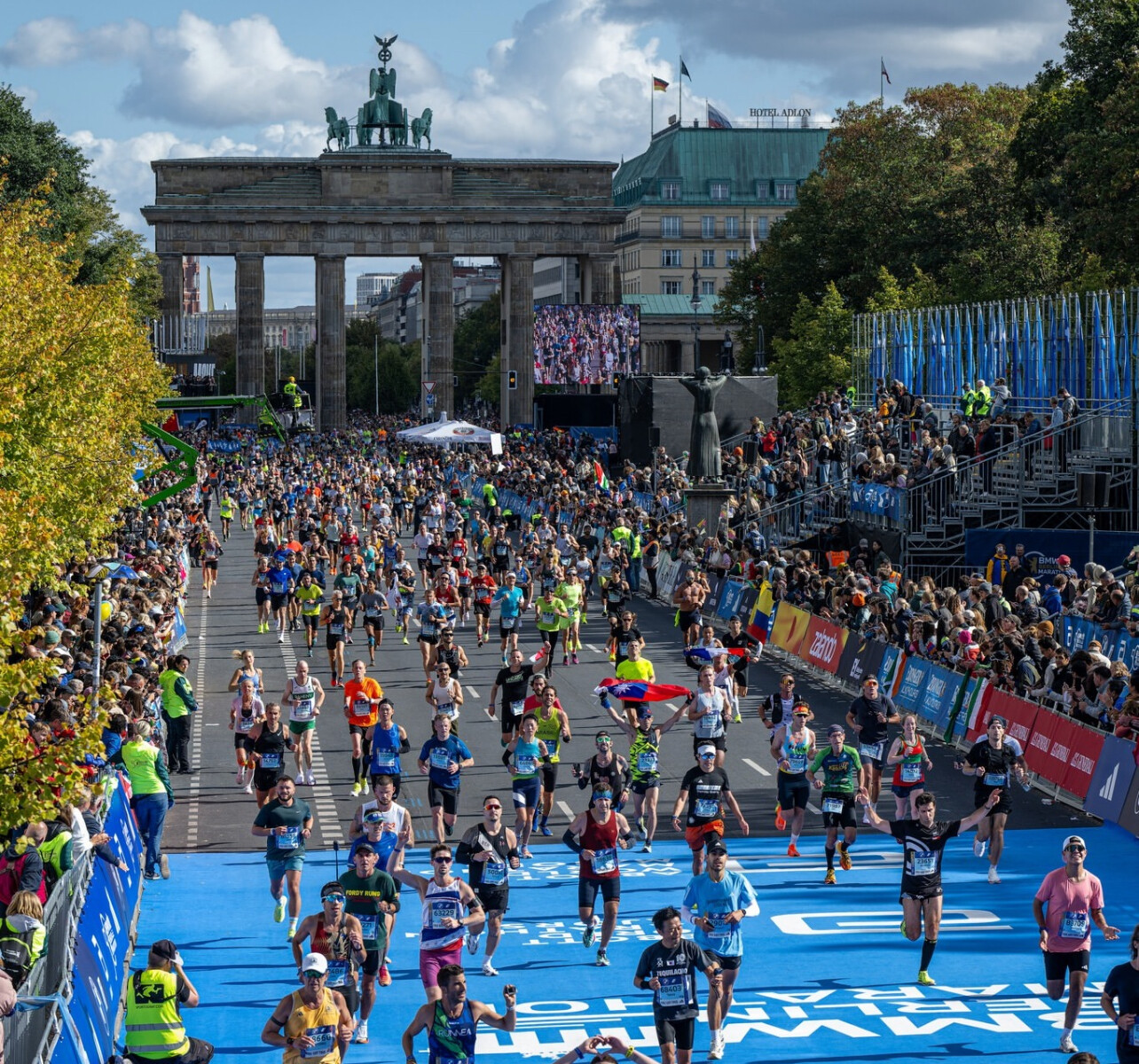
• Bonuses: Additional six-figure performance bonuses for times under certain marks (e.g. sub-2:03 or sub-2:20).
• Appearance Fees: Elite runners, especially past champions or potential record-breakers, can earn $50,000–$100,000 USD or more just to show up.
Berlin’s Fast Course Is Also a Fast Investment
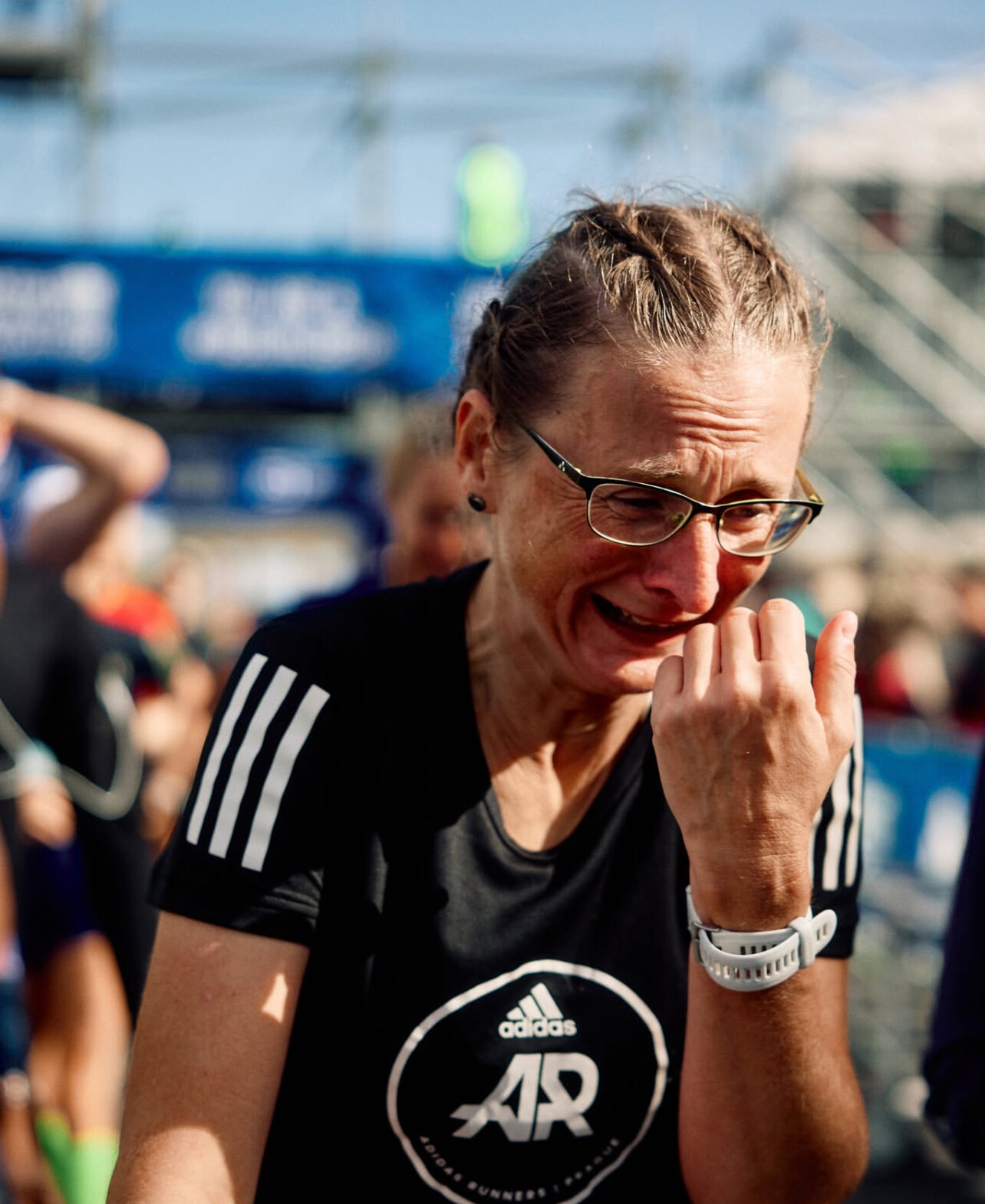
Berlin is known as the world record capital, having hosted 12 world records since 2003. That prestige, paired with a world-class event experience, keeps the race fully subscribed year after year.
Berlin’s mayor Kai Wegner and other city and sports officials were on hand this week to confirm what many already knew: the Berlin Marathon isn’t just a race—it’s a multi-million dollar economic catalystfor the city.
As race day approaches, the energy is building. Whether you’re chasing a PB or just soaking in the electric atmosphere, one thing is clear—Berlin delivers, on the roads and in the numbers.
by Boris Baron
Login to leave a comment
BMW Berlin Marathon
The story of the BERLIN-MARATHON is a story of the development of road running. When the first BERLIN-MARATHON was started on 13th October 1974 on a minor road next to the stadium of the organisers‘ club SC Charlottenburg Berlin 286 athletes had entered. The first winners were runners from Berlin: Günter Hallas (2:44:53), who still runs the BERLIN-MARATHON today, and...
more...World Marathon Majors 2025: New Course Changes and What Runners Need to Know
Runners around the world are gearing up for three of the biggest events on the calendar: the Berlin Marathon, the Chicago Marathon, and the New York City Marathon.Each race is unveiling exciting updates for 2025 — from faster surfaces to new cultural highlights — offering fresh challenges and opportunities for participants.
Here’s what you need to know to be race-day ready.
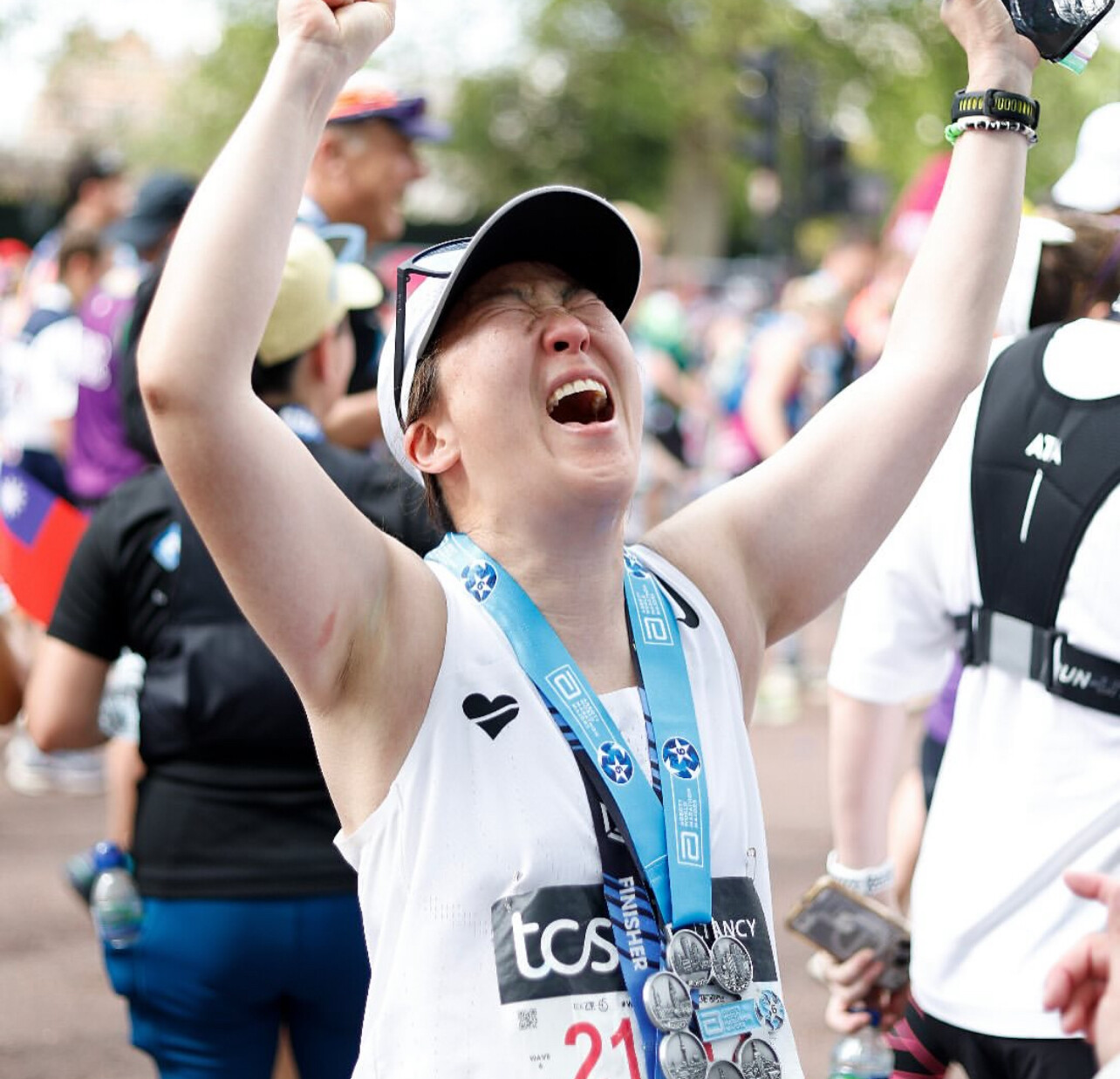
Berlin Marathon: Smoother Streets, Even Faster Times
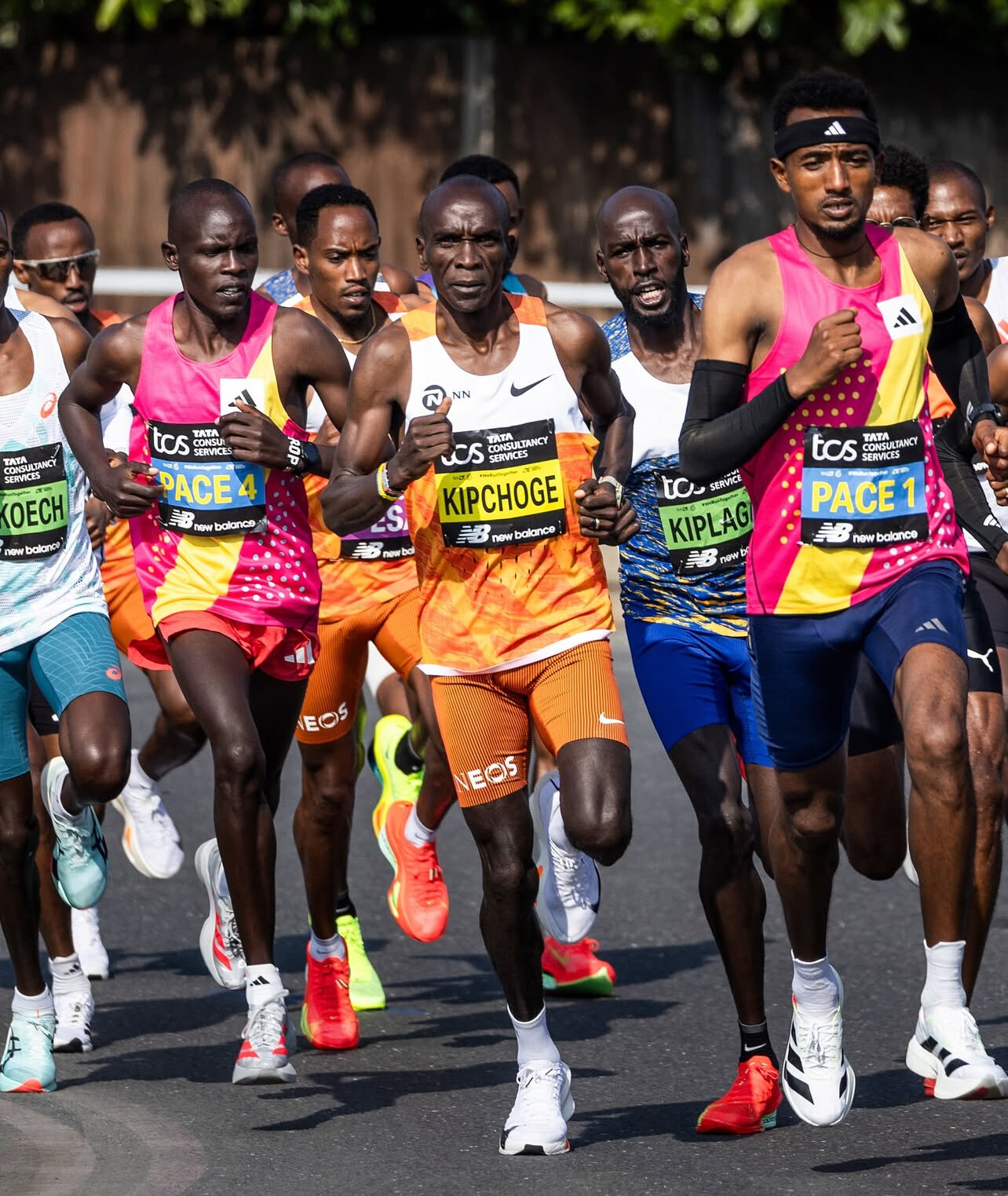
Already renowned as the fastest marathon course in the world, the BMW Berlin Marathon just got even quicker. Organizers have repaved and widened sections around Potsdamer Platz, easing congestion and improving traction through one of the race’s critical midpoints.
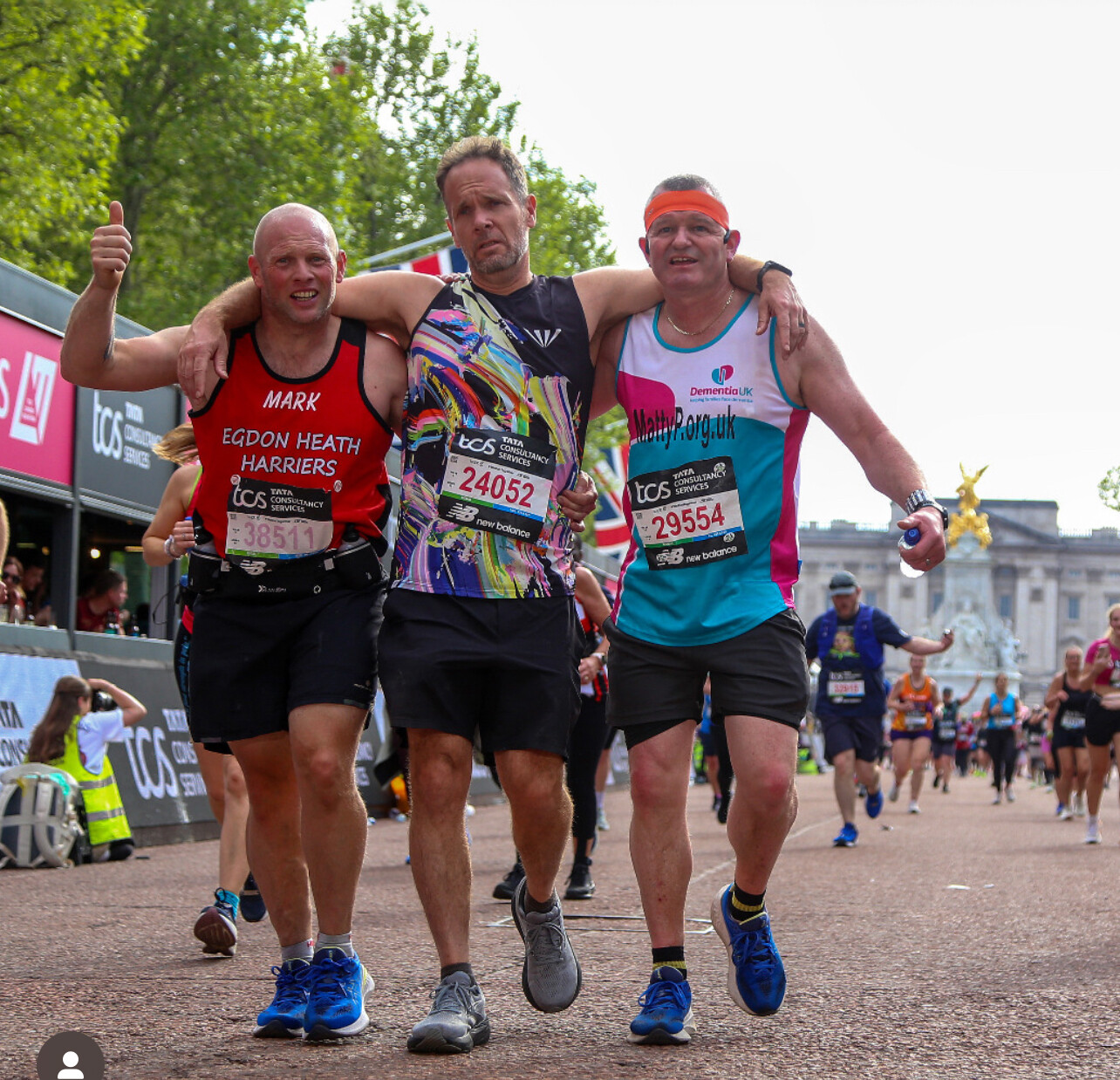
These upgrades are designed to maintain Berlin’s reputation as the ultimate destination for record-breaking performances.
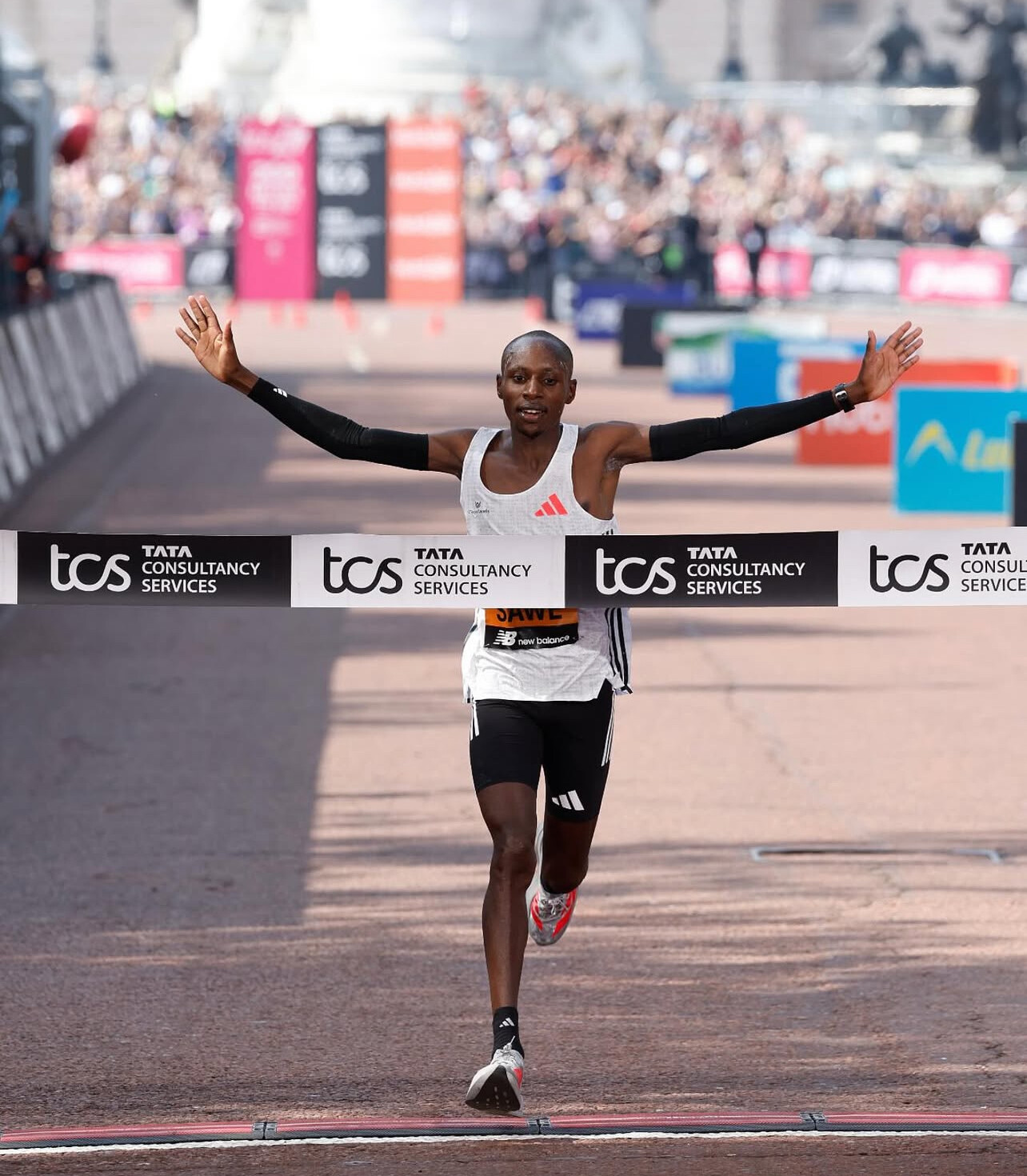
Runner Tip:With smoother streets and fewer bottlenecks, it’s easier than ever to go out too fast. Stick to your pacing plan early and aim for a strong negative split.
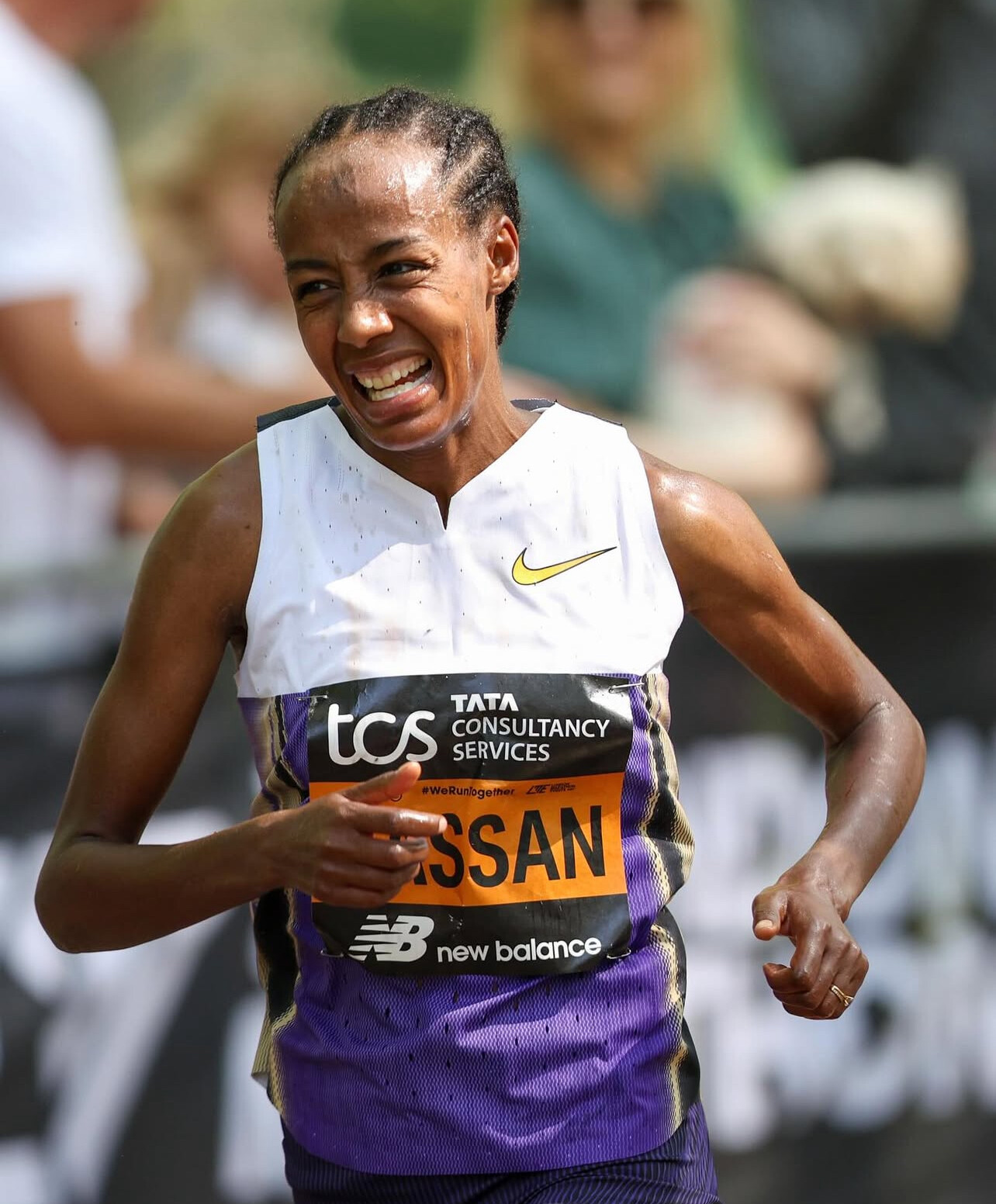
Chicago Marathon: New Start Waves and a Redesigned First 5K
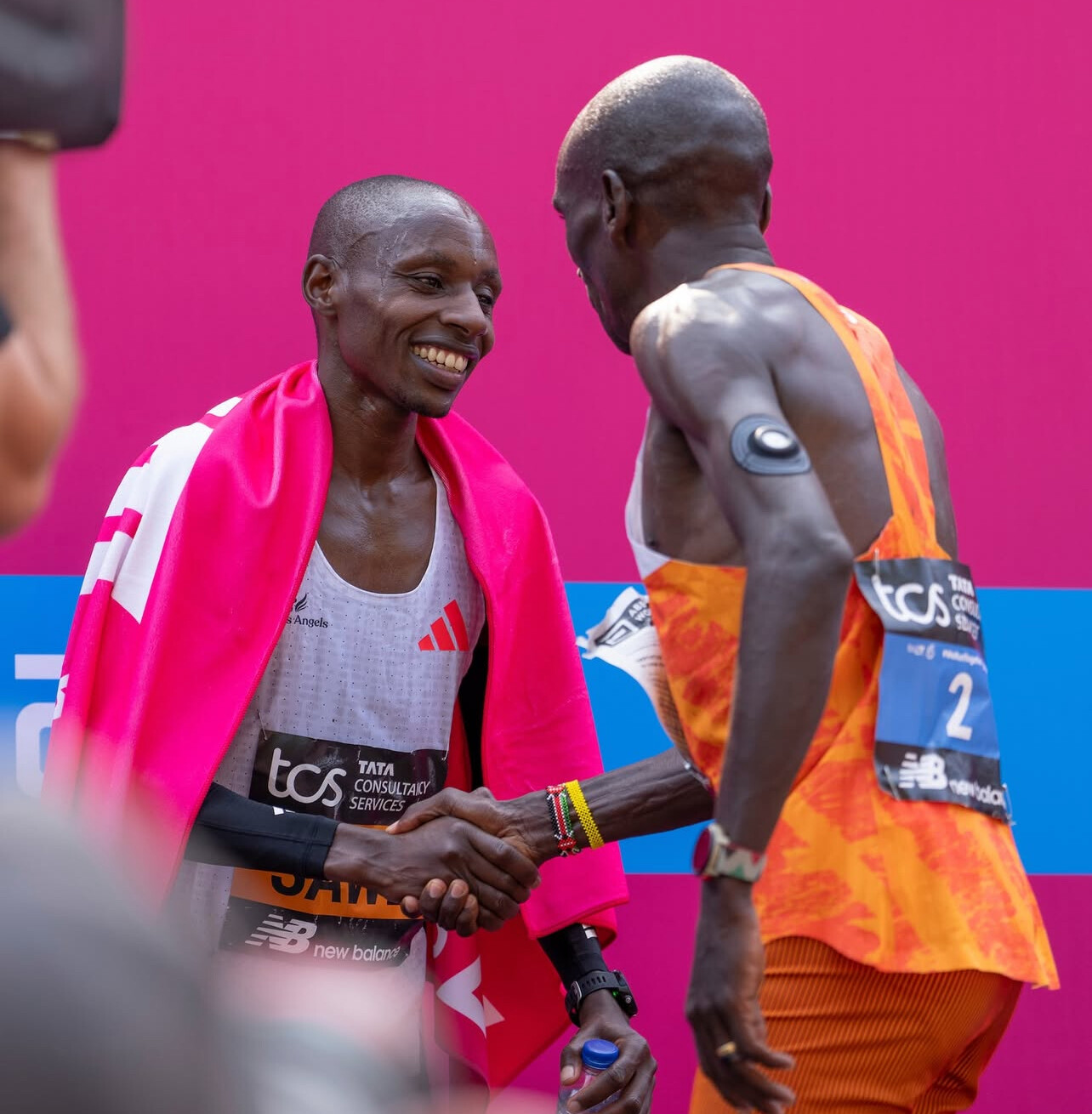
The Bank of America Chicago Marathon is expanding to accommodate more runners — and to make the race experience even smoother.In 2025, a new start wave has been introduced, and the first 5K has been slightly re-routed through Grant Park and downtown streets, designed to spread out the field more efficiently right from the start.
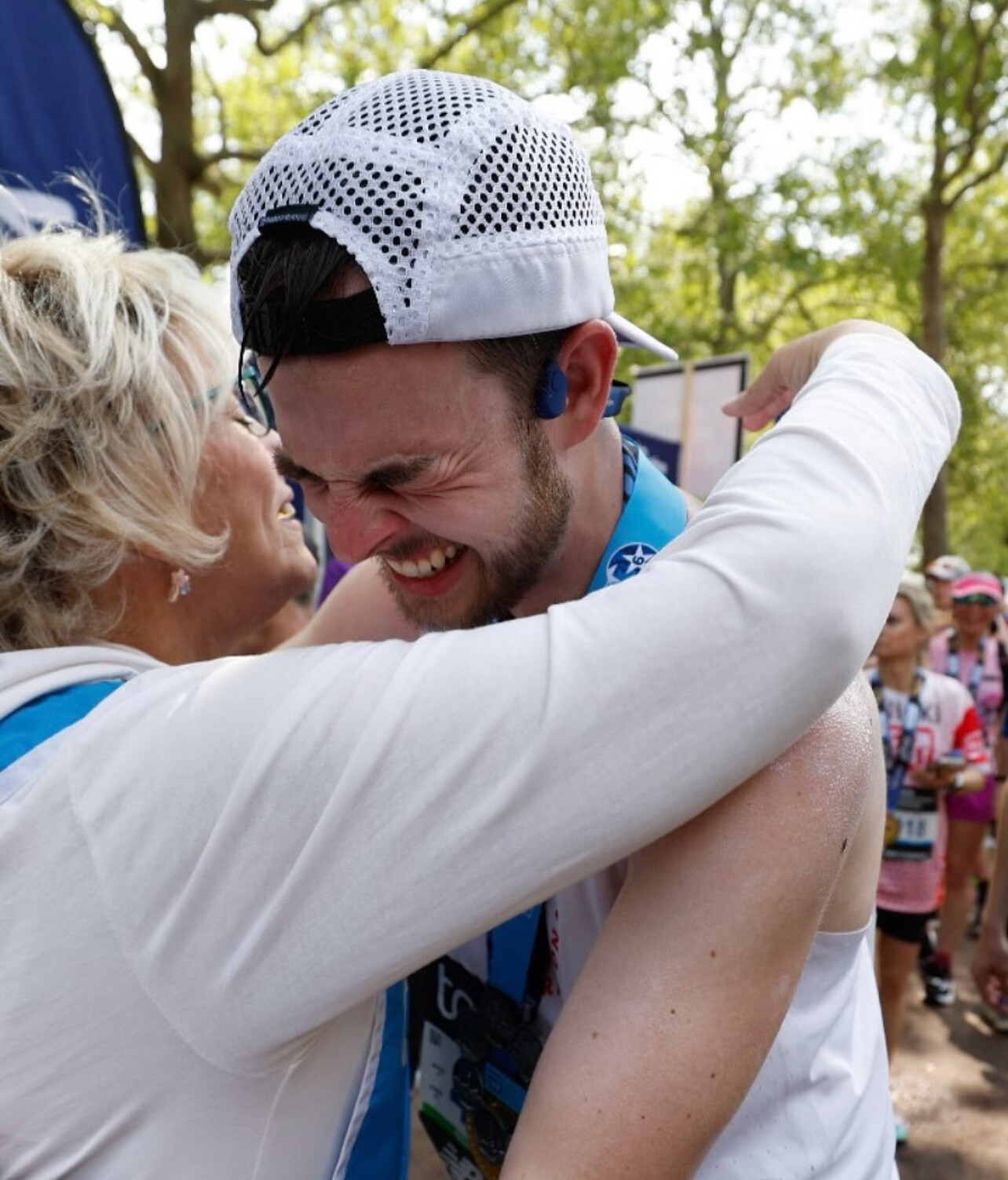
Runner Tip:Double-check your assigned start time and corral location. Race morning logistics have changed, so plan your arrival and gear check accordingly.
New York City Marathon: Harlem Takes Center Stage
The TCS New York City Marathon will showcase even more of the city’s cultural richness this year, with an extended stretch along Harlem’s iconic 125th Street.Runners will experience the vibrant heart of Harlem as they push into the later miles of the race, energized by new cheering zones and historic landmarks.
The new section introduces some gentle hills, but overall course adjustments will keep the marathon distance precise.
Runner Tip:Incorporate hill training into your final race prep. Tackling Harlem’s rolling terrain with strength can give you the edge you need heading into the final miles.
Final Thoughts
The World Marathon Majors continue to evolve, and 2025’s updates are designed to make these iconic races even more exciting for runners and fans alike.Whether you’re chasing a personal best, a Boston qualifier, or simply soaking in the atmosphere of a world-class event, being prepared for these course changes will help you make the most of race day.
While the Boston and London Marathons have already taken place earlier this year, runners can expect more changes ahead for 2026.Boston is planning minor updates to its downtown finish area to improve spectator access and athlete flow, while London is expected to introduce a fully carbon-neutral race plan, pushing even further toward sustainability.
Berlin’s speed, Chicago’s smooth new start, and New York’s cultural celebration — every race offers a new story this fall.
by Boris Baron
Login to leave a comment
Mengesha and Ketema claim Berlin Marathon crowns
Milkesa Mengesha and Tigist Ketema achieved an Ethiopian double at the BMW Berlin Marathon, a World Athletics Platinum Label road race, on Sunday (29).
Racing at the 50th edition of the event, held on a sunny morning in Germany’s capital, Mengesha kicked away from Cybrian Kotut in the closing stages to win the men’s title in a PB of 2:03:17, while Ketema solo ran her way to a 2:16:42 triumph in the women’s race.
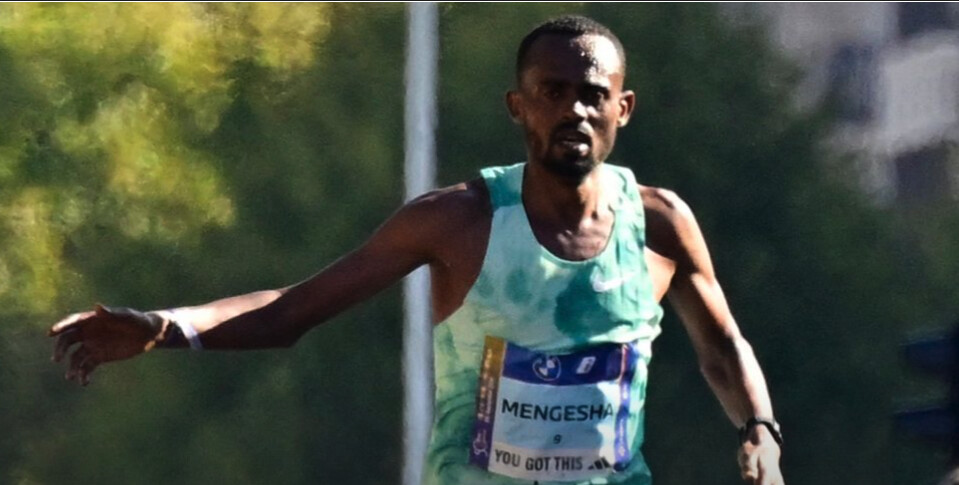
Kenya’s Kotut finished five seconds behind Mengesha, securing second place in 2:03:22, with Ethiopia’s Haymanot Alew third in 2:03:31. Ketema led an Ethiopian top four in the women’s race, winning by more than two minutes ahead of her compatriots Mestawut Fikir (2:18:48), Bosena Mulatie (2:19:00) and Aberu Ayana (2:20:20).
After a fast start Mengesha, who finished sixth in the World Championships marathon last year, was part of a lead group of 11 that followed the pacemakers through the halfway mark still on sub-2:02 pace, in 1:00:57.
Kenya’s former world half marathon record-holder Kibiwott Kandie was to the fore as the pacemakers stepped aside just after 25km. The group had reduced to eight and was bunched together by the time 30km was reached in 1:27:21, and seven were still in contention – including Ethiopia’s Tadese Takele, the fastest man in the field – as they passed the 35km mark in 1:42:14.
Kandie, Takele and Ethiopia’s Dejene Megersa couldn’t hold on and the race was down to Mengesha, Kotut, Kenya’s Stephen Kiprop and Alew with around 5km to go. They reached the 40km mark in 1:56:59 before Mengesha and Kotut strode ahead.
Mengesha dropped his rival with the Brandenburg Gate finish line in sight, crossing it to win in 2:03:17, the third fastest time in the world so far this year and a PB that improves the previous best he set in Valencia in 2022 by more than two minutes.
He dropped to his knees and was followed over the finish line by Kotut in 2:03:22, also a PB by more than a minute.
Ketema was a dominant winner of the women’s race. The 26-year-old, who ran 2:16:07 when making her marathon debut in Dubai in January, is a training partner of Tigist Assefa, who set a world record of 2:11:53 when winning in Berlin last year.
This time Ketema was in control and she was joined by her compatriot Azmera Gebru and a group of men’s race runners as 5km was reached in 16:06 and 10km in 32:14.
Ketema was 12 seconds ahead at halfway, which she hit in 1:07:53, and she only increased her advantage from there. She reached 30km in 1:36:59, by which point Gebru had been overtaken, with Ketema’s closest challengers being Mulatie, Fikir and Ayana who were running together 1 minute and 53 seconds back.
Ketema continued to forge ahead and she reached 40km in 2:09:24, with a gap of 2 minutes and 20 seconds. While Fikir closed slightly, Ketema was well clear and she won in 2:16:42, the third fastest time in the women’s race at the Berlin Marathon.
Fikir was second in 2:18:48, a PB by almost two minutes, while Mulatie was third in 2:19:00, taking almost eight minutes off her previous best set on her debut in Houston in January.
Login to leave a comment
BMW Berlin Marathon
The story of the BERLIN-MARATHON is a story of the development of road running. When the first BERLIN-MARATHON was started on 13th October 1974 on a minor road next to the stadium of the organisers‘ club SC Charlottenburg Berlin 286 athletes had entered. The first winners were runners from Berlin: Günter Hallas (2:44:53), who still runs the BERLIN-MARATHON today, and...
more...Ketema and Takele head entries for 50th Berlin Marathon
Ethiopia’s Tigist Ketema and Tadese Takele start as the fastest in the fields and will be hoping to lead the way when they line up for the BMW Berlin Marathon, a World Athletics Platinum Label road race, on Sunday (29).
Ketema, previously better known as an 800m and 1500m specialist, made her mark in the marathon in Dubai in January as she ran 2:16:07, a time that places her ninth on the women’s world marathon all-time list. She then ran 2:23:21 to place seventh in London in April and Berlin will be her first race since then.
“I have prepared for a personal best and plan to run the first half on Sunday in around 68 minutes,” she said. “I hope it won't be too cold because I prefer to run in slightly warmer weather.”
Ketema is one of three women with sub-2:20 PBs on the entry list, as her competition includes her compatriots Genzebe Dibaba and Yebrugal Melese, who have respective PBs of 2:18:05 and 2:19:36.
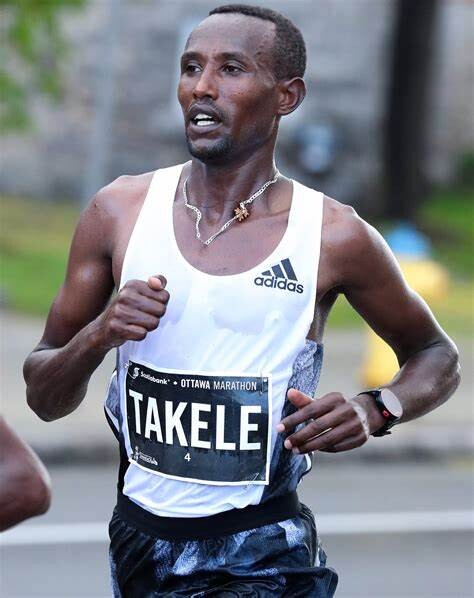
Dibaba ran that PB on her debut in Amsterdam in 2022 and she clocked 2:21:47 in Chicago a year later. “I saw Haile Gebrselassie run two world records in Berlin on TV and since then I've always wanted to run in Berlin,” she said. “Now the time has come. It would be a success for me if I ran a personal best.”
Another eight women on the entry list have dipped under 2:22 for the marathon in their careers so far, including Mestawot Fikir (2:20:45), Azmera Gebru (2:20:48), Sisay Gola (2:20:50), Fikrte Wereta (2:21:32) and Aberu Ayana (2:21:54), as well as Japan’s Mizuki Matsuda (2:20:52) and Ai Hosoda (2:21:42).
Germany’s Melat Kejeta is also part of that group, having clocked 2:21:47 in Dubai in January. She placed sixth at the Tokyo Olympics but was unable to finish the Olympic marathon in Paris due to stomach problems.
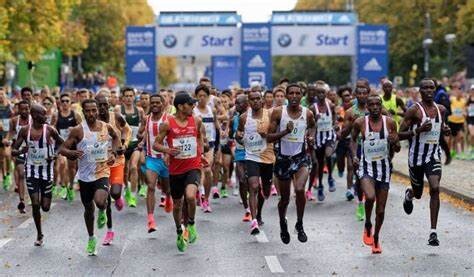
A total of 13 world records have so far been set in the Berlin Marathon, the most recent being the 2:11:53 by Tigist Assefa – a training partner of Ketema – in last year’s women’s race.
The men’s title on that occasion was won by Eliud Kipchoge, as he claimed a record fifth victory.
Kipchoge does not return this year but Takele does, following his third-place finish in last year’s race in a PB of 2:03:24. That was his most recent race due to injury, but he says he is now fit and ready to run. “I’ve trained very well,” he said, “and expect to run a strong race.”
Another four men to have dipped under 2:05 feature on the entry list, including Kenya’s Cybrian Kotut, who ran his PB of 2:04:34 when finishing second in Amsterdam last year, and Ethiopia’s Hailemaryam Kiros and Bazezew Asmare, who respectively clocked 2:04:41 in Paris in 2021 and 2:04:57 in Amsterdam in 2022.
Kenya’s former world half marathon record-holder Kibiwott Kandie races the marathon for the third time and will be looking to build on the PB of 2:04:48 he set in Valencia last year as he hunts for a first win over the distance.
They will be joined by athletes including Kenya’s Samwel Mailu, the world half marathon bronze medallist who set a course record of 2:05:08 to win the Vienna City Marathon last year and continues his comeback after injury, and Ethiopia’s Milkesa Mengesha, who finished sixth at the World Championships last year and has a best of 2:05:29.
Elite fields
Women
Tigist Ketema (ETH) 2:16:07
Genzebe Dibaba (ETH) 2:18:05
Yebrugal Melese (ETH) 2:19:36
Mestawot Fikir (ETH) 2:20:45
Azmera Gebru (ETH) 2:20:48
Sisay Gola (ETH) 2:20:50
Mizuki Matsuda (JPN) 2:20:52
Fikrte Wereta (ETH) 2:21:32
Ai Hosoda (JPN) 2:21:42
Melat Kejeta (GER) 2:21:47
Aberu Ayana (ETH) 2:21:54
Calli Hauger-Thackery (GBR) 2:22:17
Bekelech Gudeta (ETH) 2:22:54
Lisa Weightman (AUS) 2:23:15
Betelihem Afenigus (ETH) 2:23:20
Veronica Maina (KEN) 2:24:46
Bosena Mulatie (ETH) 2:26:59
Alisa Vainio (FIN) 2:27:26
Sonia Samuels (GBR) 2:28:04
Nora Szabo (HUN) 2:28:25
Philippa Bowden (USA) 2:29:14
Pauline Esikon (KEN) debut
Men
Tadese Takele (ETH) 2:03:24
Cybrian Kotut (KEN) 2:04:34
Hailemaryam Kiros (ETH) 2:04:41
Kibiwott Kandie (KEN) 2:04:48
Bazezew Asmare (ETH) 2:04:57
Samwel Mailu (KEN) 2:05:08
Milkesa Mengesha (ETH) 2:05:29
Haymanot Alew (ETH) 2:05:30
Philimon Kipchumba (KEN) 2:05:35
Josphat Boit (KEN) 2:05:42
Dejene Megersa (ETH) 2:05:42
Enock Onchari (KEN) 2:05:47
Oqbe Ruesom (ERI) 2:05:51
Justus Kangogo (KEN) 2:05:57
Haimro Alame (ISR) 2:06:04
Ashenafi Moges (ETH) 2:06:12
Asbel Rutto (KEN) 2:07:04
Samuel Tsegay (SWE) 2:06:53
Yohei Ikeda (JPN) 2:06:53
Stephen Kiprop (KEN) 2:07:04
Hendrik Pfeiffer (GER) 2:07:14
Kento Kikutani (JPN) 2:07:26
Melaku Belachew (ETH) 2:07:28
Godadaw Belachew (ISR) 2:07:45Y
uhei Urano (JPN) 2:07:52
Guojian Dong (CHN) 2:08:12
Filimon Abraham (GER) 2:08:22
Haftom Welday (GER) 2:08:24
Sebastian Hendel (GER) 2:08:51
Olonbayar Jamsran (MGL) 2:08:58
Haftamu Gebresilase (ETH) debut
by World athletics
Login to leave a comment
BMW Berlin Marathon
The story of the BERLIN-MARATHON is a story of the development of road running. When the first BERLIN-MARATHON was started on 13th October 1974 on a minor road next to the stadium of the organisers‘ club SC Charlottenburg Berlin 286 athletes had entered. The first winners were runners from Berlin: Günter Hallas (2:44:53), who still runs the BERLIN-MARATHON today, and...
more...50th BMW Berlin-Marathon Sunday: Deep fields promise fast and exciting races in Berlin’s jubilee marathon
The 50th edition of the BMW Berlin Marathon promises fast and exciting elite races. Deep fields will be assembled with 14 men who have already run sub 2:06:00. While there is no strong favourite among them it is different with the women: Ethiopia’s Tigist Ketema heads the list with her stunning 2:16:07 debut time, which makes her the ninth-fastest marathon runner ever.
Ten more women have personal bests of sub 2:22:00. Thirteen world records were broken in the history of the BMW Berlin Marathon, many more than in any other marathon. The jubilee edition of Germany’s most spectacular road race will have a record number of around 50,000 participants.
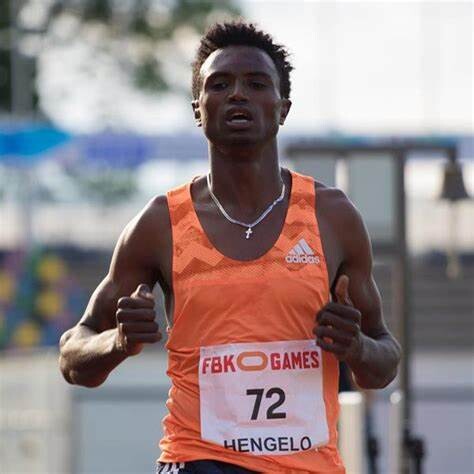
Men’s field
Without Kenya’s superstar Eliud Kipchoge, the winner of the past two editions, the fastest on paper is Tadese Takele. The Ethiopian was third in Berlin a year ago when he improved to 2:03:24. Since another fast race is expected Takele will probably have to run quicker to be in contention for the prestigious marathon victory at the Brandenburg Gate.
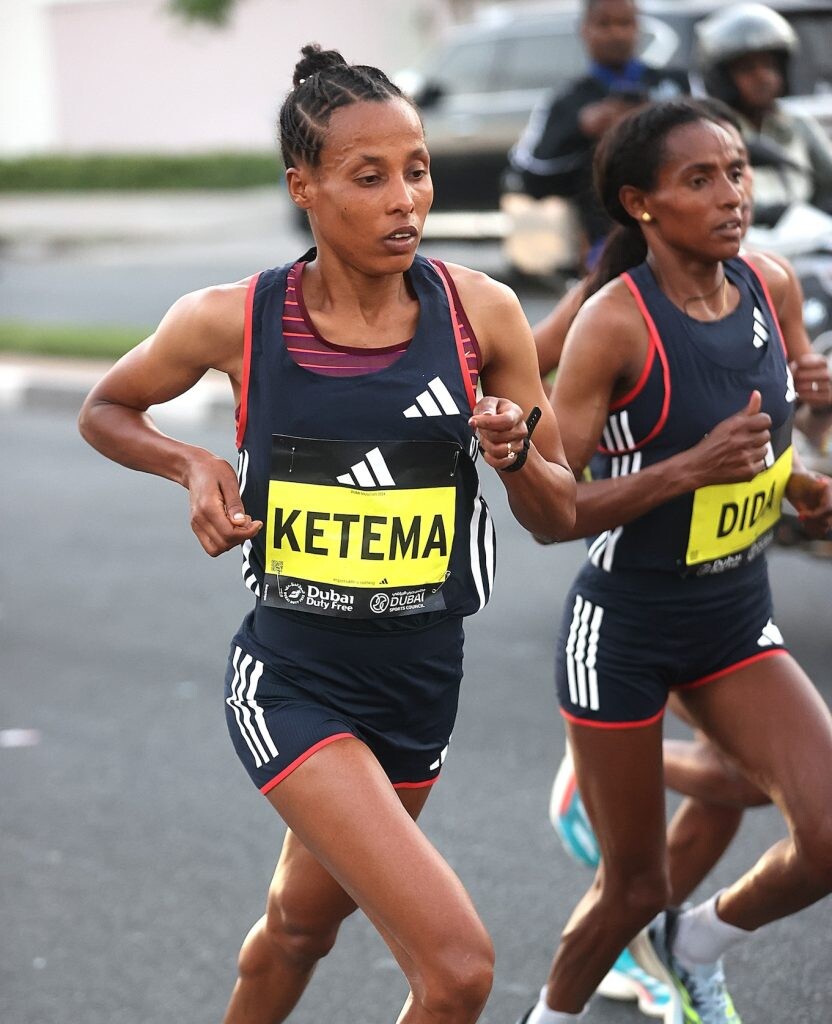
Fellow Kenyan Kibiwott Kandie could well challenge for his first triumph over the classic distance. The Kenyan is the former world half marathon record holder (57:32) with great potential. Germany’s Hendrik Pfeiffer leads a group of strong domestic runners. He improved to 2:07:14 early this year in Houston.
Women’s field
Tigist Ketema stormed to a sensational victory in Dubai at the beginning of the year, clocking an unofficial world debut record of 2:16:07. Coming to another very fast course now the training partner of Tigst Assefa, who smashed the world record here with 2:11:53 a year ago, might look to improve her personal best.
The women’s field includes a former world record holder as well, but at a much shorter distance: Genzebe Dibaba ran 3:50.07 in the 1,500m in 2015. When she switched to the marathon she ran a fast debut with 2:18:05 in Amsterdam two years ago.
Unfortunately, Kenya’s Rosemary Wanjiru had to cancel her start due to injury. But Germany’s Melat Kejeta is a late addition to the field. She dropped out of the Olympic Marathon early because of stomach problems and now hopes to bounce back in Berlin with a personal best. Kejeta might well try to become the second German woman after Irina Mikitenko (2:19:19 in Berlin in 2008) to break 2:20:00.
MEN
Tadese Takele ETH 2:03:24
Cybrian Kotut KEN 2:04:34
Hailemaryam Kiros ETH 2:04:41
Kibiwott Kandie KEN 2:04:48
Bazezew Asmare ETH 2:04:57
Samwel Mailu KEN 2:05:08
Milkesa Mengesha ETH 2:05:29
Haymanot Alew ETH 2:05:30
Philimon Kipchumba KEN 2:05:35
Josphat Boit KEN 2:05:42
Dejene Megersa ETH 2:05:42
Enock Onchari KEN 2:05:47
Oqbe Ruesom ERI 2:05:51
Justus Kangogo KEN 2:05:57
Haimro Alame ISR 2:06:04
Ashenafi Moges ETH 2:06:12
Asbel Rutto KEN 2:07:04
Samuel Tsegay SWE 2:06:53
Yohei Ikeda JPN 2:06:53
Stephen Kiprop KEN 2:07:04
Hendrik Pfeiffer GER 2:07:14
Kento Kikutani JPN 2:07:26
Melaku Belachew ETH 2:07:28
Godadaw Belachew ISR 2:07:45
Yuhei Urano JPN 2:07:52
Guojian Dong CHN 2:08:12
Filimon Abraham GER 2:08:22
Haftom Welday GER 2:08:24
Sebastian Hendel GER 2:08:51
Olonbayar Jamsran MGL 2:08:58
Haftamu Gebresilase ETH Debut
WOMEN
Tigist Ketema ETH 2:16:07
Genzebe Dibaba ETH 2:18:05
Yebrugal Melese ETH 2:19:36
Mestawot Fikir ETH 2:20:45
Azmera Gebru ETH 2:20:48
Sisay Gola ETH 2:20:50
Mizuki Matsuda JPN 2:20:52
Fikrte Wereta ETH 2:21:32
Ai Hosoda JPN 2:21:42
Melat Kejeta GER 2:21:47
Aberu Ayana ETH 2:21:54
Calli Hauger-Thackery GBR 2:22:17
Bekelech Gudeta ETH 2:22:54
Lisa Weightman AUS 2:23:15
Betelihem Afenigus ETH 2:23:20
Veronica Maina KEN 2:24:46
Bosena Mulatie ETH 2:26:59
Alisa Vainio FIN 2:27:26
Sonia Samuels GBR 2:28:04
Nora Szabo HUN 2:28:25
Philippa Bowden USA 2:29:14
Pauline Esikon KEN Debut
by Christopher Kelsall
Login to leave a comment
BMW Berlin Marathon
The story of the BERLIN-MARATHON is a story of the development of road running. When the first BERLIN-MARATHON was started on 13th October 1974 on a minor road next to the stadium of the organisers‘ club SC Charlottenburg Berlin 286 athletes had entered. The first winners were runners from Berlin: Günter Hallas (2:44:53), who still runs the BERLIN-MARATHON today, and...
more...Melat Kejeta and Hendrik Pfeiffer will lead a group of strong top runners at Berlin Marathon
On Thursday, the organizers announced the signing of the best German marathon runner of recent years, Melat Kejeta, for the anniversary edition of the 50th BMW Berlin Marathon. In the men's race, Hendrik Pfeiffer will lead a group of strong German top runners.
Melat Kejeta will start at the BMW Berlin Marathon on September 29. It will be the first appearance for the then 32-year-old at the biggest German marathon spectacle since her impressive debut race in 2019. At that time, Melat Kejeta had surprised in Berlin in sixth place with 2:23:57 hours and made the fastest marathon debut of a German woman.
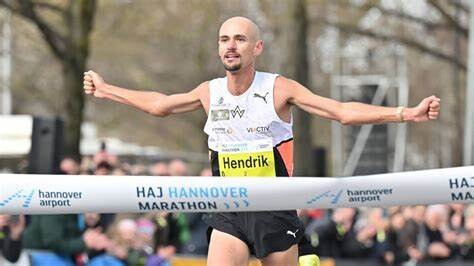
She then ran an excellent race in her second marathon at the 2021 Olympic Games. In Sapporo (Japan) she reached sixth place. In January 2024, Melat Kejeta improved to 2:21:47 in Dubai and finished in an excellent fourth place. However, she was unlucky at the Olympics in Paris in August. Due to stomach problems, she had to give up the race early. In Berlin, Melat Kejeta now wants to rehabilitate himself.
Hendrik Pfeiffer leads German top runners
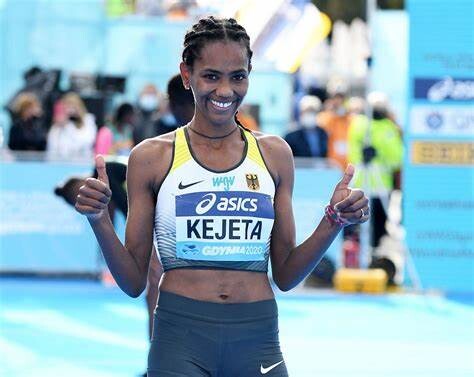
Hendrik Pfeiffer (TK zu Hannover) had improved to 2:07:14 hours in a brilliant race in Houston (USA) in January in third place and thus became the fourth fastest German marathon runner in history. After he had set the pace almost entirely on his own, he was ten seconds short in the end to secure the third German Olympic starting place. In April, Hendrik Pfeiffer surprised with a seventh place at the marathon classic in London (Great Britain).
After he was unable to run a marathon for about one and a half years due to injury, Filimon Abraham (LG Telis Finanz Regensburg; PB: 2:08:22 h) in Berlin. Haftom Welday (TB Hamburg Eilbeck), who improved to 2:08:24 hours last year in Valencia (Spain), is in an identical performance range. While Sebastian Hendel (LG Braunschweig; 2:08:51 h) ran under 2:10 hours for the first time in Hamburg in April, Johannes Motschmann (Marathon Team Berlin) now wants to beat this mark for the first time in Berlin. He had surprised at the London Marathon in April with ninth place and improved to 2:10:39 hours.
Tom Gröschel (TC Fiko Rostock; 2:11:03 h), who finished eleventh as the best German marathon runner at the European Championships in Berlin in 2018, will be competing in what may be his last race as an elite athlete.
by Jörg Wenig
Login to leave a comment
BMW Berlin Marathon
The story of the BERLIN-MARATHON is a story of the development of road running. When the first BERLIN-MARATHON was started on 13th October 1974 on a minor road next to the stadium of the organisers‘ club SC Charlottenburg Berlin 286 athletes had entered. The first winners were runners from Berlin: Günter Hallas (2:44:53), who still runs the BERLIN-MARATHON today, and...
more...Kandie spearheads star-studded field to Berlin Marathon
Former World Half Marathon record holder Kibiwott Kandie spearheads a stellar lineup at the Berlin Marathon on September 29.
The organisers anticipate a record-breaking turnout of over 50,000 participants, surpassing last year’s 48,000.
“The organisers of the BMW Berlin Marathon are expecting a record number of more than 50,000 runners on September 29, when Germany's most high-class and spectacular road race will take place for the 50th time,” the organisers said in a statement.
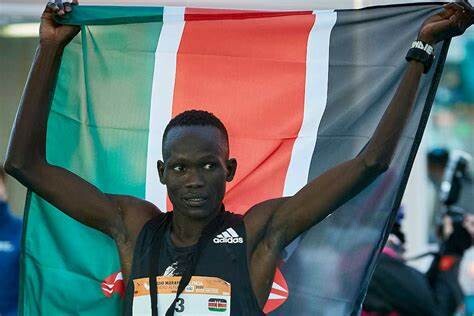
“However, two names are missing from the start list this time. Kenya's superstar Eliud Kipchoge and Ethiopia's running legend Kenenisa Bekele. For the first time since 2014, neither of them will be taking part in Berlin.”
Kipchoge is the all-time Berlin Marathon champion having won a record five times. Last year, Kipchoge cut the tape in 2:02:42 followed by Vincent Kipkemoi (2:03:13) and Tadese Tekele of Ethiopia (2:03:24).
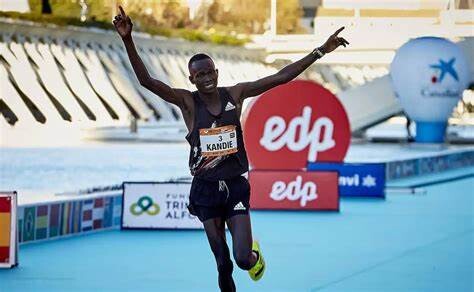
Kandie is a three-time Valencia Half Marathon champion from 2020 (57:32), 2022 (58:10) and 2023 (57:40).
He boasts titles from the 2020 Prague Half Marathon (58:38), the 2022 Adizero Road to Records 10km race (26:50) and the 2020 Ras Al Khaimah Half Marathon (58:58).
He has a silver at the 2020 World Half Marathon Championships (58:54) and a bronze in the 10,000m at the 2022 Commonwealth Games (27:20.34).
He will team up with 2022 Castellon Marathon winner Ronald Korir, Amsterdam Marathon runner-up Cyprian Kotut, 2023 World Road Running bronze medallist Samwel Mailu and Shanghai Marathon champion Philemon Kiptoo.
Ethiopia’s Takele, last year’s silver medallist, is expected to pose a serious challenge for the Kenyans, alongside compatriot Hailemaryam Kiros, the 2023 Osaka Marathon champion.
Tokyo Marathon runner-up Rosemary Wanjiru leads the charge in the women’s elite race.
The 29-year-old’s accolades include victories at the 2023 Tokyo Marathon (2:16:28) and the Hokuren Distance Challenge in the 10,000m (30:38.18) in Japan.
She is also a runner-up at the 2020 Valencia 10km Road race (29:50) and the 2022 Berlin Marathon (2:18:00).
She faces a rich Ethiopian contingent led by Dubai Marathon champion Tigist Ketema, 2018 Shanghai Marathon champion Yebrgual Melese, Paris Marathon champion Mestawut Fikir and 2023 Osaka Marathon runner-up Sisay Meseret.
Also in the mix is three-time Osaka Marathon champion Mizuki Matsuda of Japan.
by Teddy Mulei
Login to leave a comment
BMW Berlin Marathon
The story of the BERLIN-MARATHON is a story of the development of road running. When the first BERLIN-MARATHON was started on 13th October 1974 on a minor road next to the stadium of the organisers‘ club SC Charlottenburg Berlin 286 athletes had entered. The first winners were runners from Berlin: Günter Hallas (2:44:53), who still runs the BERLIN-MARATHON today, and...
more...Wanjiru and Takele return for 50th Berlin Marathon
Four women with sub-2:20 PBs and six men to have dipped under 2:05 feature on the entry lists for the BMW Berlin Marathon, a World Athletics Platinum Label road race, on September 29.
Ethiopia’s Tigist Ketema and Kenya’s Rosemary Wanjiru top the women’s entry list with PBs that put them in the top 10 on the world marathon all-time list.
Ketema, who had been better known as an 800m and 1500m specialist, stormed into the marathon spotlight in Dubai in January as she ran 2:16:07, a time that makes her the ninth-fastest women’s marathon runner in history. She followed that with 2:23:21 for seventh place in London in April and Berlin will be her first race since then.
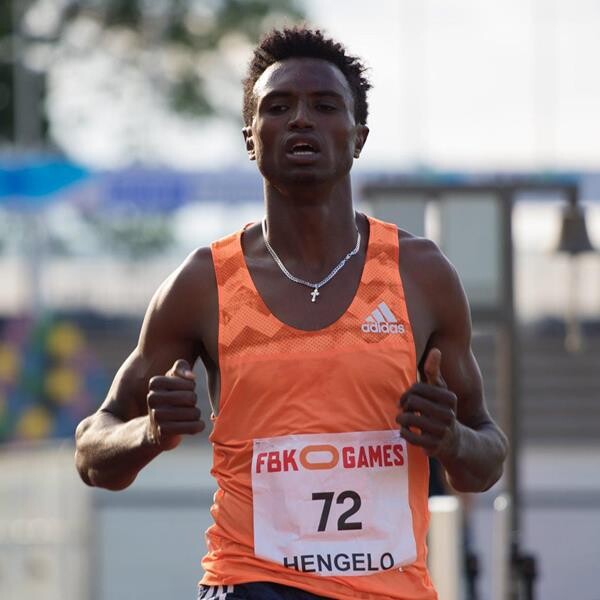
Just one place behind Ketema on the all-time list is Wanjiru, who clocked 2:16:14 to finish second in Tokyo in March. That followed her sixth place in the World Championships marathon in Budapest and victory in the Tokyo Marathon last year. Wanjiru also finished second in Berlin in 2022, running 2:18:00 on her debut.
Joining them on the start line are Ethiopia’s Genzebe Dibaba and Yebrugal Melese, who have respective PBs of 2:18:05 and 2:19:36, plus their compatriots Mestawot Fikir (2:20:45), Azmera Gebru (2:20:48), Sisay Gola (2:20:50), Ababel Yeshaneh (2:20:51) and Fikrte Wereta (2:21:32), as well as Japan’s Mizuki Matsuda (2:20:52).
A total of 13 world records have so far been set in the Berlin Marathon, the most recent being the 2:11:53 by Tigist Assefa in last year’s women’s race.
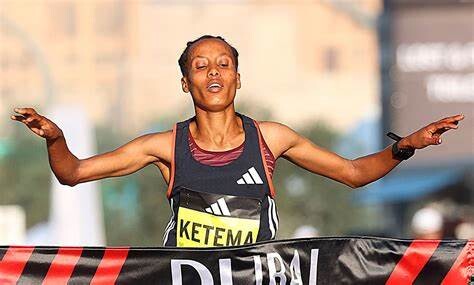
The men’s title on that occasion was won by Eliud Kipchoge, as he claimed a record fifth victory.
This year, for the first time since 2014, the men’s race will not feature Kipchoge or Kenenisa Bekele – who between them have won the race seven times, with two of Kipchoge’s wins having been claimed in world records – but fast times will still be the target.
Among those who will be returning to Berlin are Ethiopia’s Tadese Takele and Ronald Korir of Kenya, who placed third and fourth last year in respective PBs of 2:03:24 and 2:04:22.
Kenya’s Cybrian Kotut ran his PB of 2:04:34 when finishing second in Amsterdam last year and makes his Berlin Marathon debut, while Ethiopia’s Hailemaryam Kiros and Bazezew Asmare have also broken 2:05 in their careers so far, respectively running 2:04:41 in Paris in 2021 and 2:04:57 in Amsterdam in 2022.
Kenya’s Kibiwott Kandie races the marathon for the third time. The former world half marathon record-holder, who clocked 57:32 for 13.1 miles in 2020, will be looking to build on the PB of 2:04:48 he set in Valencia last year.
Also seeking a spot on the podium will be Kenya’s Samwel Mailu, the world half marathon bronze medallist who set a course record of 2:05:08 to win the Vienna City Marathon last year and continues his comeback after injury.
by World Athletics
Login to leave a comment
BMW Berlin Marathon
The story of the BERLIN-MARATHON is a story of the development of road running. When the first BERLIN-MARATHON was started on 13th October 1974 on a minor road next to the stadium of the organisers‘ club SC Charlottenburg Berlin 286 athletes had entered. The first winners were runners from Berlin: Günter Hallas (2:44:53), who still runs the BERLIN-MARATHON today, and...
more...Kiptum smashes world marathon record with 2:00:35, Hassan runs 2:13:44 in Chicago
Kenya’s Kelvin Kiptum became the first athlete to break 2:01 in a record-eligible marathon, clocking a tremendous 2:00:35* to take 34 seconds off the world record at the Bank of America Chicago Marathon on Sunday (8).
On a remarkable day of racing, Dutch star Sifan Hassan moved to No.2 on the women’s all-time list, running 2:13:44 to triumph in the World Athletics Platinum Label road race. The only woman to have ever gone faster is Ethiopia’s Tigist Assefa, who set a world record of 2:11:53 to win the BMW Berlin Marathon last month.
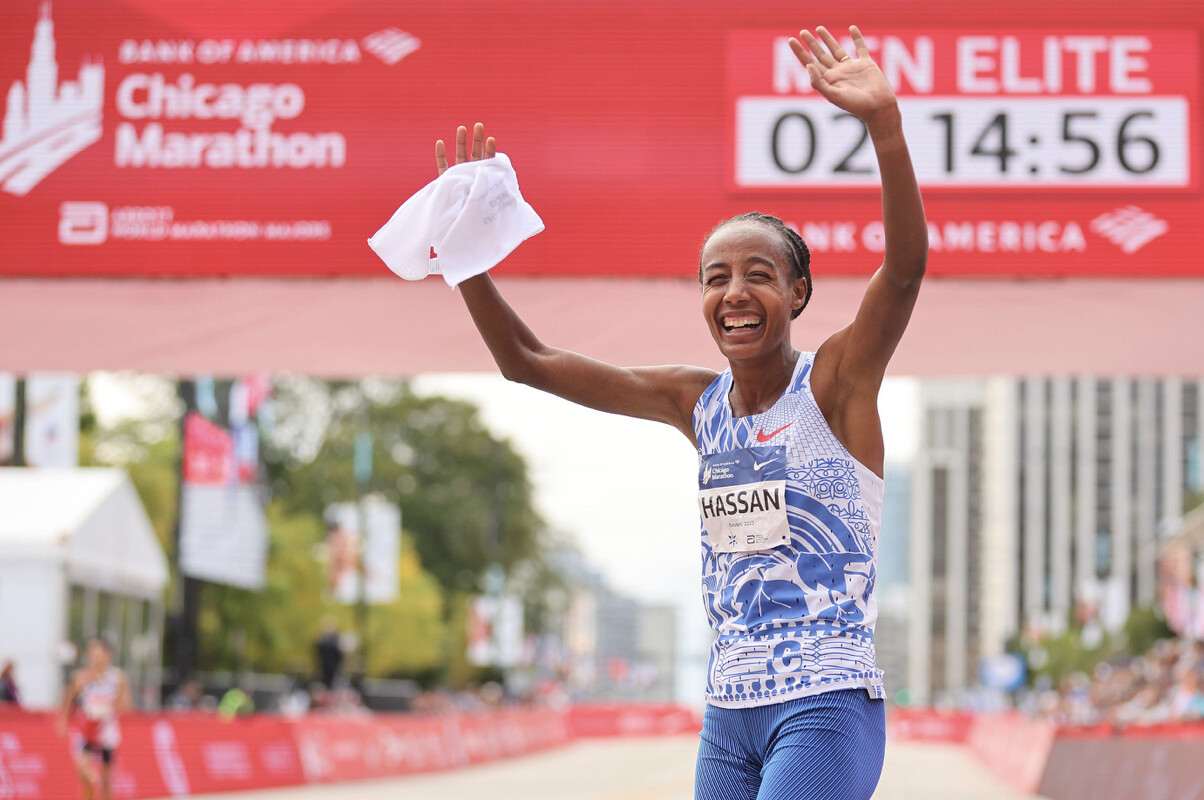
Less than six months on from his 2:01:25 London Marathon win, which saw him become the second-fastest marathon runner of all time, Kiptum improved by another 50 seconds to surpass the world record mark of 2:01:09 set by his compatriot Eliud Kipchoge in Berlin last year.
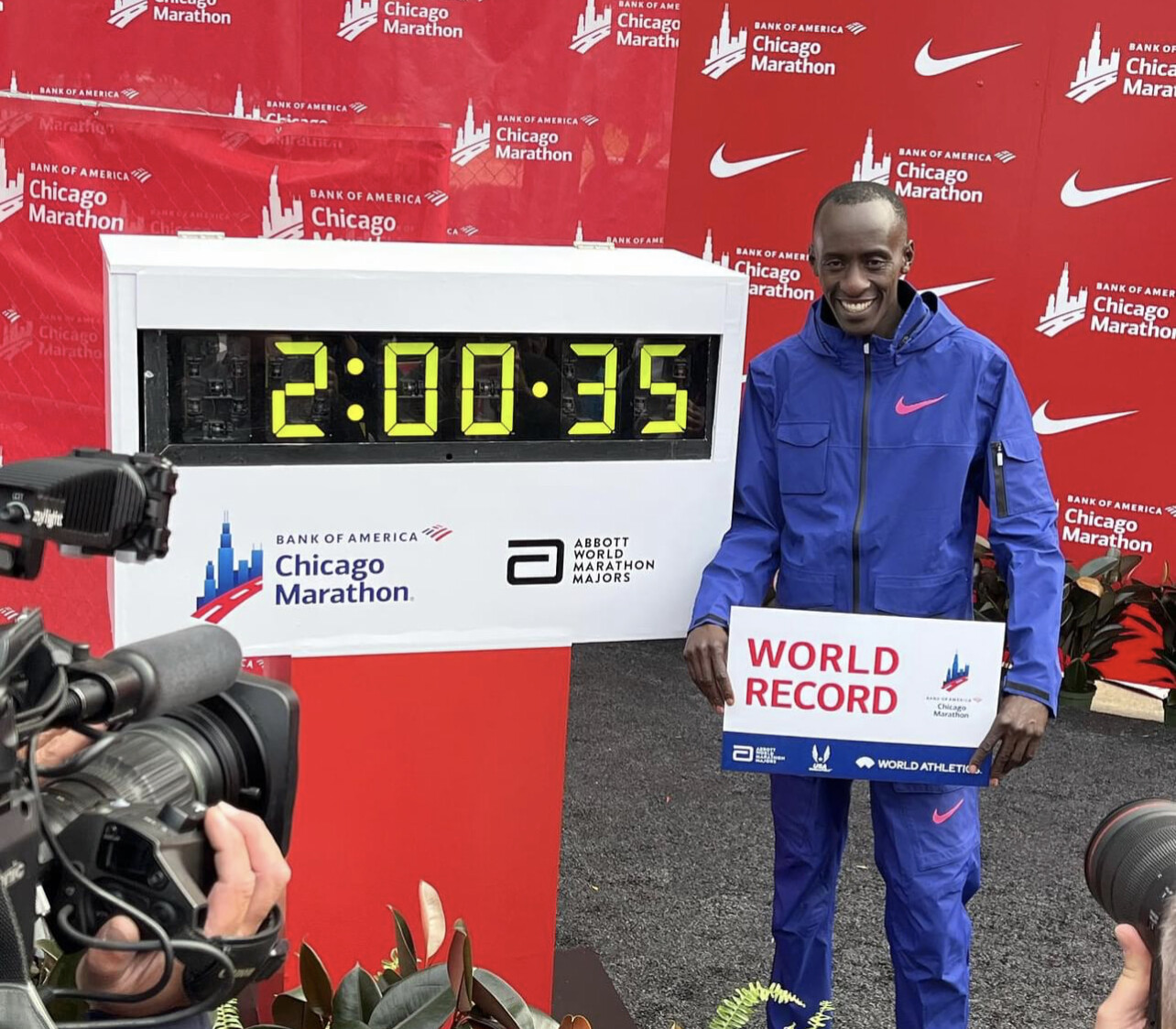
In the third marathon of his career, which began with a 2:01:53 debut in Valencia last December, Kiptum even had enough energy to celebrate his historic performance on the way to the finish line – pointing to the crowds and the tape on his approach.
The 23-year-old broke that tape in 2:00:35, winning the race by almost three and a half minutes. Defending champion Benson Kipruto was second in 2:04:02 and Bashir Abdi was third in 2:04:32.
Kiptum pushed the pace throughout the 26.2-mile race. He broke away from a seven-strong lead group after reaching 5km in 14:26, joined only by his compatriot Daniel Mateiko, who was making his marathon debut. They were on world record pace at 10km, passed in 28:42, but the tempo dropped a little from that point and they reached half way in 1:00:48.
Kiptum had been running in a hat but that came off as they entered the second half of the race. After 30km was passed in 1:26:31, Kiptum kicked and dropped Mateiko. He was glancing over his shoulder but running like he still had the world record – not only the win – in his sights.
A blistering 5km split of 13:51 took him to the 35km checkpoint in 1:40:22 and he was on sub-2:01 pace, 49 seconds ahead of Mateiko.
Continuing to run with urgency, he passed 40km in 1:54:23 – after a 27:52 10km split – and sped up further, storming over the finish line with the incredible figures of 2:00:35 on the clock.
"I knew I was coming for a course record, but a world record – I am so happy,” he said. “A world record was not on my mind today, but I knew one day I would be a world record-holder.”
Despite only having made his marathon debut 10 months ago, Kiptum now has three of the six fastest times in history to his name. Only Kipchoge (with 2:01:09 and 2:01:39) and Kenenisa Bekele (with 2:01:41) have ever gone faster than the slowest of Kiptum’s times.
Mateiko had helped to pace Kiptum to his 2:01:25 win in London, running to the 30km mark. The pair stayed together until that point in Chicago, too, but Mateiko couldn’t maintain the pace and dropped out after reaching 35km in 1:41:11.
Kenya’s Kipruto used his experience of the course to leave the chase group behind after 35km and was a comfortable runner-up in 2:04:02, finishing half a minute ahead of Belgium’s world and Olympic bronze medallist Abdi.
Kenya’s John Korir was fourth in 2:05:09, Ethiopia’s Seifu Tura fifth in 2:05:29 and USA’s Conner Mantz sixth in 2:07:47.
In the women’s race, Hassan returned to marathon action just six weeks on from a World Championships track medal double that saw her claim 1500m bronze and 5000m silver in Budapest.
She was up against a field including the defending champion Ruth Chepngetich of Kenya, who was on the hunt for a record third win in Chicago following her 2:14:18 victory last year.
It soon became apparent that it would be those two athletes challenging for the title. After going through 5km in 15:42 as part of a pack that also featured Kenya’s Joyciline Jepkosgei and Ethiopia’s Megertu Alemu and Ababel Yeshaneh, Chepngetich and Hassan broke away with a next 5km split of 15:23 and reached 10km in 31:05 – on pace to break the recently-set world record.
They ran a 10km split of 30:54 between 5km and 15km, that point passed in 46:36, and they maintained that world record pace to 20km, reached in 1:02:14.
Chepngetich had opened up a six-second gap by half way, clocking 1:05:42 to Hassan’s 1:05:48, but Hassan would have surely felt no concern. On her debut in London in April, after all, she closed a 25-second gap on the leaders despite stopping to stretch twice, and went on to win in 2:18:33.
In a race of superb depth, Alemu, Jepkosgei and Yeshaneh were still on 2:14:52 pace at that point as they hit half way together in 1:07:26.
Hassan soon rejoined Chepngetich at the front and they ran side by side through 25km in 1:18:06. Then it was Hassan’s turn to make a move. Unable to maintain the pace, Chepngetich had dropped 10 seconds behind by 30km, reached by Hassan in 1:34:00, and from there the win never looked in doubt. The Dutch athlete was half a minute ahead at 35km (1:50:17) and she had more than doubled that lead by 40km (2:06:36).
Hassan was on track to obliterate her PB and also the course record of 2:14:04 set by Brigid Kosgei in 2019, which had been the world record until Assefa’s 2:11:53 performance last month.
She held on to cross the finish line in 2:13:44, a European record by almost two minutes. With her latest performance, the versatile Hassan is now the second-fastest woman in history for the track mile, 10,000m and marathon.
"The first group took off at a crazy pace, but I wanted to join that group,” said Hassan. “The last five kilometres, I suffered. Wow – I won again in my second marathon in a fantastic time. I couldn't be happier.”
Behind her, Chepngetich held on for second place in 2:15:37 as the top four all finished under 2:18 – Alemu placing third in 2:17:09 and Jepkosgei finishing fourth in 2:17:23. Ethiopia’s Tadu Teshome was fifth in 2:20:04, her compatriot Genzebe Dibaba sixth in 2:21.47 and USA’s Emily Sisson seventh in 2:22:09.
Leading results
Women1 Sifan Hassan (NED) 2:13:44 2. Ruth Chepngetich (KEN) 2:15:37 3. Megertu Alemu (ETH) 2:17:09 4. Joyciline Jepkosgei (KEN) 2:17:235 Tadu Teshome (ETH) 2:20:046 Genzebe Dibaba (ETH) 2:21:477 Emily Sisson (USA) 2:22:098 Molly Seidel (USA) 2:23:079 Rose Harvey (GBR) 2:23:2110 Sara Vaughn (USA) 2:23:24
Men1 Kelvin Kiptum (KEN) 2:00:352 Benson Kipruto (KEN) 2:04:023 Bashir Abdi (BEL) 2:04:324 John Korir (KEN) 2:05:095 Seifu Tura (ETH) 2:05:296 Conner Mantz (USA) 2:07:477 Clayton Young (USA) 2:08:008 Galen Rupp (USA) 2:08:489 Samuel Chelanga (USA) 2:08:5010 Takashi Ichida (JPN) 2:08:57
by World Athletics
Login to leave a comment
Bank of America Chicago
Running the Bank of America Chicago Marathon is the pinnacle of achievement for elite athletes and everyday runners alike. On race day, runners from all 50 states and more than 100 countries will set out to accomplish a personal dream by reaching the finish line in Grant Park. The Bank of America Chicago Marathon is known for its flat and...
more...Assefa smashes world marathon record in Berlin with 2:11:53, Kipchoge achieves record fifth win
Ethiopia’s Tigst Assefa successfully defended her BMW Berlin Marathon title in style, smashing the world record with 2:11:53* while distance running legend Eliud Kipchoge notched up a record fifth victory at the World Athletics Platinum Label road race in the German capital on Sunday (24).
Assefa took more than two minutes off the women’s world record of 2:14:04, which had been set by Kenya’s Brigid Kosgei at the 2019 Chicago Marathon. Kipchoge, meanwhile, won by 31 seconds in 2:02:42, the fifth-fastest time of his illustrious career.
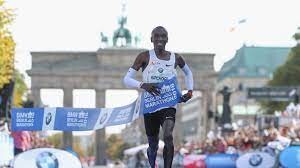
The men’s and women’s races unfolded in contrasting style.
A large pack of the leading contenders ran together through the early stages of the women’s race, passing through 5km in 15:58. 13 women were still in contact with the lead as they passed through 10km in 31:45.
By the time 15km was reached in 47:26, Assefa and compatriot Workenesh Edesa had managed to open up a slight gap on Kenya’s Sheila Chepkirui and Ethiopia’s 2015 world 5000m silver medallist Senbere Teferi and Zeineba Yimer. The first 12 women were strung out, but still within 15 seconds of one another – and all were running inside world record pace.
Sensing that most of her rivals were already starting to fade, Assefa took greater command of the race by throwing in a 2:59 split for the 16th kilometre. By the time she reached 17km, Assefa had dropped Edesa, the last of her opponents, and had just a few male pacemakers for company.
Assefa seemed to grow in confidence – and pace – once she knew she was alone at the front of the pack, and she went on to reach the half-way point in 1:06:20, putting her on track to smash the world record by more than a minute.
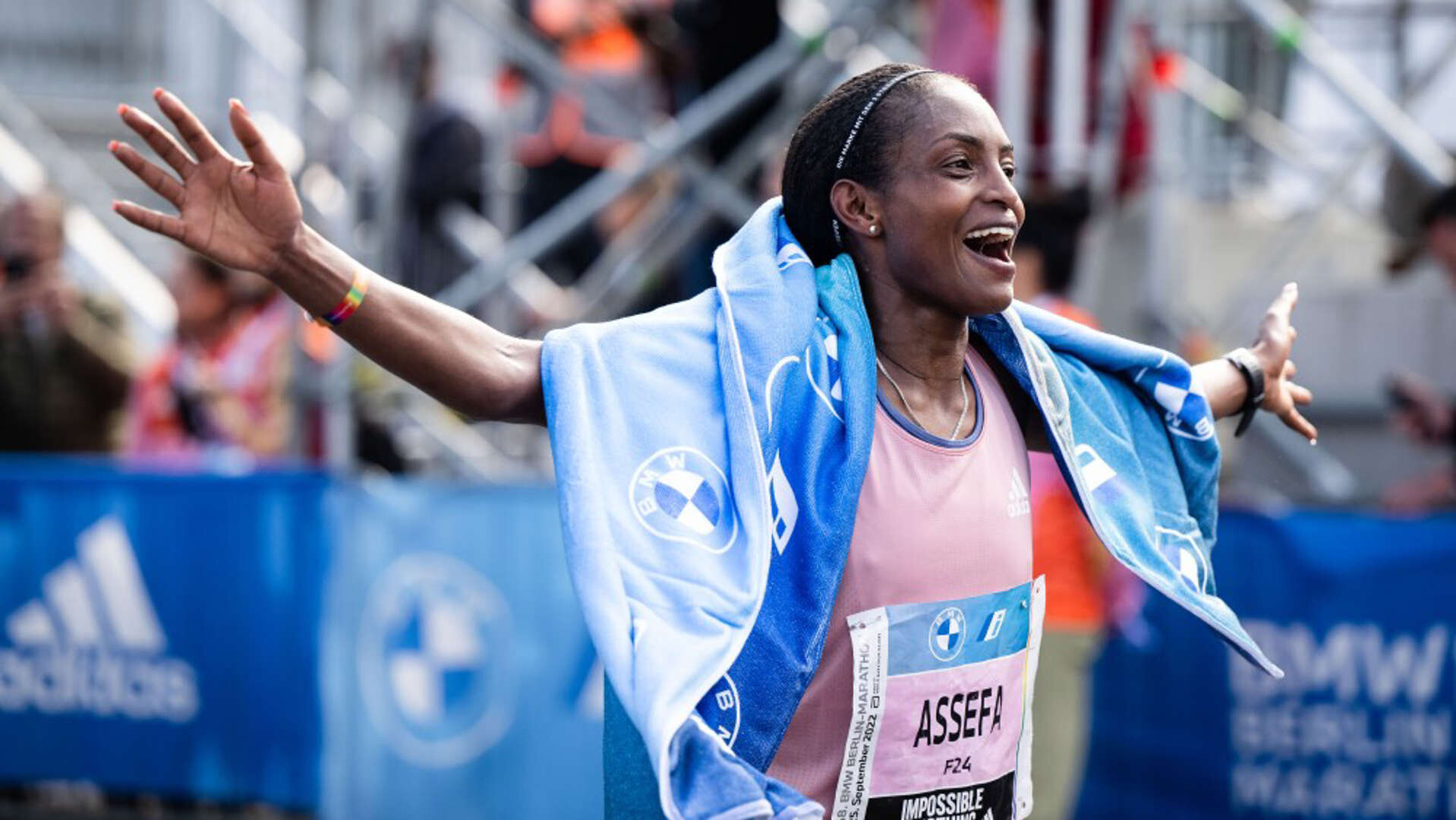
And then she sped up. The next kilometre was covered in 2:48, the fastest of the race up to that point, extending her advantage over Edesa and Chepkirui. Assefa’s 25km split of 1:18:40 was still well inside world record schedule; Chepkirui and Edesa, now almost a minute behind the leader, had dropped off the pace, but were still on course for huge PBs.
Assefa, still looking incredibly relaxed and composed, covered the next 10km segments in a remarkable 31:02, bringing her to 35km in 1:49:41. Her 30km split was 1:34:12, the second-fastest mark in history for that checkpoint (behind Ruth Chepngetich’s 1:34:01 from the 2022 Chicago Marathon).
But while Chepngetich faded badly in that race last year, Assefa went from strength to strength in the closing stages in Berlin.
She got to 40km in 2:05:13, following another 15:32 5km split, putting her on course for a finishing time in the 2:12 range. Spurred on by the knowledge that the world record was in the bag, Assefa picked up her pace in the closing kilometres and charged through the finish line in 2:11:53.
Chepkirui held on to second place in 2:17:49, while Tanzania’s Magdalena Shauri made a remarkable breakthrough to take third place in 2:18:41, a huge national record.
A record eight women finished inside 2:20.
Berlin victory no.5 for Kipchoge
Kipchoge may not have improved on his own world record, but he added to his legacy on the streets of Berlin by achieving a record fifth win, clocking 2:02:42.
The two-time Olympic champion eventually won by 31 seconds, but for most of the race he had company in the surprising form of Ethiopia's Derseh Kindie.
The duo made an early break from the rest of the field, reaching 5km in 14:12 with a 15-second margin over the rest of the elite men. By 10km, reached in 28:27, they were operating at exactly 2:00:00 marathon pace and more than half a minute ahead of the seven-man chase pack.
Kipchoge and Kindie continued to run together at world record schedule through the half-way point, reached in 1:00:22, but the pace started to drop soon after. By the time they got to 25km (1:11:48), they were no longer on schedule to break Kipchoge's record of 2:01:09 set last year in Berlin.
But records weren't Kipchoge's main concern; he had company in the form of a relatively unheralded runner up to 30km (1:26:25), so his attention was primarily on securing victory.
At about 31km into the race, Kipchoge increased his tempo and, with a cursary glance over his shoulder to see if Kindie was able to follow, knew it was enough to see off his opponent. The Kenyan great was alone in front at last, while Kindie continued for another minute or so before stepping off the course.
Kipchoge still had more than 10km to go, but his lead was comfortable and his form was controlled and relaxed. He went on to win in 2:02:42, while a fast-finishing Vincent Kipkemoi came through to take second place in 2:03:13. Ethiopia's Tadese Takele was third in 2:03:24.
A record nine men finished inside 2:05 and 15 finished inside 2:06, making it the deepest men's marathon in history. There were national records for Germany's Amanal Petros (ninth in 2:04:58) and Switzerland's Tadesse Abraham (11th in 2:05:10).
Login to leave a comment
Wow! Berlin always delivers. Imagine smashing a world record by this margin! - Bob Anderson 9/24 8:52 am |
BMW Berlin Marathon
The story of the BERLIN-MARATHON is a story of the development of road running. When the first BERLIN-MARATHON was started on 13th October 1974 on a minor road next to the stadium of the organisers‘ club SC Charlottenburg Berlin 286 athletes had entered. The first winners were runners from Berlin: Günter Hallas (2:44:53), who still runs the BERLIN-MARATHON today, and...
more...Focus shifts from track as road racing season heats up
As the international outdoor track and field season draws to a close, we now look forward to the feast of top-class road racing that will be on offer throughout the final four months of the year.
In just 11 days’ time, the focus of the sport will be on the World Athletics Road Running Championships Riga 23, where the best distance runners on the planet will compete for global honours in the mile, 5km and half marathon.
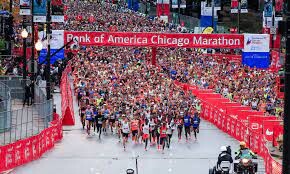
The likes of world champion Faith Kipyegon, world record-holder Berihu Aregawi and Olympic champion Peres Jepchirchir are among the stars set to compete in the Latvian capital. Recreational runners from around the world, meanwhile, will run on the same courses as the greats when they take to the streets of Riga for the associated mass races.
There are also eight Platinum Label road races between September and December, the first of which was held last weekend with Betsy Saina and Othmane El Goumri winning the Blackmores Sydney Marathon. Of the seven other upcoming Platinum events, three of them form part of the Abbott World Marathon Majors (WMM) series: the BMW Berlin Marathon, the Bank of America Chicago Marathon and the TCS New York Marathon.
Platinum Label road races, Sep-Dec 2023
8 Oct – Chicago Marathon (WMM)
15 Oct – Amsterdam Marathon
5 Nov – New York Marathon (WMM)
26 Nov – Shanghai Marathon
3 Dec – Valencia Marathon
17 Dec – Bang Saen Half Marathon
The Chicago Marathon two weeks later will be highlighted by a clash between defending champion Ruth Chepngetich and London Marathon winner Sifan Hassan.
Two-time Tokyo Marathon champion Birhanu Legese, the fourth-fastest marathon runner of all time, headlines the men’s field for the Amsterdam Marathon. Defending champion Evans Chebet will take on two-time winner Geoffrey Kamworor at the New York City Marathon in November.
For the first time since the Covid-19 pandemic, the Shanghai Marathon in late November will welcome an international elite field.
Just one week later, multiple global champion and world record-holder Joshua Cheptegei will make his long-awaited marathon debut in Valencia. In recent years the event has established itself as one of the highest-quality marathons in the world, and this year’s edition will surely be no exception.
Towards the end of the year, the Thai coastal area of Bang Saen will host one of the newest additions to the Platinum Label calendar, the Bangsaen21 Half Marathon. Since the pandemic, it has been largely a domestic affair, but it will be back with a bang this year with a high-quality elite line-up.
Hundreds of road races each year are granted a World Athletics Label, ranging from ‘Platinum’, for the top tier of road events, to Gold, Elite and Label. There are still more than 100 World Athletics Label road races due to take place between now and the end of 2023.
Login to leave a comment
Berlin Marathon: will the women’s course record fall again?
Ethiopia’s Tigist Assefa will be aiming for the course record once more in Berlin on Sunday, in the deepest elite field in the race’s 49-year history, including seven runners with sub-2:20 personal bests.
In 2022, Assefa astounded fans by improving her best by over 18 minutes, taking more than two and a half minutes off the course record with her time of 2:15:37, and earning the unique status of the only woman to break sub-two minutes for the 800m and sub 2:20 for the marathon.
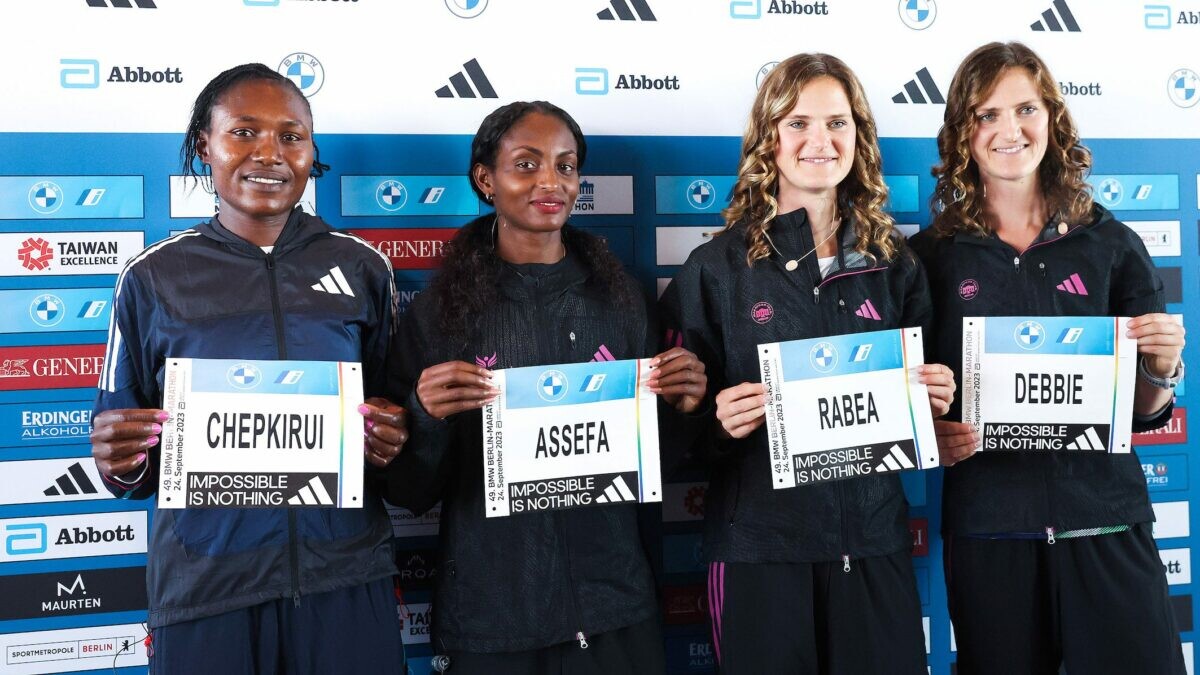
“I’m delighted to be running again in Berlin,” 26-year-old Assefa said at the elite women’s press conference on Thursday. “Last year’s race proved an unexpected success for me. I think I can run even faster on Sunday, a further improvement would be a success,” she said.
Will Assefa be setting her sights on the world record of 2:14:04? She felt that might be too ambitious: “Much can happen so I cannot say at the moment what would be the halfway split,” she said on Thursday. “I want to improve my time but I am not thinking about the world record.”
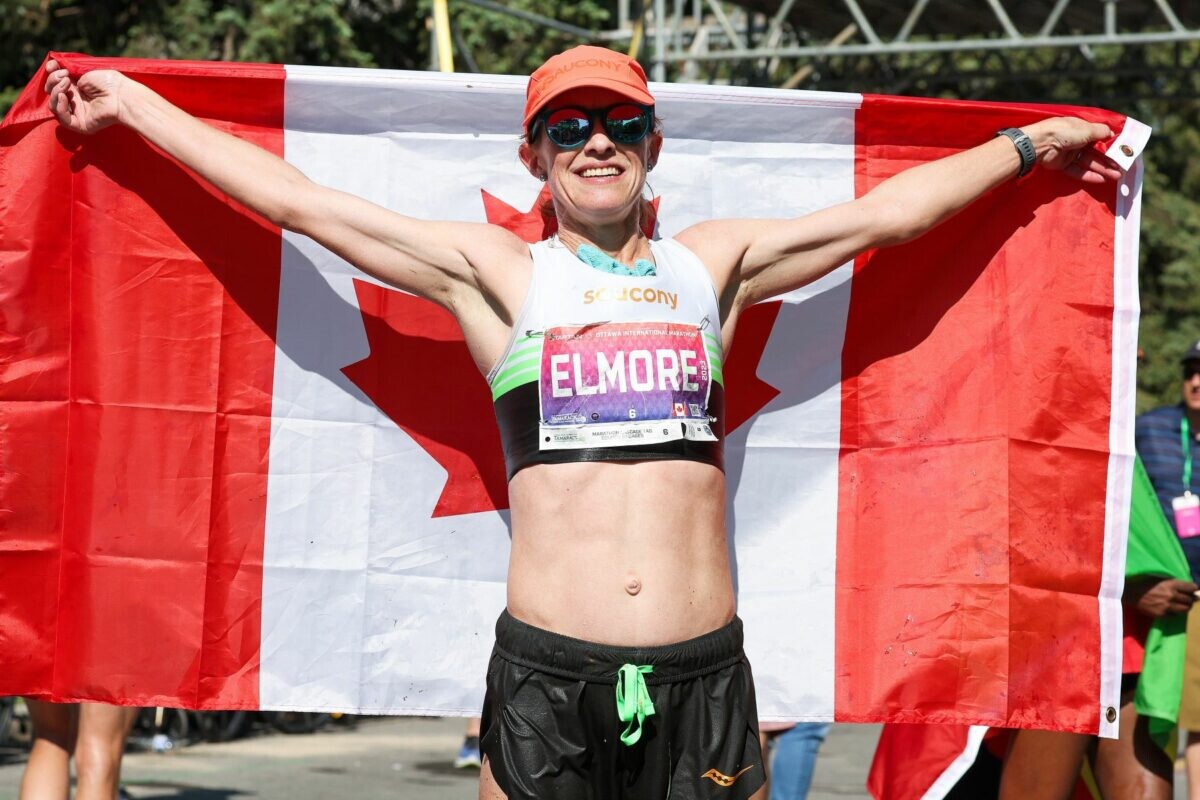
Assefa will face a serious challenge from Kenya’s Sheila Chepkirui, who set a new course record at the 2022 Berlin Half Marathon in a blistering 65:02. She also took third in a speedy Valencia Marathon in 2:17:29, and ran 2:18:51 in London in April for fourth place. “My aim is to break my personal best. I can imagine going through the first half on Sunday in around 68 minutes,” she said.
Challenges could also come from Assefa’s compatriots Tigist Abayechew, third in Berlin in 2022, Hiwot Gebrekidan, second in Berlin in 2021 and Workenesh Edesa, who was fourth last year. “The women’s course record of 2:15:37 is an absolute world-class time,” said the race director Mark Milde. “But, given the strong field, we hope that this can be broken.”
Many of the elite field will simply be hoping to achieve the Olympic standard of 2:26:50.
Canada’s Malindi Elmore will toe the line
Malindi Elmore of Kelowna, B.C. looks to be in fine form to run on the same course where Natasha Wodak broke Elmore’s Canadian marathon record last year. In May, Elmore threw down a gutsy performance at the 2023 Tartan Ottawa International Marathon, where her goal was to get the Olympic standard; she was on pace through 30K and sitting in fourth position. Over the final 12 kilometres, she moved up two spots to finish second, but missed the standard by less than a minute. It seems unlikely she plans to reclaim her Canadian record (which is three minutes faster than the Olympic standard) this weekend, but as all marathon fans know, anything can–and usually does–happen.
A record number of 47,912 runners from 156 nations have entered the 49th edition of the BMW Berlin Marathon. Germany’s most spectacular road race is part of the Abbott World Marathon Majors (AWMM) and is also a Platinum Label Road Race of World Athletics. The men’s press conference will be held on Friday, September 22.
by Keeley Milne
Login to leave a comment
BMW Berlin Marathon
The story of the BERLIN-MARATHON is a story of the development of road running. When the first BERLIN-MARATHON was started on 13th October 1974 on a minor road next to the stadium of the organisers‘ club SC Charlottenburg Berlin 286 athletes had entered. The first winners were runners from Berlin: Günter Hallas (2:44:53), who still runs the BERLIN-MARATHON today, and...
more...10 Things to Know About the 2023 Berlin Marathon
Here’s how you can watch the race, track runners, and register for next year
More than 45,000 runners are expected to participate in the Berlin Marathon on September 24 in Germany’s capital city. It’s the 49th edition of the race and one of the six World Marathon Majors races along with races in Chicago, New York, Boston, London and Tokyo. The weather forecast is calling for cloudy and cool conditions on race morning in Berlin, so fast times are once again expected.
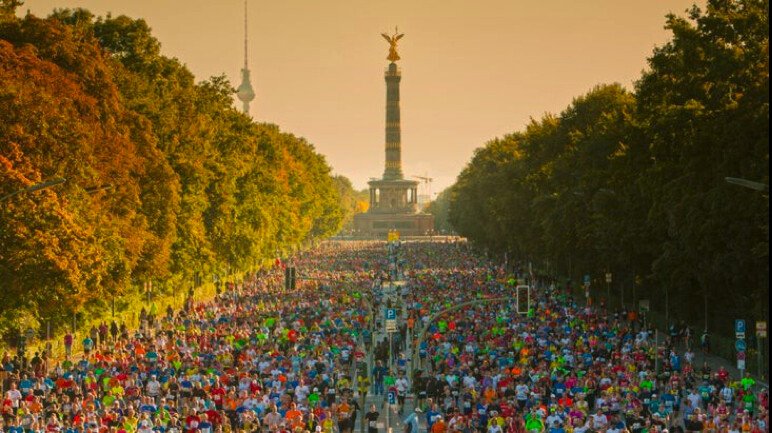
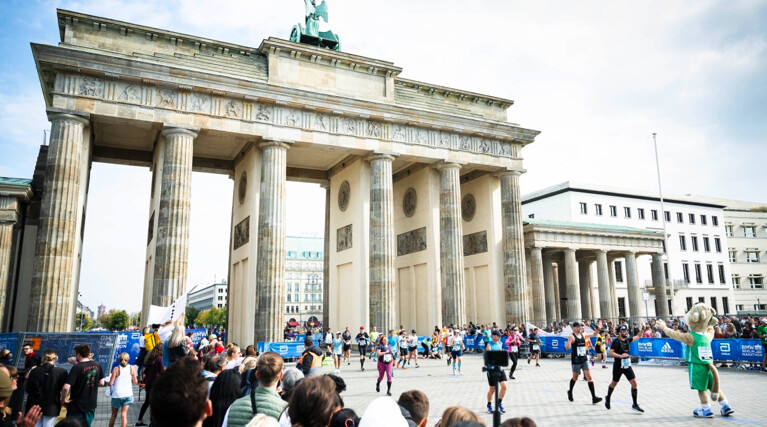
Here’s a rundown of 10 noteworthy elements about this year’s race.
The Berlin Marathon has produced 12 world records—more than any other marathon—since its inception in 1974, including the past eight men’s records since 2003. Kenya legend Eliud Kipchoge lowered the world record for the fastest official marathon ever run (2:01:09) last year in Berlin, and it’s also where he ran the previous world record (2:01:39) in 2018.
Berlin has produced six of the top 10 fastest men’s times in history, including three of the four sub-2:02 efforts (including the 2:01:41 run by Kenenisa Bekele in 2019). It hasn’t been quite as fast for women, however it has been the site of three women’s world records, most recently when Japan’s Naoko Takahashi ran the world’s first sub-2:20 marathon (2:19:46) in 2001. Last year, Ethiopia’s Tigst Assefa won the women’s race in 2:15:37, which, at the time, was the second-fastest marathon ever run and now ranks fifth.
Berlin is the flattest course of all the World Marathon Majors, with a total elevation gain of 241 feet and loss of 260 feet. (The biggest “hills” come between miles 16 and 20, but they max out at less than 30 feet of gain.) Berlin annually produces some of the fastest pro results in the world, in part because it’s a flat course, but also because the race organization provides pacemakers (auxilliary runners who set an optimal pace but only run about a portion of the course before dropping out) so the opportunity for fast times are assured. (There are no pacemakers at the Chicago, New York City Marathon, and Boston Marathon, so those races play out only by the tactics of the runners in the field.) But the fast elite times, flat course, and typically cool weather conditions have attracted age-group runners targeting new PRs, too.
Running legend Eliud Kipchoge, universally accepted as the G.O.A.T. of marathoning, has won 15 of the 18 marathons he has entered, including the past two Olympics. Berlin is where he’s had most of this success, dating back to his first victory in 2015 and he has since also won there in 2017, 2018, and 2022. Can he add one more victory to his total?
He lowered his own world record to 2:01:09 last year by averaging 14:21.4 per 5K, or 4:37 per mile. However, the 38-year-old Kenyan is coming off an uncharacteristically disappointing race at the 2023 Boston Marathon, where he finished sixth in 2:09:23. Will he approach another world record? “My aim is to always run a good race,” he said recently. “Berlin is like home for me. In view of the Olympic Games next year in Paris, I thought about which race could be the best preparation for the Games for me, and Berlin is the best option.”
Including Kipchoge, the men’s field in Berlin includes 10 runners who have run faster than 2:06 and seven more who have broken 2:07, including last year’s runner-up Mark Korir (2:05:58). Kipchoge should be challenged by fellow Kenyan Amos Kipruto, who owns a 2:03:13 from his runner-up showing at last year’s Tokyo Marathon. The winner of the 2022 London Marathon last fall (2:04:39), Kipruto, 31, placed a distant second in the 2018 Berlin Marathon behind Kipchoge (2:06:23) and owns a bronze medal in the marathon from the 2019 World Athletics Championships in Doha.
Other top runners in the field include Kenya’s Geoffrey Kamworor, who ran 2:04:23 to place second at the London Marathon in April, Ethiopia’s Birhanu Legese, who was second (2:02:48) in Berlin in 2019 and Kenya’s Wilson Kipsang, 41, a former winner in Berlin, New York, and Tokyo. However, Kipsang, who lowered the world record to 2:03:23 on the Berlin course in 2013, is coming off a four-year ban for missing drug tests in 2018 and 2019.
Last year, Ethiopia’s Tigist Assefa, a 2016 Olympian in the 800-meter run, entered the race as an untested marathon (with a PR of 2:34:01) and surprised everyone with her 2:15:37 victory in the third-fastest time ever.The 26-year-old is back this year but hasn’t run any races because she’s been sidelined with a few nagging injuries.
Her biggest competitor will likely be Sheila Chepkirui, who holds a personal best of 2:17:29 from last December’s Valencia Marathon. She’s a former African Cross Country Championships winner and was the bronze medalist in the 10,000-meter run at the 2022 Commonwealth Games. Other top women runners include Ethiopians Tigist Abayechew (2:18:03), Workenesh Edesa (2:18.51), and Hiwot Gebrekidan (2:19:10).
Scott Fauble, a three-time seventh-place finisher at the Boston Marathon (including this year in 2:09:44), is racing Berlin with the hopes of securing the Olympic-qualifying standard of 2:08:10. The 31-year-old runner from Portland, Oregon, will still need a top-three finish at the U.S. Olympic Trials Marathon on February 4 in Orlando, but securing the time will give him a leg up on qualifying for the Paris Olympics next summer.
Also racing in Berlin are 2016 U.S. Olympian Jared Ward (Provo, Utah) and 2020 U.S. Olympian Jake Riley (Boulder, Colorado). Ward, 35, owns a 2:09:25 personal best, but he hasn’t run faster than 2:12 since his sixth-place finish (2:10:45) in the New York City Marathon in 2019. The 34-year-old Riley, who owns a 2:10:02 PR, is coming back after having double Achilles surgery in July 2022 to correct Haglund’s syndrome (the second time in his career), and hopes to run in the 2:12-2:14 range. Ethiopian-born Teshome Mekonen, who recently received U.S. citizenship, will also be racing in Berlin. The 28-year-old, who lives in New York City, has a 1:00:02 half-marathon personal best and lowered his marathon personal best to 2:11:05 last January in Houston.
Annie Frisbie is the top American runner in the women’s field in Berlin. The 26-year-old from Hopkins, Minnesota, made her marathon debut at the 2021 New York City Marathon with an impressive seventh-place finish (2:26:18). She’s continued to run well since then, placing 20th (2:28:45) in the 2023 Boston Marathon (2:28:45) and most recently finishing fifth (1:07:27) at the U.S. 20K Championships on September 4 in New Haven, Connecticut. Frisbie was a Wisconsin state champion runner in high school and an All-American runner for Iowa State University.
The Berlin Marathon was started in 1974 by Horst Milde, a German baker and running enthusiast. When it began at the height of the Cold War and East Berlin being sealed off by a wall, the marathon was run only in West Berlin. Since 1990, it has started and ended near the Brandenburg Gate, sending runners on a jagged loop through the city—including the neighborhoods of Charlottenburg, Tiergarten, Moabit, Mitte, Friedrichshain, Kreuzberg, Neukölln, Schöneberg, Friedenau, and Zehlendorf. Runners will pass tourist sites like the Reichstag building, the Siegessäule (Victory Column), Berlin Cathedral, and Potsdamer Platz. Live music is played at more than 60 locations along the course, including at all the famous landmarks.
The inaugural Berlin Marathon had 244 finishers; 234 men and 10 women, and was won by Günter Hallas (2:44:53) and Jutta von Haase (3:22:01), respectively. Last year, the race had 34,788 finishers, including 23,280 men (67 percent) and 11,508 women (33 percent). The last German runners to claim victory were Irina Mikitenko (2:19:19) in 2008 and Ingo Sensburg (2:16:48) in 1980. No American man or woman has ever won the Berlin Marathon.
The Berlin Marathon has an inline skating division for 500 participants that begins at 3:30 P.M. after all runners are cleared from the course. The skater course record of 56:46 was set last year by Belgian Bart Swings, and he’s back this year aiming for his ninth victory. In the women’s race, all eyes are on last year’s winner, Marie Dupuy of France, in 1:11:19. All finishers of the inline skating division are eligible to enter the 2024 Berlin Marathon as runners.
The race, which starts at 9:15 A.M. local time (or 3:15 A.M. ET in the U.S.), will be broadcast worldwide by several TV partners, but not in North America. However, several websites offer live streaming so people can watch the Berlin Marathon from anywhere in the world, especially if you’re a VPN subscriber. Watch Athletics will be broadcasting the race online in real time for free, while FloTrack’s livestream requires a subscription ($29.99 for one month) in order to view their livestream. Runners can be tracked via the Berlin Marathon website’s Results page, or via the BMW Berlin Marathon App app available on Apple or Google Play.
Race day begins with the elite handbike division at 8:50 A.M., followed by the wheelchair and handcycle divisions at 8:57 A.M. Runners are sent off in four waves beginning at 9:15 A.M., starting with the men’s and women’s elite waves. The race has a strict time limit of 6 hours, 15 minutes as well as course closure times at the 33K/20.5-mile mark (3:50 P.M.) and 38K/23.6-mile mark (4:35 P.M.). Runners who have not reached those points by those times can continue on the sidewalks alongside the course or get a ride on the course-sweeping bus.
Entry to the 2024 Berlin Marathon, which is slated for September 29, 2024, will be done via a lottery that will open in October. You can enter the lottery as a solo runner or as a team consisting of two or three people. (If the team is drawn, all persons from the team are included.) Lottery dates for 2024 have not yet been announced, but the draw for the 2023 edition took place in December 2022.
If you’re selected, the registration fee will be about $160 euros. You can also secure a guaranteed spot in the race based on previous marathon times. In 2023, female runners up to 44 years old qualified if they ran faster than 3:00; female runners up to 59 years old qualified if they ran under 3:20; and female runners over 60 years qualified if they ran under 4:10. For men, the qualifying times were 2:45 (up to 44 years old), 2:55 (46-59 years old), 3:25 (60 and older.)
If you don’t get in through the lottery, you may still be able to get into the race via a charity bib or through tour operators.
by Outside online
Login to leave a comment
Chepkirui hunting for new PB in Berlin showdown with Ethiopia's Tigest Assefa
Kenyan Sheila Chepkirui and Ethiopian Tigest Assefa gear up for the Berlin Marathon showdown, aiming to break records and secure Olympics
Kenyan marathoner Sheila Chepkirui is preparing to compete in the women's contest at the 2023 Berlin Marathon against a formidable Ethiopian lineup, led by the defending champion, Tigest Assefa.
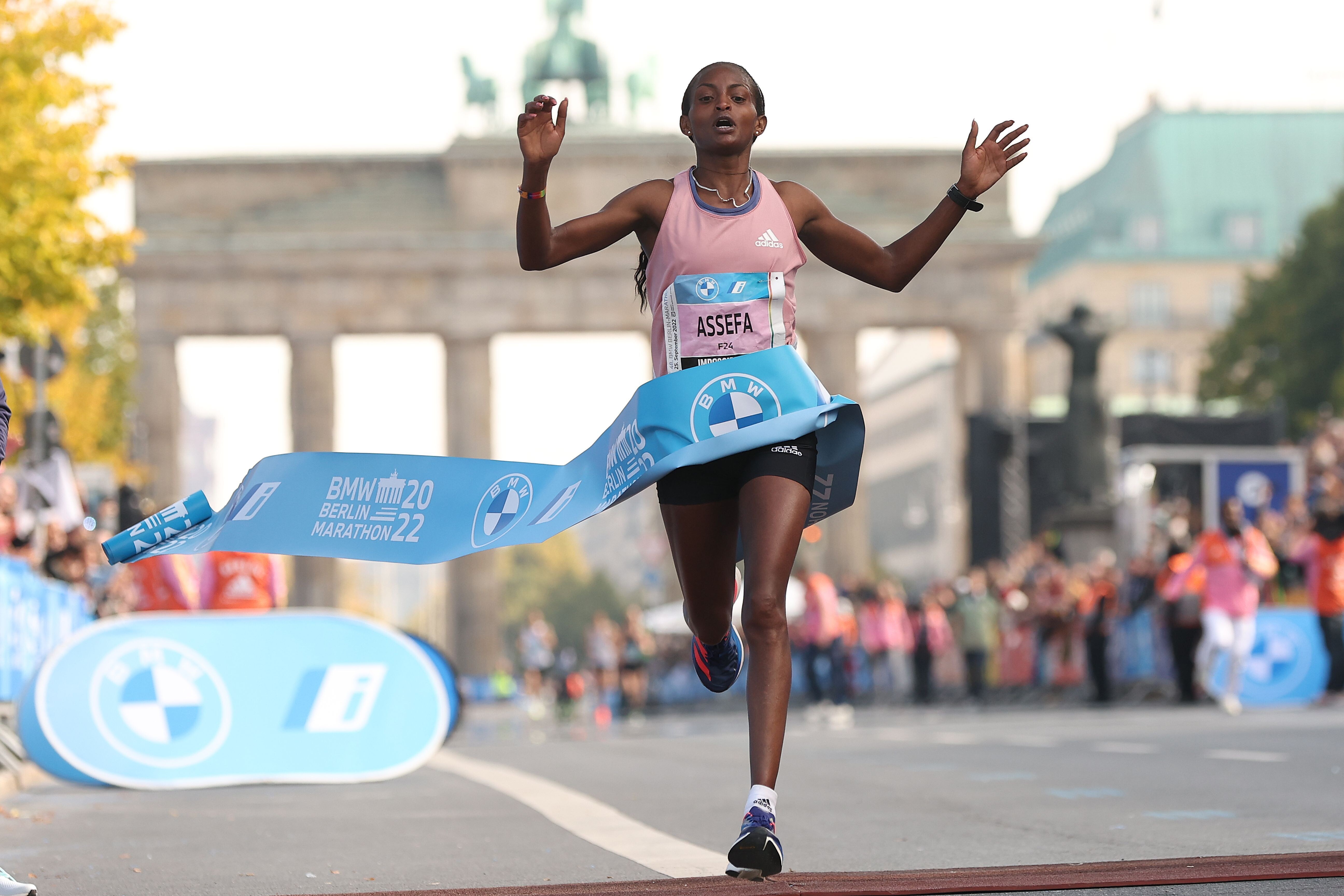
Chepkirui, who finished fourth at the London Marathon last April, carries an impressive personal best of 2:17:29 from the Valencia Marathon last year.
Assefa made headlines last year by posting an incredible time of 2:15:37 at the Berlin Marathon, setting a new course record and establishing herself as one of the fastest marathon runners in history.
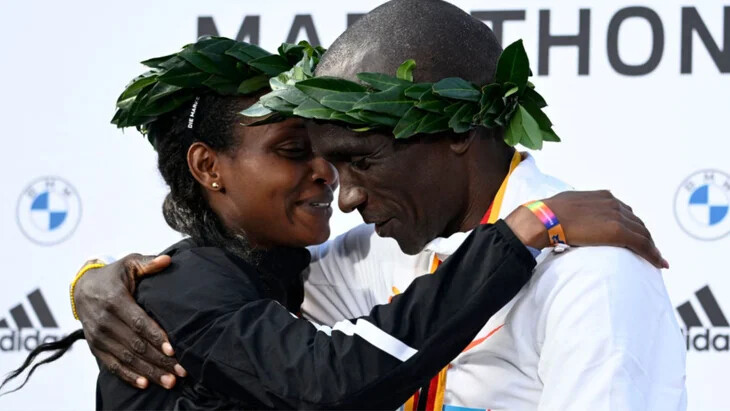
Chepkirui, a Kenya Defence Forces soldier and a former Africa cross country champion, has already proven her mettle on the international stage by clinching the 10,000m bronze medal at the 2022 Commonwealth Games in Birmingham, UK.
Ethiopian runners dominate the list of fastest women's runners at this year's Berlin Marathon, with Tigist Abayechew (2:18:03), Workenesh Edesa (2:18:51), and Hiwot Gebrekidan (2:19:10) all boasting impressive sub-2:20 times. Amane Beriso, the winner of last year's Valencia Marathon, adds further depth to the Ethiopian contingent.
However, all eyes will be on Chepkirui, who hails from Kiptere Secondary School in Kericho and boasts a remarkable half marathon personal best of 64:36. Her determination to excel is evident, as she aims to make up for her absence at the Boston Marathon last April due to visa issues.
Chepkirui, who runs under the Ikaika Sports stable, is the sole Kenyan representative in the Berlin Marathon after Margaret Wangare withdrew due to injury. Her marathon journey began at last year's Valencia Marathon, where she impressed with a third-place finish and a personal best time of 2:17:29. Now, she is focused on breaking her own record.
"My aim is to break my personal best. I can imagine going through the first half on Sunday in around 68 minutes," said the 32-year-old Chepkirui.
Tigst Assefa, the defending champion, is also eager to make her mark once again in Berlin. Reflecting on her remarkable performance last year, where she shattered the course record, Assefa expressed her delight at returning to the event.
"Last year's race proved an unexpected success for me. I think I can run even faster on Sunday, a further improvement would be a success," said Tigst Assefa.
While she remains focused on improving her time, she is cautious about discussing the world record of 2:14:04.
Both Chepkirui and Assefa have an additional goal in the BMW Berlin Marathon: securing Olympic qualifying times. Given the fierce competition in Ethiopia and Kenya, achieving the necessary times for Olympic qualification will require exceptional performances.
Two more Ethiopian athletes, Tigist Abayechew with a personal best of 2:18:03 and Workenesh Edesa with a best time of 2:18:51, are making their return to Berlin. Last year, they, along with Tigst Assefa, achieved an unofficial world team record of 6:52:31.
Mark Milde, the race director, expressed optimism about the potential for records to be broken, saying, "The women's course record of 2:15:37 is an absolute world-class time. But, given the strong field, we hope that this can be broken."
The elite women's field at the Berlin Marathon boasts both breadth and depth. Japan's Hitomi Niiya, with a personal best of 2:19:24, has the potential to challenge her national record set 18 years ago on the same course. Another athlete to watch is Ethiopian Senbere Teferi, a world record holder for 5km on the road with a time of 14:29.
In addition to the international competition, a fierce contest is expected among German women. The German contingent, featuring athletes like the Schöneborn twins, Deborah and Rabea, Domenika Mayer, Kristina Hendel, and Laura Hottenrott, has a strong presence with personal bests ranging from 2:25 to 2:27.
by Festus Chuma
Login to leave a comment
BMW Berlin Marathon
The story of the BERLIN-MARATHON is a story of the development of road running. When the first BERLIN-MARATHON was started on 13th October 1974 on a minor road next to the stadium of the organisers‘ club SC Charlottenburg Berlin 286 athletes had entered. The first winners were runners from Berlin: Günter Hallas (2:44:53), who still runs the BERLIN-MARATHON today, and...
more...Runners Will Chase Historic Times at 2023 Publix Atlanta Half Marathon
A run for records will take place at the Publix Atlanta Half Marathon next week where some of the world’s best runners will attempt to complete the fastest half marathon ever run in the state of Georgia. This year’s elite field features eight men who have run faster than the current men’s record of 1:00:36 and four women who have run faster than the women’s record of 1:08:22. Both times were set at this event in 2022.
Nicholas Kosimbei will return to Atlanta to defend his title and his record. The 26-year-old from Kenya dominated last year’s race which was held in the driving rain, winning by more than two minutes. Fellow Kenyans Raymond Magut and Goeffrey Koech who placed second and third respectively last year are also returning. Magut boasts a personal best of 1:00:00 while Koech has broken the one-hour mark with a career best of 59:36. Koech won his most recent half marathon, the B.A.A.Half Marathon in Boston last November.
“I love the course in Atlanta,” said Kosimbei. “I am looking forward to returning and my goal is to break my own course record.”
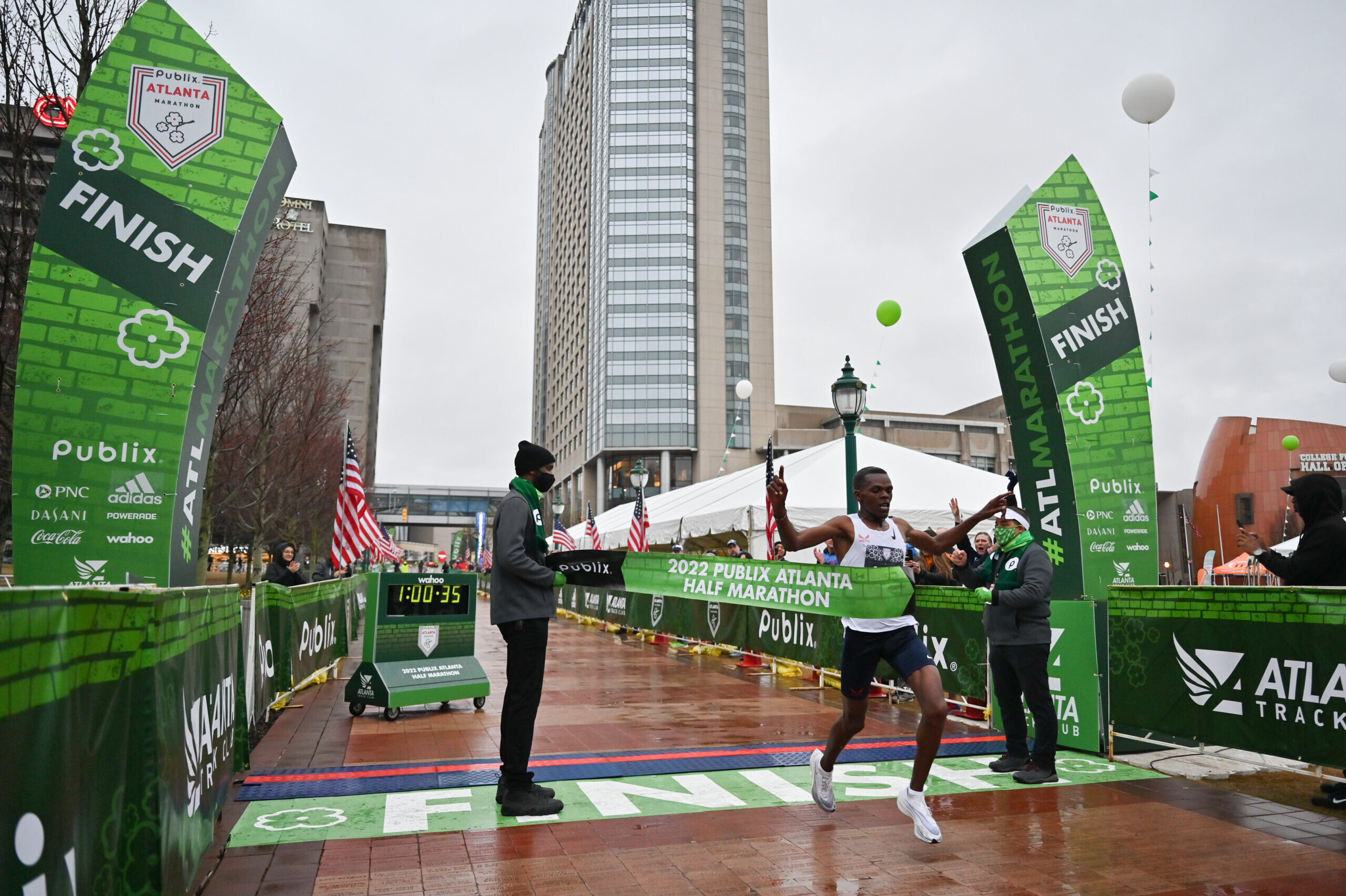
Other top contenders include Tsegay Kidanu (Ethiopia, 59:39), Josphat Tanui (Kenya, 59:40), Phenus Kipleting (Kenya, 1:00:08) and Bethwell Yegon (Kenya, 1:00:57), the runner-up at the 2021 BMW Berlin Marathon.
With last year’s winner Dorcas Tuitoek not returning in 2023, a new face will break the tape to win the women’s title. The fastest woman in the field is Kenya’s Cynthia Jerotich. Jerotich was a dominant force on the roads from 2013 to 2016, setting a half marathon personal best of 1:06:04 and winning a silver medal at the World Half Marathon Championships in 2016. Jerotich stepped away from racing in 2017 and gave birth to three children before returning to competition last year. At 33, she will be looking to return to the form that saw her winning road races around the world including some of the most prestigious events in the United States.
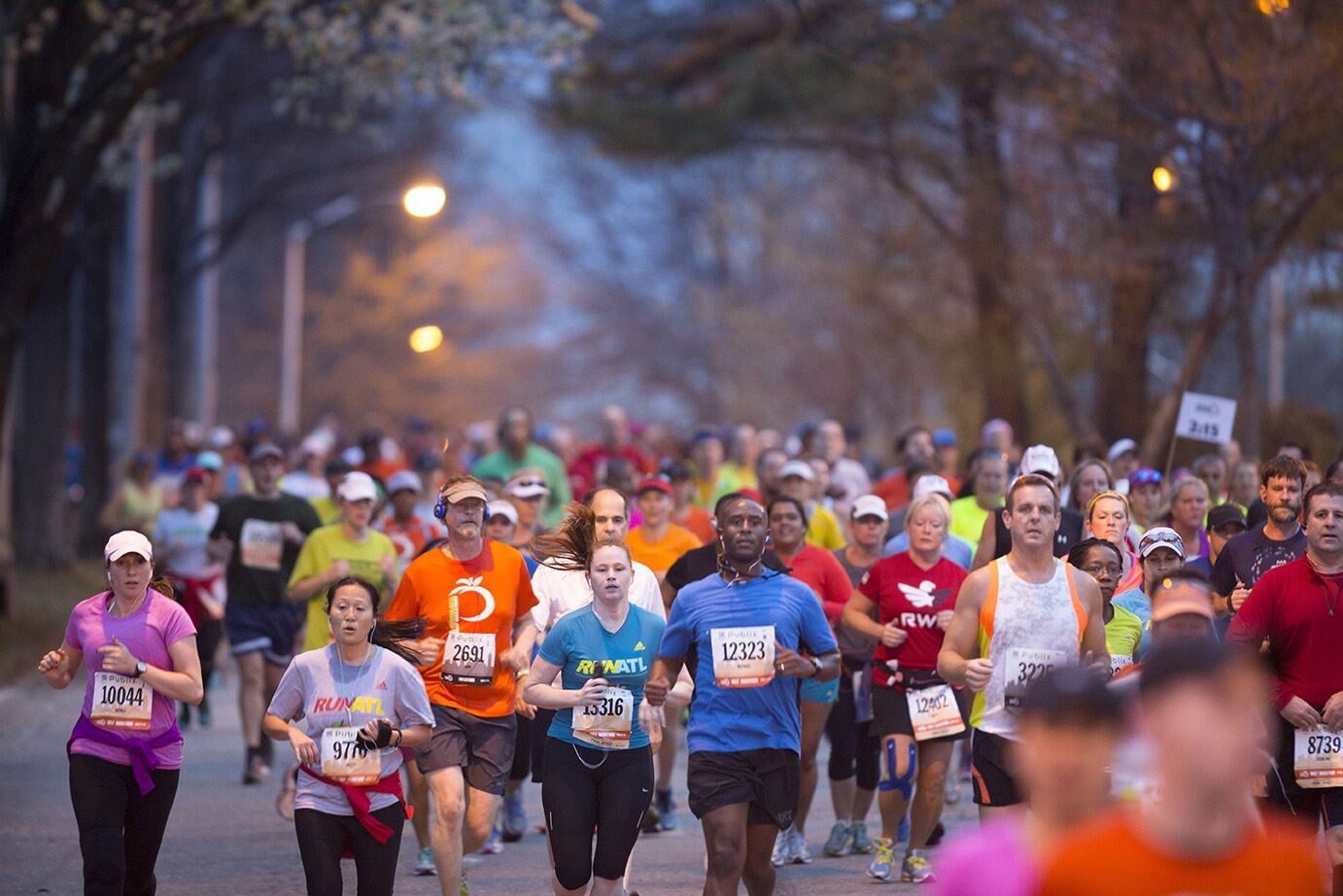
Jerotich will face Helah Kiprop, the winner of last year’s Copenhagen Marathon and the runner-up at the Frankfort Marathon. Kirprop, a 2016 Olympian from Kenya, has a half marathon personal best of 1:07:39. Also among the fastest in the field are 2017 Houston Half Marathon winner Veronica Wanjiru (Kenya, 1:07:58) and Vibian Chepkirui (1:08:02). Chepkirui won the Vienna Marathon last year in a course record time of 2:20:59.
Athletes in the 2023 Publix Atlanta Half Marathon will be competing for a $22,000 prize purse including a first place prize of $4,000. There is an additional $2,500 bonus for the male or female winner who sets the course and Georgia all-time record. Full elite fields can be found below. The race will be streamed live on Atlanta Track Club’s YouTube page with commentary from Chris Chavez, Carrie Tollefson and Ali Feller.
About Atlanta Track Club
Atlanta Track Club is a nonprofit committed to creating an active and healthy Atlanta. Through running and walking, Atlanta Track Club motivates, inspires and engages the community to enjoy a healthier lifestyle.
With more than 30,000 members, Atlanta Track Club is the second largest running organization in the United States. In addition to the AJC Peachtree Road Race (peachtreeroadrace.org) – the largest 10K running event in the world, the Publix Atlanta Marathon, PNC Atlanta 10 Miler and Invesco QQQ Thanksgiving Day Half Marathon, Atlanta Track Club directs more than 30 events per year. Through the support of its members and volunteers, Atlanta Track Club also maintains a number of community initiatives including organizing and promoting the Kilometer Kids youth running program to metro Atlanta youth, honoring high school cross country and track and field athletes through Atlanta Track Club’s All-Metro Banquets and supporting the Grady Bicycle EMT program. For more information on Atlanta Track Club, visit atlantatrackclub.org.
by Running USA
Login to leave a comment
Publix Georgia Marathon
The Publix Georgia Marathon & Half Marathon is the perfect opportunity to visit the city of Atlanta. Atlanta's ONLY marathon, the event is a must do for adventure marathoners looking to cover all 50 states. A true Southeast tradition, you'll experience the spirit of the city as you travel through four college campuses, ten welcoming neighborhoods and dozens of iconic...
more...Allie Kieffer makes quick work for her 3M Half Marathon win, while Joseph Gray wins a close one
World-class runner Allie Kieffer keeps a low racing profile here in Austin, but when she does race, she wins.
A last-minute entry in this year's 3M Half Marathon, Kieffer took advantage of ideal running conditions Sunday morning — mid-40s and clear — to add another victory to her Austin racing résumé, while Joseph Gray, a World Mountain Running champion, topped the men’s field.
Even though Kieffer has a perfect record in Austin, Sunday's 3M win was somewhat of a redemption for her. Running in the highly competitive Barron Collier Companies Naples Half Marathon last week in Florida, she went off course, losing her lead and placing fourth.
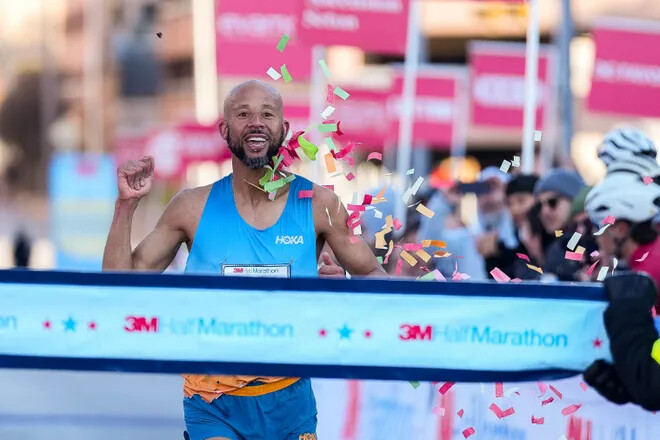
“I took a wrong turn at the Naples Half, so I couldn’t cross the line first,” Kieffer said. “So today I was thinking, ‘I want to win.' I was feeling pretty competitive.
“I wasn’t intending to race today,” she added. “Initially I was just going to pace it with a friend, but I couldn’t find him at the start.”
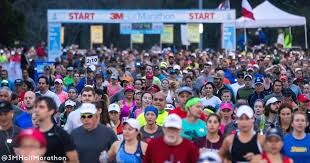
Kieffer took off from the starting line on Stonelake Boulevard in North Austin at a brisk pace of 5 minutes, 52 seconds per mile, with Karen Bertasso-Hughes and Shannon Gaden about 50 yards back. Kieffer hit the 5-kilometer split in 18:14, with Bertasso-Hughes just nine seconds behind.
The 3M race is known for its “downhill to downtown” course, and Kieffer worked every downhill. By the 10K mark (36:31) on Great Northern Boulevard, she had a 23-second lead on Bertasso-Hughes.
“When I took the lead around 3 miles, I just didn’t look back,” Kieffer said.
She stepped on the gas after the 15K mark (9.3 miles) on Shoal Creek Boulevard, dropping the pace to 5:50 a mile, gaining more than a minute ahead of Bertasso-Hughes in the process. Kieffer crossed the finish line on San Jacinto Boulevard in 1:16:24, leaving Bertasso-Hughes and Gaden to battle for second. Gaden prevailed 1:17:00 to 1:17:49. Caroline Brooks came in fourth in 1:17:53, with Elizabeth Laseter rounding out the top five in 1:18:04.
“Allie was so far ahead that we were just racing for second place,” said Gaden, a newcomer to Austin by way of Denver. “I was able to catch her (Bertasso-Hughes) around 10 miles.”
“I’m really happy. … I felt surprisingly good. I needed to win this race,” said Kieffer, who plans to run the Ascension Seton Austin Half Marathon next month and is looking to run an Olympic Marathon Trials qualifying time next fall at the BMW Berlin Marathon.
The men’s race featured a stirring duel between Colorado Springs’ Gray and Austin’s Mitch Ammons, a 2024 Olympic Marathon Trials qualifier.
Gray, Ammons and University of Texas ace Kobe Yepez formed the lead pack in the early miles, passing through the 5K mark together in 15:17. But after that it was a two-man race as Gray and Ammons pulled away. Ammons took the lead at 10K, passing the mark in 30:33, just six seconds ahead of Gray. But by 15K (45:52) they were stride for stride, with 2019 3M champ Michael Morris moving into third place ahead of Yepez.
In a sprint to the finish line, Gray edged Ammons 1:04:23 to 1:04:27. Morris, the track and cross-country head coach at San Marcos High School, took third in 1:06:07, with Al Maeder fourth in 1:06:31 and Yepez fifth in 1:06:51.
“This was my first race of the year. Actually my first race in a while, so I wanted to be smart and run a progressive effort,” said Gray, a dominant figure in Colorado’s mountain running scene. “Mitch is a strong runner and made it an honest effort.”
Approximately 4,500 runners finished the race, the fifth in the Austin Distance Challenge. The sixth and final event is the Austin Marathon on Feb. 19.
“I found out two minutes before the race that there was a champion mountain runner entered, who’d gone 1:03 for the half-marathon," Ammons said. "We were yo-yoing back and forth the whole way. He’d pull ahead on the uphills, and I’d lead on the downhills. It was a lot of fun. My time was a personal best for me by more than a minute, and I wouldn’t have run this fast if it weren’t for Joe. He pushed me a lot. I really, really tried to catch him on the final straight. I gave it everything I had.”
by Brom Hoban
Login to leave a comment
3M Half Marathon
Welcome to the 3M Half Marathon! This year join over 7,000 fellow runners in Austin, Texas to run a personal best at the 3M Half Marathon. 3M Half is a fun and fast stand-alone half marathon boasting one of the fastest half marathon courses in the country. You’ll enjoy a point-to-point course with mostly downhill running that takes you past...
more...London Marathon to host Eliud Kipchoge as special guest
Eliud Kipchoge, who smashed his own marathon world record in Berlin on Sunday is expected here this weekend to present medals to the winners of the age group championships events in the new TCS Mini London Marathon on Saturday, the day before the TCS London Marathon, organisers have announced.
In a statement, the TCS London Marathon said Kipchoge — the four-time London Marathon champion who clocked two hours, one minutes and nine seconds at the BMW Berlin Marathon to take 30 seconds off the world record he set in the same race in 2018 — will present the medals to the UK’s top young athletes racing over the final 2.6 kilometres of the famous course.

“This year is a landmark one for the TCS Mini London Marathon. The first edition of the new mass participation TCS Mini London Marathon follows the championships races on Saturday, when thousands of children and young people of all abilities, aged from four to 17, will take part in either 2.6K or one-mile events on the same finishing stretch of the TCS London Marathon course,” the statement said.
“I really support the initiative of the TCS London Marathon to promote running at all ages. I like running to be a family activity since running is life. It will bring joy, happiness and health to our children, who are the future, so let’s all embrace this,” Kipchoge, who is an Ambassador for the TCS Mini London Marathon, said.
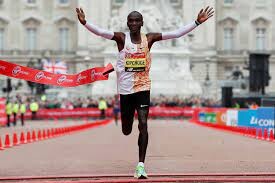
GOAT of marathon
Hugh Brasher, Event Director of the TCS London Marathon, said: “We are thrilled that Eliud, our four-time champion, will be with us this weekend. He is, without doubt, the GOAT of marathon running and will be a huge inspiration to everyone taking part in the TCS Mini London Marathon on Saturday.”
by Ayumba Ayodi
Login to leave a comment
TCS London Marathon
The London Marathon was first run on March 29, 1981 and has been held in the spring of every year since 2010. It is sponsored by Virgin Money and was founded by the former Olympic champion and journalist Chris Brasher and Welsh athlete John Disley. It is organized by Hugh Brasher (son of Chris) as Race Director and Nick Bitel...
more...Eliud Kipchoge sets new world marathon record in Berlin clocking 2:01:09
Eliud Kipchoge sliced half a minute from his own world record to win the BMW Berlin Marathon, clocking a sensational 2:01:09 at the World Athletics Elite Platinum Label road race on Sunday (25).
There was also a stunning breakthrough for Ethiopia’s Tigist Assefa in the women’s race as she smashed the course record by more than two minutes with 2:15:37, becoming the third-fastest woman in history.
Just when it seemed Kipchoge had achieved everything he possibly could over the classic distance, the legendary pushed the world record further out of reach for the rest of the distance-running world.
Unlike his last world record run, the double Olympic champion went out hard on this occasion, passing through 5km in 14:14 and 10km in 28:22 – not just comfortably inside world record pace, but also well inside a projected two-hour finish.
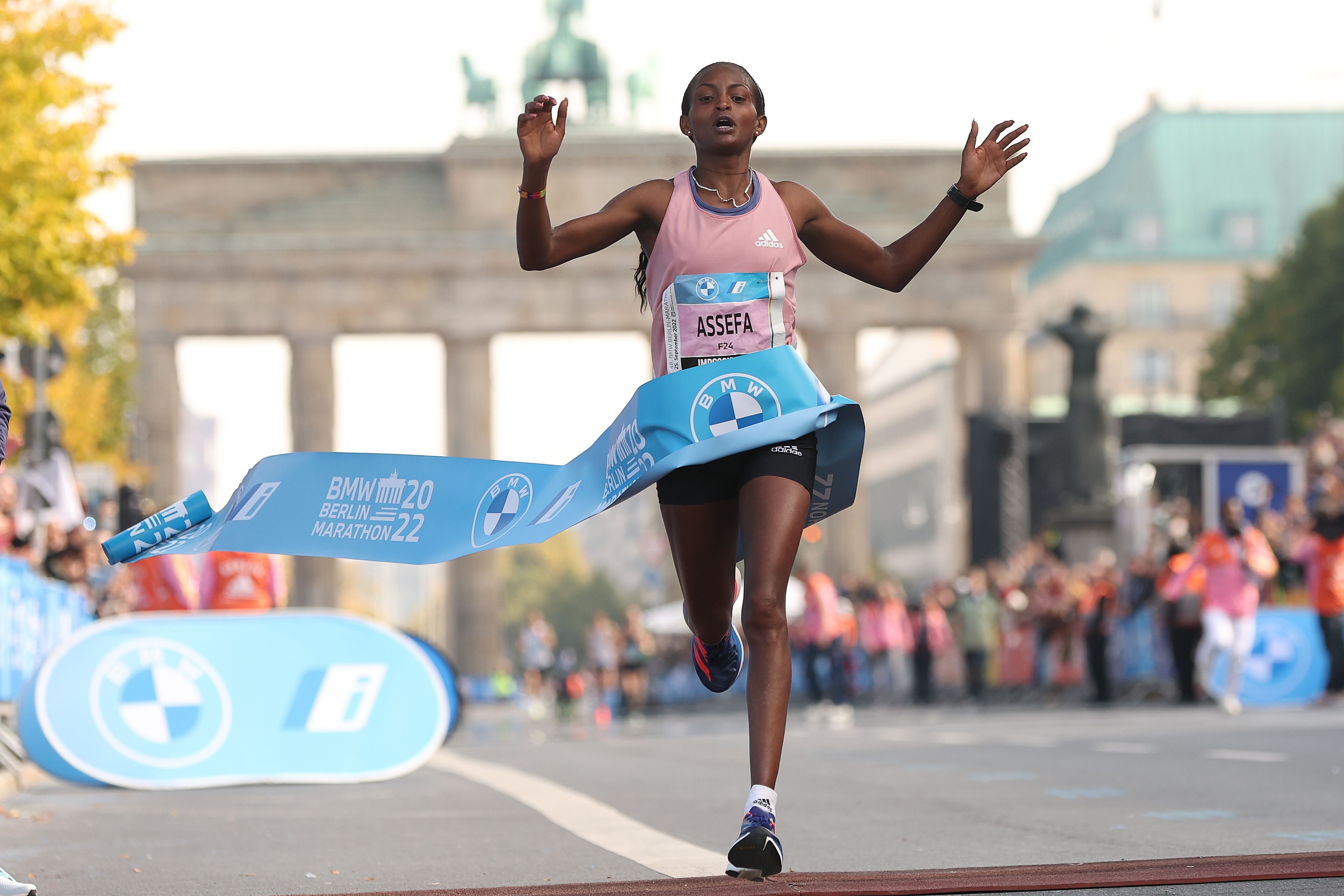
Kipchoge maintained that pace through half way, which was reached in 59:50, but his pace started to drop slightly from then on, and by 25km (1:11:08) his projected finish had slipped to just outside two hours – still more than a minute inside world record pace, though.
Ethiopia’s Andamlak Belihu was just about staying level with Kipchoge up until this point, but the Kenyan superstar then gradually pulled clear and was out on his own.
He passed through 30km in 1:25:40, then reached 35km in 1:40:10. By the time he passed through 40km in 1:54:53, his lead had grown to move than four minutes with Mark Korir having moved into second place.
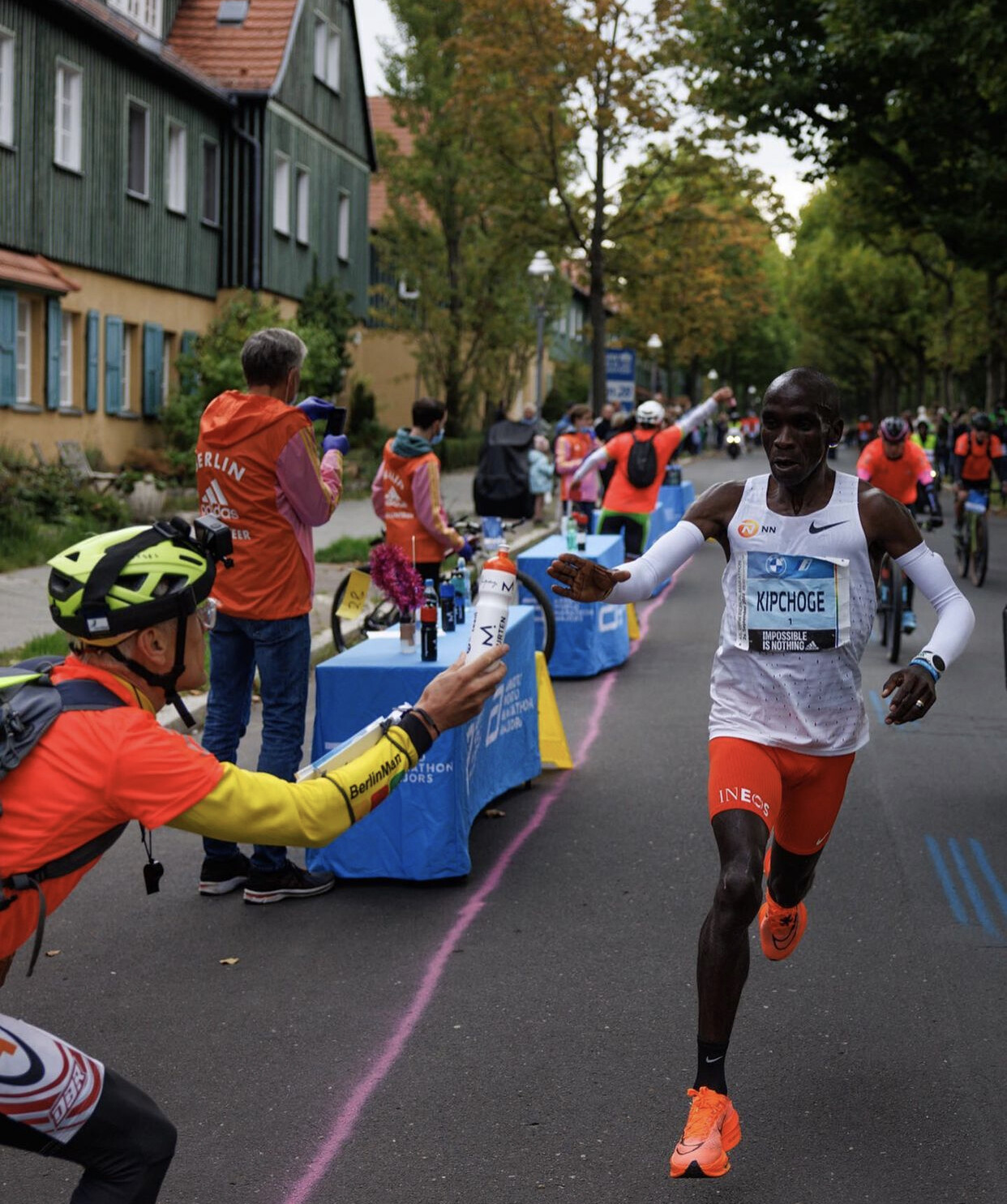
His victory – and world record – nor a formality, Kipchoge went on to cross the line in 2:01:09, taking 30 seconds off the world record he set in the German capital four years ago. Korir held on to second place in 2:05:58 and Ethiopia’s Tadu Abate came through to finish third in 2:06:28.
"I am overjoyed to have broken the world record in Berlin," said Kipchoge. "I wanted to run the first half so fast. No limitations.
"After 38km I knew I would be capable of breaking the world record. The circumstances were great, and so was the organisation of the event. I’m really happy with today and impressed by the fans and their support."
By contrast, several runners were in contention for most of the women’s race. A group of six women passed through half way in 1:08 - well inside course record pace – but by 30km, reached in 1:36:41, just three women remained at the front: Assefa, along with Ethiopian compatriots Tigist Abayechew and Meseret Gola.
Despite running significantly quicker than she ever had done before, Assefa – a former 800m specialist – maintained her relentless pace and opened up a gap of about 20 seconds by 35km.
She continued to pull away from the rest of the field and crossed the line in an Ethiopian record of 2:15:37 – a time that has only ever been beaten by world record-holders Brigid Kosgei (2:14:04) and Paula Radcliffe (2:15:25).
Kenya’s marathon debutante Rosemary Wanjiru came through to take second place in 2:18:00, finishing just three seconds ahead of Abayechew.
Leading results
Women
1. Tigist Assefa (ETH) 2:15:37 2. Rosemary Wanjiru (KEN) 2:18:00 3. Tigist Abayechew (ETH) 2:18:03 4. Workenesh Edesa (ETH) 2:18:51 5. Meseret Gola (ETH) 2:20:58 6. Keira D'Amato (USA) 2:21:48 7. Rika Kaseda (JPN) 2:21:55 8. Ayuko Suzuki (JPN) 2:22:02 9. Sayaka Sato (JPN) 2:22:13 10. Vibian Chepkirui (KEN) 2:22:21
Men
1. Eliud Kipchoge (KEN) 2:01:09 2. Mark Korir (KEN) 2:05:58 3. Tady Abate (ETH) 2:06:28 4. Andamlak Belihu (ETH) 2:06:40 5. Abel Kipchumba (KEN) 2:06:49 6. Limenih Getachew (ETH) 2:07:07 7. Kenya Sonota (JPN) 2:07:14 8. Tatsuya Maruyama (JPN) 2:07:50 9. Kento Kikutani (JPN) 2:07:56 10. Zablon Chumba (KEN) 2:08:01
by World Athletics
Login to leave a comment
BMW Berlin Marathon
The story of the BERLIN-MARATHON is a story of the development of road running. When the first BERLIN-MARATHON was started on 13th October 1974 on a minor road next to the stadium of the organisers‘ club SC Charlottenburg Berlin 286 athletes had entered. The first winners were runners from Berlin: Günter Hallas (2:44:53), who still runs the BERLIN-MARATHON today, and...
more...US record holder Keira d’Amato and Kenyan Nancy Jelagat Meto head Women’s Field At BMW Berlin Marathon Sept 25
The American record holder Keira d’Amato and Kenya’s Nancy Jelagat Meto lead a high quality women’s field for the 48th edition of the BMW BERLIN-MARATHON on Sunday, September 25. Keira d’Amato improved the US record to 2:19:12 which also gives her the accolade of the fastest in the women’s field, announced by the organisers today. Eight women will be on the start line with personal bests of under 2:21.
The return of Kenya’s double Olympic champion and world record holder Eliud Kipchoge had already been announced some weeks ago as well as the participation of the current BMW BERLIN-MARATHON champion Guye Adola of Ethiopia. Six men on the start lists have personal bests of under 2:06while the organisers SCC EVENTS expect more than 45,000 runners from around 150 countries for Germany’s top road race. The BMW BERLIN-MARATHON is an Abbott World Marathon Majors race and a Platinum Label Road Race, awarded by World Athletics, the international governing body of the sport.
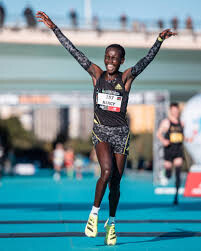
“After securing the presence of Eliud Kipchoge and Guye Adola, we are delighted also to have a very strong women’s field on the start line. With the right weather conditions there is certainly a good chance of very fast times,” said race director Mark Milde.
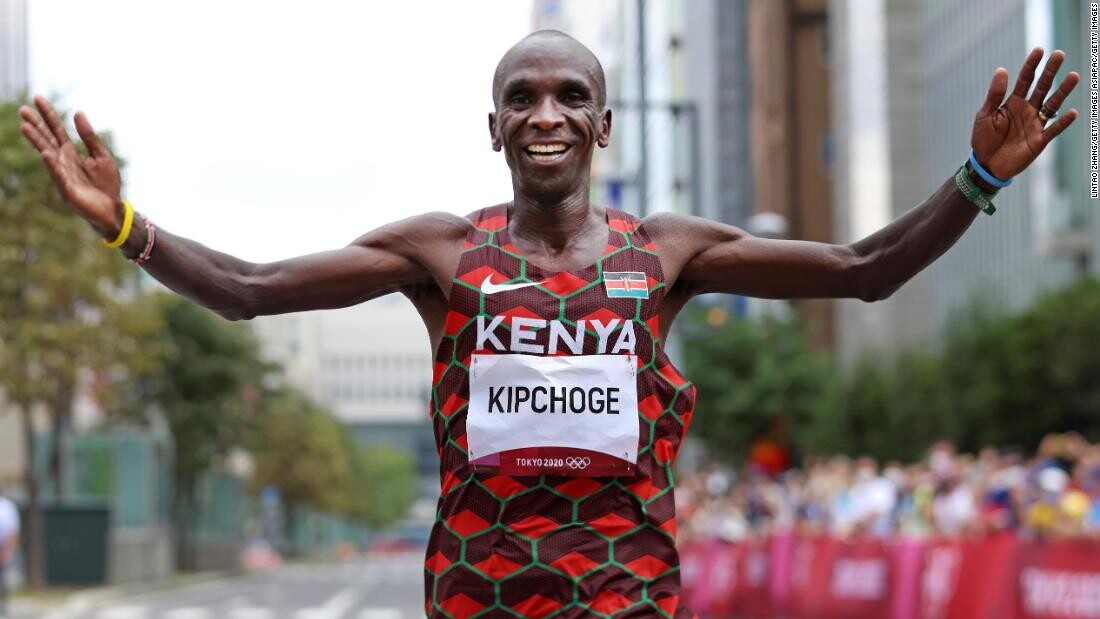
The presence of Keira d’Amato and Nancy Jelagat Meto brings to the event two women who have already run sub-2:20. At the age of 37, Keira d’Amato sprang a major surprise to break the American record with 2:19:12 in winning the Houston Marathon. That led to her late nomination for the World Championships in Eugene where she ran impressively to finish eighth. Sara Hall, who plans to run Berlin and then New York as well, went even better, finishing fifth.
Hall’s best time is 2:20:32. Nancy Jelagat Meto showed fine form in the past year, winning the prestigious Valencia title with a major improvement of 2:19:31. Four months previously she made a strong showing with second place in 65:21 at the GENERALI BERLIN HALF MARATHON.
Quite a few women runners will hope to put Berlin’s fast course, where Eliud Kipchoge set the current men’s world record of 2:01:39 in 2018, to good use in their bid to break 2:20: Gutemi Shone Imana has a best of 2:20:11 while Workenesh Edesa has run 2:20:24 and a third Ethiopian, Sisay Gola, has clocked 2:20:50. The Kenyans also have their contenders to break this landmark time in Maurine Chepkemoi, currently with a best of 2:20:18 and Vibian Chepkirui, who won the Vienna City Marathon in 2:20:59 in April.
Nor should marathon debutants be overlooked in the search for potential women winners, given that the Ethiopian Gotytom Gebreslase did just that to win last year’s BMW BERLIN-MARATHON title. Two possible contenders are Rosemary Wanjiru of Kenya and Ethiopia’s Nigisti Haftu. Both have strong performances at half marathon to their credit which could make them realistic challengers.
Login to leave a comment
BMW Berlin Marathon
The story of the BERLIN-MARATHON is a story of the development of road running. When the first BERLIN-MARATHON was started on 13th October 1974 on a minor road next to the stadium of the organisers‘ club SC Charlottenburg Berlin 286 athletes had entered. The first winners were runners from Berlin: Günter Hallas (2:44:53), who still runs the BERLIN-MARATHON today, and...
more...The road to racing's return
Athletes have hit the ground running when it comes to the return of mass road race action, but what has it taken to stage some of the world’s most prestigious events in the current climate?
A total of 10 top-tier World Athletics Elite Platinum Label road races – including marathons in Berlin, London, Chicago, Boston, Amsterdam, New York and Valencia – have taken place in 2021, with many of the world’s leading athletes joined on the city streets by significant mass fields.
In addition, around 30 World Athletics Elite Label and 50 World Athletics Label races will have been held around the world, with many protocols and procedures in place to ensure the health and safety of participants.
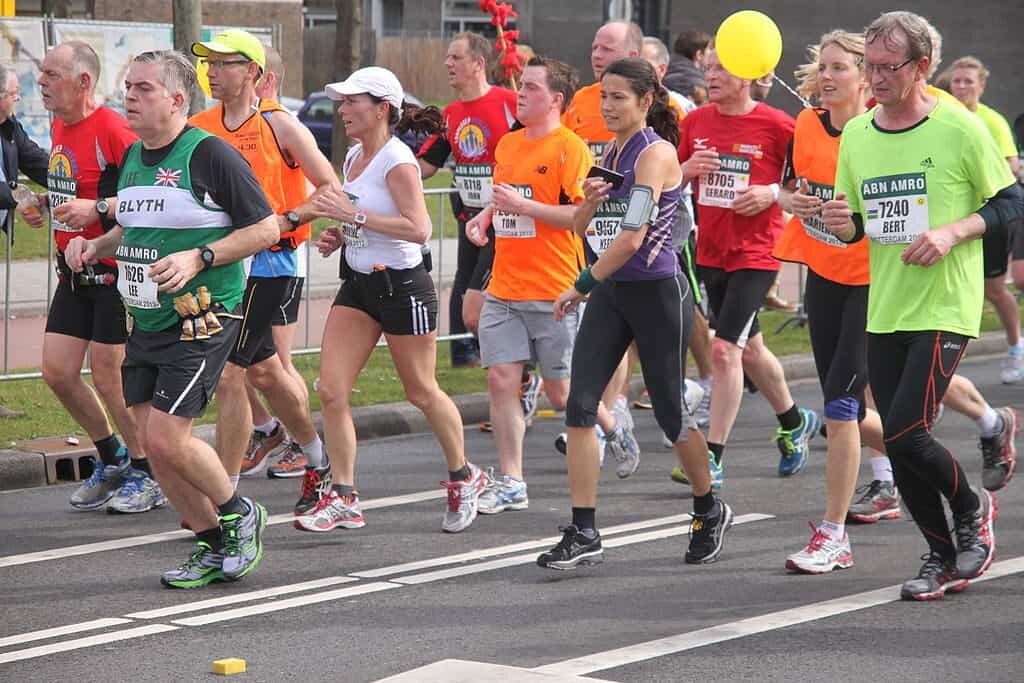
While some measures, such as Covid testing and reduced or more spread-out fields, were obvious, huge work was also done behind the scenes by organizers to allow these races to return.
“We were asking a lot from our participants this year, in order for us to be sure we could get the event on, come what may,” said London Marathon communications director Penny Dain. “We put protocols in place that we had never done before, to make the event Covid safe. We went out to our participants outlining these in our Six Steps to the Start Line campaign, and asking for their help, support and understanding that yes, it is different, but by helping us do this, it means we can be sure the event goes ahead.
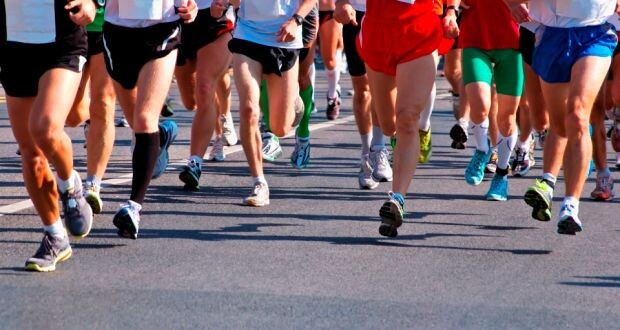
“It was genuinely a truly special day,” added Dain, with the traditional April event having taken place as an elite-only race in 2020 before a second consecutive October running this year, featuring 35,000 mass race finishers. “It had been 889 days since we had last delivered the London Marathon and to have that back – to see the joy, the emotion, the crowds – it was special.
“We are working together to encourage people back. It’s all about the importance of mass participation events and parkrun in terms of what regular exercise does for physical and, almost more importantly, mental health.”
Six Steps to the Start Line
Among the earlier steps taken by London Marathon organizers was to ask participants to update their predicted finishing times to enable the effective organization of the many waves. On race day, organizers started people over 90 minutes in waves of 1000, meaning the density of the runners on the course was spaced out because of the seeding.
Official kit bags were sent to runners to drop off at the Running Show in advance, removing the need for baggage trucks at the start areas – reducing dwell time and crowding at the start – as well as a lot of the infrastructure at the finish.
A negative lateral flow test was required in order to drop off kit bags and collect bib numbers in the days leading up to the race and random additional checks for further negative results were also done at the start on race day. Participants were asked to bring only one supporter to reduce crowds and the mass race did not feature any pacers.
The London Marathon is far from alone in having protocols such as these in place, and many more procedures were undertaken for both the elite and mass events.
“Generally, the optimism and determination was always there to make it happen, but always in combination with knowing that it had to happen safely,” added Dain. “We were always very attuned to what was going on in the world.
“It had to be the right thing for London, for the UK, for society. That decision to go for the October date is what made it possible. Clearly if we had stuck to our April date, it wouldn’t have happened.”
Ten-week thriller
As a result, seven major international races were held in a thrilling 10-week period between September and December – starting with the BMW Berlin Marathon on September 26, through to the Maraton Valencia Trinidad Alfonso EDP on December 5. Just before that, the Vienna City Marathon – a World Athletics Label road race – took place on September 12, as the first major city marathon in Europe since the beginning of the pandemic.
“A tailor-made prevention concept combined with the very high vaccination rate of 93% of participants made the event possible,” said organizers of the two-day event, which featured 18,118 runners from 125 nations overall. “More than a week after the event, the Health Service of the City of Vienna confirmed that no infections with Covid-19 were recorded in connection with the event.”
“Runners gave us overwhelmingly positive feedback. They were happy that the race took place and felt safe in terms of Covid prevention,” organizers added.
“Elite racing and mass racing belong together and are deeply connected with each other. It’s one of the unique features of road running, that fun runners and Olympic champions can take part together at the same time and the same place in the same event. If we lose this, the world of running will be a different one, certainly not a better one.”
Organizers had previously arranged nine small races in Vienna under strict Covid rules, with a maximum of 200 participants, in order to give the running community some motivation and to learn as an organizer how to handle the measures. The prevention concept for the Vienna City Marathon included the requirement of a current negative Covid test to collect start numbers, a reduced limit of 28,000 registered runners and enlarged start and finish areas.
“It (the return of the event) is a contribution to society in terms of public health, both mental and physical, a step on the return to normality, a welcome boost for the economy and tourism,” added organizers.
Around 10 Label road races are scheduled for the remainder of this year, with the 2022 calendar to be announced this week.
So runners can sign up, lace up and enjoy road racing’s return, with the knowledge that Label road race organizers are doing all they can for the safe hosting of events.
by World Athletics
Login to leave a comment
Olympic champion Peres Jepchirchir sets sights on winning World Marathon Majors this weekend
Peres Jepchirchir is the favorite to bag the World Marathon Majors crown set to conclude this weekend with the New York race.
Jepchirchir, who is a two time World Half Marathon champion, needs a win to tie Olympic silver medalist Brigid Kosgei and Joyciline Jepkosgei, who are locked on 50 points .
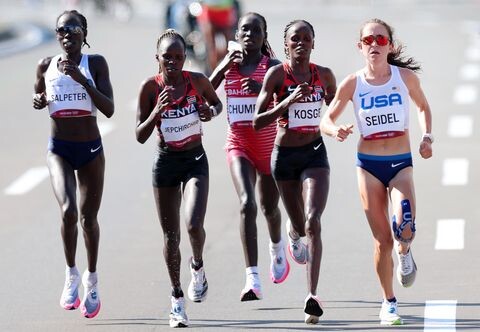
Kosgei, who is the Olympic silver medalist, won the 2019 Chicago and 2020 London 2020 Marathon while Jepkosgei triumphed in New York City in 2019 and London in 2021.
In the men's category, a new overall champion will be crowned with Olympic champion and world marathon record holder Eliud Kipchoge not taking part.
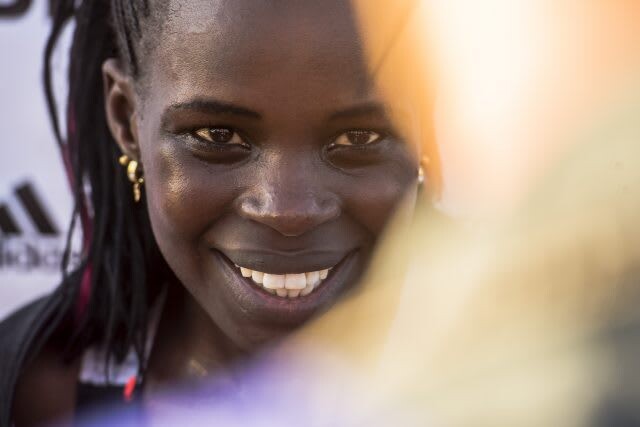
Kipchoge has won the last four editions of the World Marathon Majors but his only victory this time round was at the Tokyo Olympics in August.
Ethiopia's Sisay Lemma currently has the advantage having amassed 34 points from his victory at the 2021 London Marathon and third place at the same venue in 2020.
Only two men can deny the Ethiopian a first AbbottWMM series crown and they are both scheduled to run the New York City Marathon.
His compatriot Kenenisa Bekele’s nine points earned at the 2021 BMW Berlin Marathon mean he can equal Lemma’s 34 points if he wins in the Big Apple.
Belgium’s Abdi Nageeye finished second in the Olympic Marathon and could overtake Lemma if he registers his first Abbott WMM victory this weekend.
Should Bekele triumph, there is no head-to-head contest during the series between the two Ethiopians, so the six race directors of the Majors would each have a vote to decide the champion.
If neither Bekele nor Nageye make the top two, Kenyan pair Vincent Kipchumba and Lawrence Cherono will claim second and third respectively.
Kipchumba bagged the Vienna and Amsterdam marathons in 2019, clocking 2:06:56 and 2:05:09 and finished second in the London in 2020, where he posted 2:05:42 before registering 2:04:28 in 2021.
Cherono clinched the Boston and Chicago marathons in 2019 ,posting 2:07:57 and 2:05:45 respectively and came home second in the Valencia marathon in 2020 in a time of 2:03:04.
by William Njuguna
Login to leave a comment
TCS New York City Marathon
The first New York City Marathon, organized in 1970 by Fred Lebow and Vince Chiappetta, was held entirely in Central Park. Of 127 entrants, only 55 men finished; the sole female entrant dropped out due to illness. Winners were given inexpensive wristwatches and recycled baseball and bowling trophies. The entry fee was $1 and the total event budget...
more...Debutante Gebreslase and Adola triumph in Berlin
It may have been her marathon debut, but Gotytom Gebreslase looked anything but inexperienced on her way to winning the BMW Berlin Marathon, crossing the finish line of the World Athletics Elite Platinum Label road race in 2:20:09 on Sunday (26).
Just moments earlier, fellow Ethiopian Guye Adola won an enthralling tactical men’s race in 2:05:45, seeing off a late-race challenge from Kenya’s Bethwel Yegon after dropping Ethiopian legend Kenenisa Bekele a few kilometres prior.
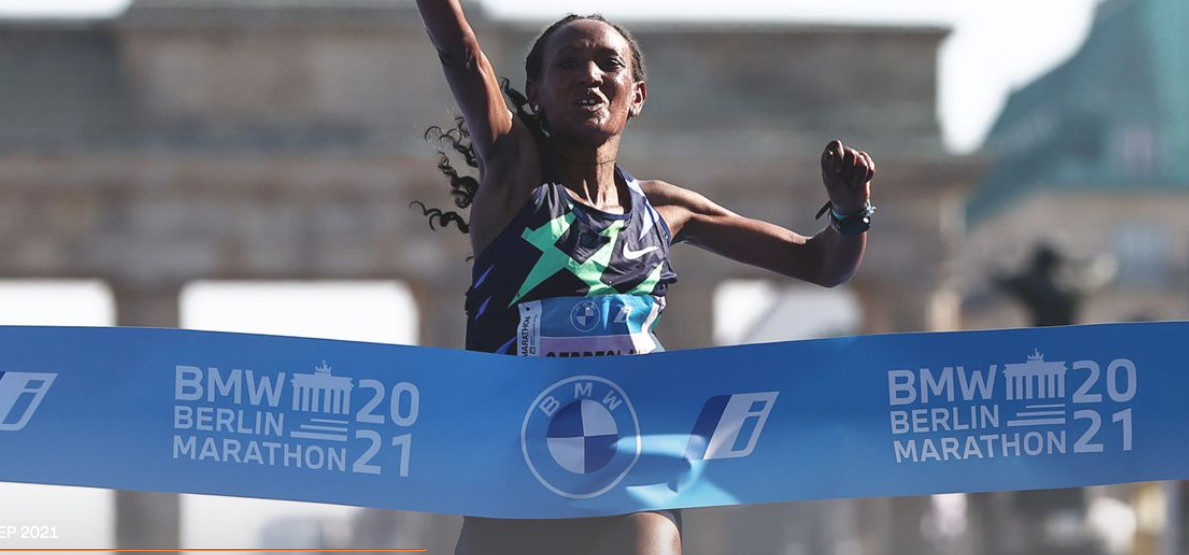
The 47th edition of the race, which is part of the Abbott World Marathon Majors Series, took place under strict hygiene regulations. With 24,796 runners from 139 nations, the race was the biggest marathon in the world since the start of the coronavirus pandemic.
The men had been operating at world record pace for the first half, while the leading women were close to course record pace. With temperatures above 20C during the final part of the race, the pace dropped in the closing stages of both contests, but Gebreslase and Adola both had just enough in reserve to hold on to victory.
Gebreslase was part of a large lead pack that went through 5km in 16:30 and 10km in 33:03. Six women were in the group, including Ethiopia’s Hiwot Gebrekidan who was looking to improve on her world-leading 2:19:35 run from Milan earlier in the year.
By the time the pack reached half way in 1:09:19, just four women remained in contention: Gebrekidan, Gebreslase, fellow Ethiopian Helen Tola and Kenya’s Fancy Chemutai. Their split suggested a finishing time inside 2:19, but the conditions soon started to get tougher.
Within the space of a few kilometres, Chemutai and Tola had been dropped, reducing the race to a two-woman Ethiopian battle between Gebrekidan and Gebreslase. The latter, feeling surprisingly good on her debut marathon, started to test the water and edged ahead of her compatriot over the next few kilometres, opening up a 13-second gap by 35km, reached in 1:54:54.
Her split at that point still pointed towards a sub-2:19 finish, but Gebreslase’s pace dropped significantly over the next five kilometres, which she covered in 17:40. Lucky for her, Gebrekidan was struggling even more, widening the gap between the pair. And Tola was now more than two minutes adrift of Gebrekidan in third.
Gebreslase continued to pull away in the final few kilometres, winning comfortably in 2:20:09, the eighth fastest winning time recorded in Berlin. Gebrekidan held on to second place in 2:21:23 and Tola completed the Ethiopian podium sweep in 2:23:05.
The men’s race may not have resulted in a world record as had been hyped in the days leading up to the event, but it eventually became an enthralling three-way contest between Bekele, Adola and Yegon.
The opening pace was swift as the six-man lead pack breezed through 5km in 14:22 and 10km in 28:47. Bekele and Adola formed one third of that group, while Yegon bided his time further down the field, passing through 10km in 29:40 as part of the larger chase pack.
Shortly after passing through 15km in 43:12 – still well inside world record pace – Bekele started to lose contact with the rest of the lead group, who went on to reach the half-way point in 1:00:48. Bekele, meanwhile, covered the first half in 1:01:00, which was the pre-determined target for the pacemakers.
Over the course of the next five kilometres, though, Bekele worked his way back to the front. The 30km split of 1:27:48 (2:03:30 pace) essentially confirmed that the world record would live to see another day, but the race was shaping up to be a three-way battle between Bekele, Adola and Kenya’s Philemon Kacheran.
Kacheran didn’t last too much longer in that trio, however, and Bekele started to struggle again as Adola was gritting his teeth out in front. Further behind, however, Yegon continued to make his way through the field. Having been seventh at 20km and sixth at 25km, the Kenyan moved into fourth place at 35km, just 17 seconds behind Adola.
One mile later, Yegon passed Bekele to move into second place. Another kilometre after, he joined Adola at the front. But with the temperature now above 20C, Yegon was unable to maintain that momentum. A final surge from Adola at 40km was enough to see off Yegon’s challenge, allowing the Ethiopian to open up a decisive gap.
Adola, the runner-up in 2017, went on to win in 2:05:45 with Yegon following 29 seconds later to take the runner-up spot in a PB of 2:06:14. Bekele was third in 2:06:47.
“I thought before the race that I could beat Kenenisa,” said Adola, who finished second in Eliud Kipchoge in the German capital four years ago. “It was so hot, my feet were burning.”
Bekele, meanwhile, appeared slightly disappointed but confirmed there’s still more to come from the three-time Olympic gold medallist. “The big problem for me was the lack of training because of the pandemic,” he said. “I just couldn't do as well as I hoped. That does not mean my career is over.”
Login to leave a comment
BMW Berlin Marathon
The story of the BERLIN-MARATHON is a story of the development of road running. When the first BERLIN-MARATHON was started on 13th October 1974 on a minor road next to the stadium of the organisers‘ club SC Charlottenburg Berlin 286 athletes had entered. The first winners were runners from Berlin: Günter Hallas (2:44:53), who still runs the BERLIN-MARATHON today, and...
more...Gebrekidan sets sights on course record
An attack on the women’s course record – which currently stands to Gladys Cherono at 2:18:11 – is looking increasingly likely in Berlin on Sunday.
Three women with sub-2:22 PBs will take to the startline, including world leader Hiwot Gebrekidan of Ethiopia, who clocked a PB of 2:19:35 in Milan in May.
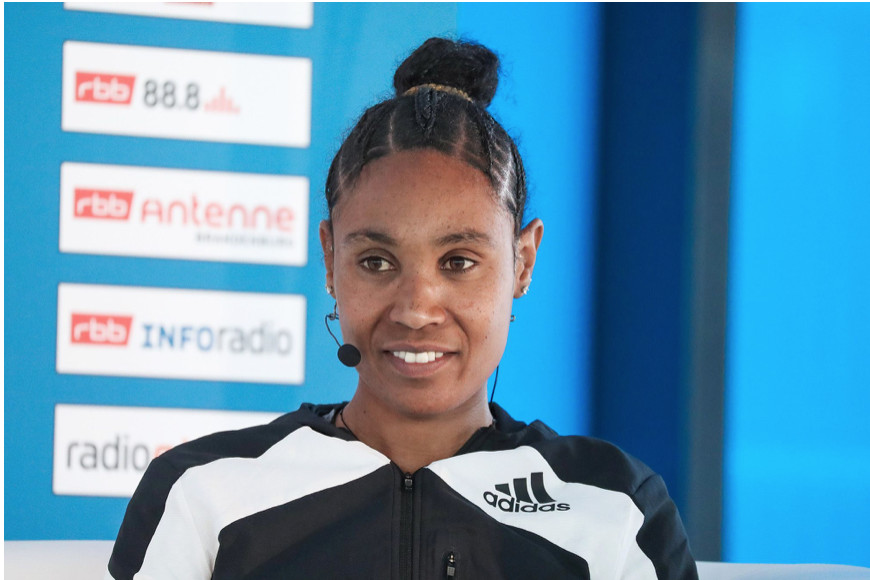
“I’ve been preparing for the BMW Berlin Marathon for a long time and want to run my personal best on Sunday,” said the 26-year-old, who will be contesting her first ever World Marathon Majors race.
When pressed as to what pace she would like, Gebrekidan said: “I’d actually like to hold back in the first half. But I nevertheless plan to go through halfway in just under 69 minutes.”
Such a split at halfway would put Gebrekidan not only in contention for the course record but also the Ethiopian record, currently held by Worknesh Degefa with her time of 2:17:41 in Dubai in 2019.
Fellow Ethiopian Shure Demise also has a personal best in her sights. She is a highly experienced marathon runner, having run a dozen of them. “I’ve spoken with other women runners and know what a fast course is Berlin. I have high expectations for myself and want to break my personal record,” said Demise, whose best currently stands at 2:20:59 and could well go under 2:20 for the first time.
“2:20 remains a breakthrough target for women in the marathon,” said race director Mark Milde. “We’ll have to wait and see what times are actually run. But a pace like that (69 minutes at half way) would certainly suit us. And a course record would be great.”
Fancy Chemutai, a late addition to the field, also has high hopes for Sunday’s race. The Kenyan has a best of 2:24:27 and will be running only her second marathon. Her half marathon best of 1:04:52 – which makes her the seventh fastest woman of all time – suggests she still has a lot of untapped potential at the full marathon distance. No other woman on the Berlin start list has such a fast half marathon performance.
Gotytom Gebreslase could be another one to watch on Sunday. The Ethiopian, who won the world U18 3000m title back in 2011, will be making her marathon debut. Given her PBs of 1:07:52 for the half marathon and 14:57.33 for 5000m, the 26-year-old could be in contention for a podium place.
About 25,000 runners from 139 countries are expected to take part in the 47th edition of the Berlin Marathon. Although more than 90% of participants have been vaccinated against the coronavirus, the race will take place under strict hygiene regulations.
“For months our challenge has been to organise a safe BMW Berlin Marathon, and we’ve achieved our objective,” said Jürgen Lock, the general manager of race organiser SCC Events. “It’s a very good feeling; we’ve arrived at the new reality.”
by World Athletics
Login to leave a comment
Bekele back in Berlin and targeting third triumph
Ethiopian long distance superstar Kenenisa Bekele will defend his BMW Berlin Marathon title on Sunday (26) in what will be his fourth appearance at the World Athletics Elite Platinum Label road race.
Two years ago he ran through the Brandenburg Gate on his way to an Ethiopian record of 2:01:41, a mere two seconds outside Eliud Kipchoge’s world record set on the same course just one year prior. Thanks to that performance, Bekele remains the second fastest marathon runner of all time and heads Berlin’s elite field for this Sunday.
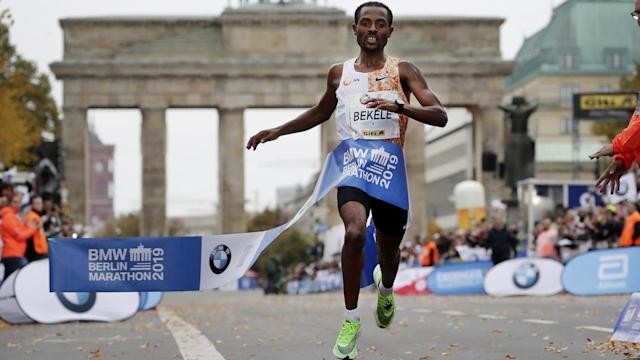
Although the 39-year-old made no concrete mention of a world record attempt at Friday’s press conference, there were signs that he had the target on his mind.
Eleven marathon world records have been set in Berlin so far, more than at any other race. Could Bekele make it a round dozen on Sunday?
“I have prepared well, but the pandemic hasn’t made it easy in the last two years,” said Bekele. Asked about the difference with his 2019 race in Berlin where he went so close to the world record, the three-time Olympic gold medallist said: “At the time it wasn’t clear whether I could run that fast. This time I have more confidence and will do my best.
“Sunday may not be my last chance of the world record, I want to run a couple of years more,” added the 39-year-old, who won the 2016 Berlin title in 2:03:03, only six seconds outside the then world record. The next year he had to drop out.
This Sunday offers Bekele arguably his best chance of breaking the world record, which is a view shared by his Dutch manager Jos Hermens. “Kenenisa has energy and the ability to be right up front at over 40,” said Hermens. “But Sunday’s race will be his best chance of a world record.”
The race is about more than one man, though, as the field includes 10 men with sub-2:10 PBs. “We have connected almost seamlessly with where we had our last race in 2019,” said race director Mark Milde. “Naturally we are delighted that we have been able to recruit a very strong field with Kenenisa Bekele at the top.”
Bekele’s compatriots Guye Adola and Olika Adugna could also produce impressive results. Adola famously stuck with Kipchoge until the very last stages of the 2017 Berlin Marathon, eventually finishing second in 2:03:46 – a time which, at that point, was the fastest marathon debut in history.
“I want to be among the leading group on Sunday,” said Adola, the 2014 world half marathon bronze medallist.
Adugna, meanwhile, also produced a notable performance on his marathon debut, clocking 2:06:15 in Dubai last year. The 22-year-old hasn’t raced since then, so will be raring to go on Sunday.
by World Athletics
Login to leave a comment
The women’s race at the BMW Berlin Marathon on Sunday is looking increasingly like an attack on the course record
The best time to date was set three years ago when the Kenyan Gladys Cherono ran 2:18:11. Half-a-dozen women will be on the start line who have run under 2:25 and among them is the Ethiopian Hiwot Gebrekidan, the fastest women in the world this year thanks to her personal best of 2:19:35 in winning the Milan title in April.
In the light of the continung Corona pandemic the number of starters for this year has been considerably reduced. Around 25,000 runners are expected to compete on Sunday. The BMW Berlin Marathon will take place under strict hygiene rules.
Any participant on the start line must have been vaccinated, or recovered from the virus or be able to produce a negative PCR test. Over 90% of runners entered have been vaccinated. Spectators on the course will also be requested to maintain social distance and wear a mask covering nose and mouth.
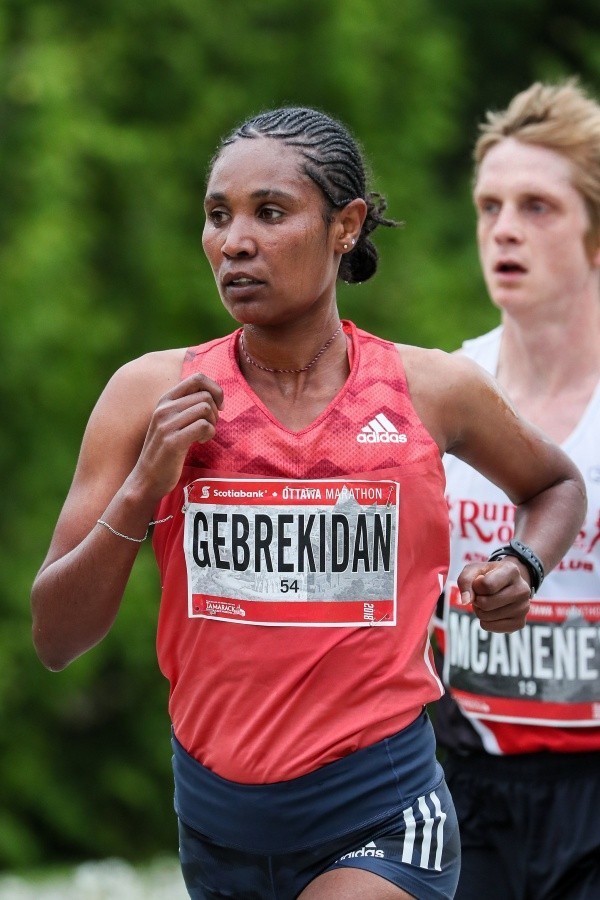
“I’ve been preparing for the BMW Berlin Marathon for a long time and want to run my personal best on Sunday,” said Hiwot Gebrekidan at Thursday’s press conference in Berlin. When pressed as to what pace she would like, the 26-year-old answered: “I’d actually like to hold back in the first half. But I nevertheless plan to go through halfway in just under 69 minutes.” Such a split at halfway would put Hiwot Gebrekidan not only in contention for the course record but also the Ethiopian national record, currently held by Worknesh Degefa with her time of 2:17:41 in Dubai in 2019.
Her fellow Ethiopian Shure Demise also has a personal best in her sights. She is a highly experienced marathon runner, having run a dozen of them. “I’ve spoken with other women runners and know what a fast course is Berlin. I have high expectations for myself and want to break my personal record,” said Shure Demise, whose best currently stands at 2:20:59 and could well go under 2:20 for the first time.
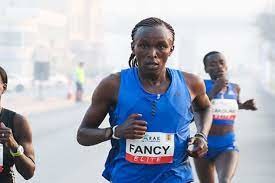
“2:20 remains a breakthrough target for women in the marathon,” said the race director Mark Milde, adding in response to Hiwot Gebrekidan’s announcement of going for a super-fast time at halfway: “We’ll have to wait and see what times are actually run. But a pace like that would certainly suit us. And a course record would be great.”
A woman who has been a late addition to the elite field in Berlin but is capable of a surprise is Fancy Chemutai. The Kenyan has a best of 2:24:27 and will be running only her second marathon. If she were able to convert her enormous potential to good effect in the classic distance she may well be in contention for the win. Her half marathon best of 64:52 makes her the seventh fastest woman at the distance of all time. No other woman on the Berlin start list has such a fast half marathon performance.
Rabea Schöneborn from the local club LG Nord Berlin will be running a marathon for the first time in her home town. The 27-year-old improved her best to 2:27:03 in April in her second race at the distance, missing selection for the Olympics by just nine seconds. This inadvertently created the opportunity of turning that preparation to potentially good effect at the BMW Berlin Marathon. “Berlin is definitely a highlight, I’m really looking forward to Sunday. Up to now I’ve only had the experience of elite marathons but now I can see and feel what’s it like to be part of a big city marathon. Having spectators will definitely give me a lift,” said Rabea Schöneborn.
The Berlin athlete hopes to take advantage of the fast course and what looks likely to be excellent weather conditions to improve her best time. “I always try to hold back a little so I can run the second half faster. That’s also the plan on Sunday,” explained Rabea Schöneborn. Nevertheless, she is still looking at a fast halfway split: “Something between 73:10 and 73:20 is the plan.”
by AIMS
Login to leave a comment
BMW Berlin Marathon
The story of the BERLIN-MARATHON is a story of the development of road running. When the first BERLIN-MARATHON was started on 13th October 1974 on a minor road next to the stadium of the organisers‘ club SC Charlottenburg Berlin 286 athletes had entered. The first winners were runners from Berlin: Günter Hallas (2:44:53), who still runs the BERLIN-MARATHON today, and...
more...Kenenisa Bekele will lead the entries for Sunday’s BMW Berlin Marathon
When Kenenisa Bekele lines up for the BMW Berlin Marathon this weekend (Sept 26) it marks the beginning of an unprecedented period of marathon racing. Due to Covid-related postponements, five of the six Marathon Majors will be staged within a 42-day period. If you’re a fan of the classic 26.2-mile distance, you are in for a feast.
Bekele is clearly excited by the prospect as he is racing in not just one but two of these races. After Berlin on Sunday he will attempt to recover and re-boot before tackling the New York City Marathon in early November.
Here is how the autumn marathon period plays out…
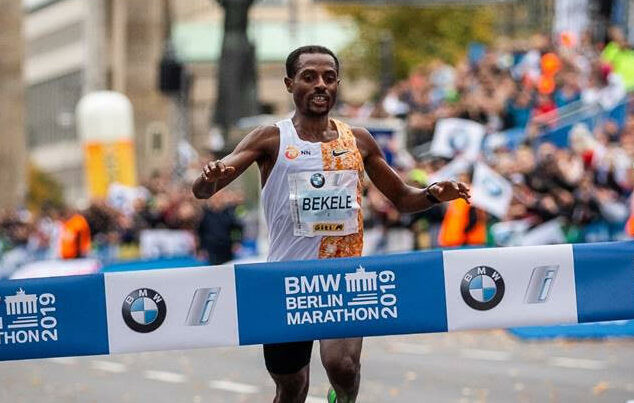
Sept 26 – BerlinOct 3 – LondonOct 10 – ChicagoOct 11 – BostonNov 7 – New York
Tokyo Marathon, which is also one of the Marathon Majors, was due to take place on October 17 too, but has been called off due to the pandemic. However the TCS Amsterdam Marathon is still on October 17 – and this Dutch race often sees fast times.
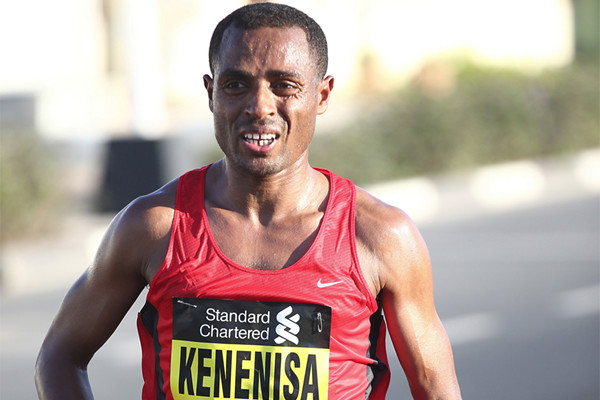
First comes Berlin, though. Bekele has not raced since March last year and during this time he has seen his world 5000m and 10,000m records fall to Joshua Cheptegei. Last October he was due to race in London but withdrew on the eve of the race with a calf injury. He is now aged 39 but don’t write him off. People thought he was a spent force in 2019 but he came within two seconds of the world record with 2:01:41 in Berlin.
“I will come back with good energy and motivation,” says Bekele. “The last race in Berlin motivated me a lot, so I hope I will fulfil my plan this year.”
Bekele will be among around 25,000 runners in Berlin as mass participation road running emerges from the pandemic. His opposition on Sunday includes Guye Adola, an Ethiopian who ran the world’s fastest ever debut marathon of 2:03:46 in Berlin four years ago but has struggled to improve since.
There is also Eliud Kiptanui of Kenya, who has run 2:05:21, plus a further eight men who have run inside 2:07 such as Philemon Kacheran and Festus Talam of Kenya, Olika Adugna and Tadu Abate of Ethiopia, plus Hidekazu Hijikata of Japan.
Adugna won his debut marathon in Dubai in 2:06:15 while Hijikata took the Lake Biwa Marathon victory earlier this year.
The women’s race, meanwhile, includes Hiwot Gebrekidan, who won the Milan Marathon this year in 2:19:35, plus fellow Ethiopian Shure Demise, together with Kenyans Fancy Chemutai and Purity Rionoripo.
Just seven days after Berlin, the Virgin Money London Marathon takes place with the fields led by women’s world record-holder Brigid Kosgei together with fellow Kenyan Joyciline Jepkosgei and Ethiopians Roza Dereje and Birhane Dibaba.
The men’s race in London features Ethiopians Shura Kitata, Mosinet Geremew and Birhanu Legese plus Kenyans Titus Ekiru and Evans Chebet, whereas Brits like Charlotte Purdue and Jonny Mellor will create plenty of home interest.
Chicago includes world champion Ruth Chepngetich of Kenya in the women’s race alongside American hope Sarah Hall, while another home nation hope, Galen Rupp, takes on Ethiopians Getaneh Molla and Seifu Tura in the men’s race.
by Athletics Weekly
Login to leave a comment
BMW Berlin Marathon
The story of the BERLIN-MARATHON is a story of the development of road running. When the first BERLIN-MARATHON was started on 13th October 1974 on a minor road next to the stadium of the organisers‘ club SC Charlottenburg Berlin 286 athletes had entered. The first winners were runners from Berlin: Günter Hallas (2:44:53), who still runs the BERLIN-MARATHON today, and...
more...London Marathon Elite Fields Released, 2020 elite field will be the best in years
Eliud Kipchoge and Kenenisa Bekele face battle from six more sub-2:05 runners in elite men’s race.
World record holder Brigid Kosgei among six sub-2:20 athletes in elite women’s race.
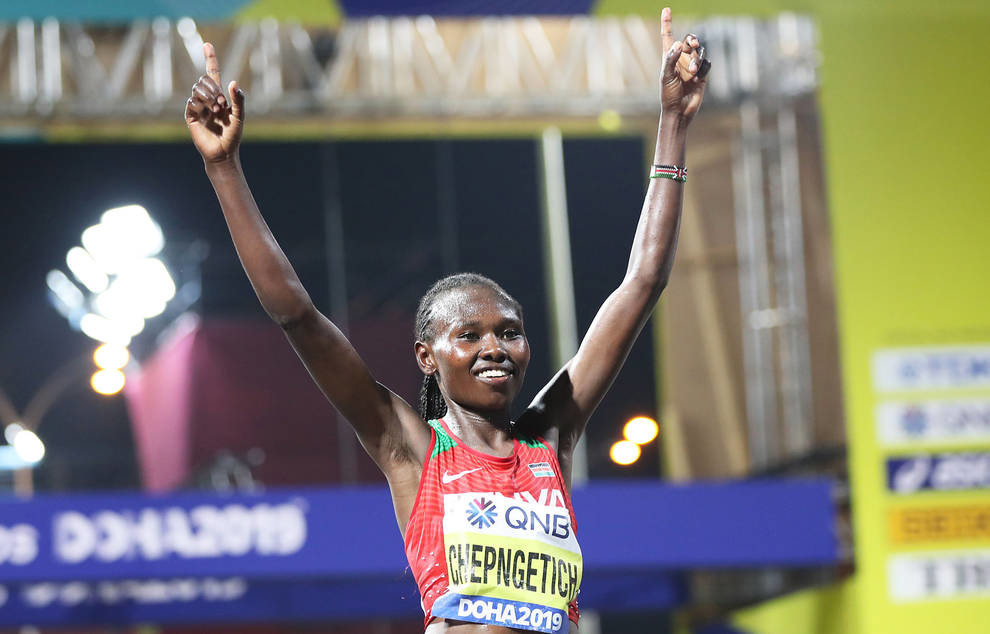
The Virgin Money London Marathon today confirmed the full fields for the historic elite men’s and women’s races on Sunday 4 October.
The elite men’s race – headlined by the greatest marathon runners in history, Eliud Kipchoge (KEN) and Kenenisa Bekele (ETH) – will include eight athletes who have run sub 2:05 marathons, including Mosinet Geremew (ETH) and Mule Wasihun (ETH) who were second and third respectively at the 2019 Virgin Money London Marathon.
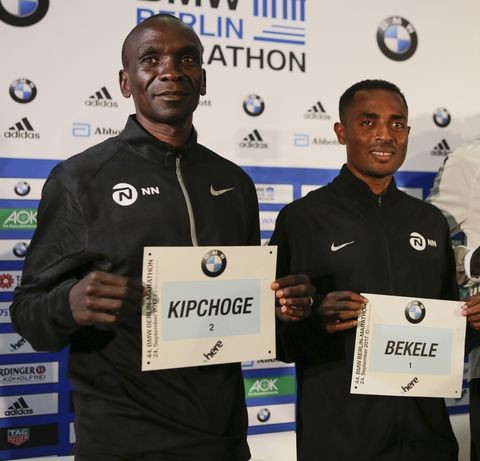
Sisay Lemma (ETH), Tamirat Tola (ETH), Marius Kipserem (KEN) and Shura Kitata (ETH) are the other men to have run inside 2:05 while Sondre Nordstad Moen (NOR), who broke the European hour record in Norway earlier this month by running 21.132km, is also included.
The news that World Athletics will lift its suspension of the Olympic qualification system for marathon races from 1 September means there will also be a clutch of athletes racing with the ambition to achieve the Olympic standard of 2:11:30.
Adding yet further superstar quality to the event, the Virgin Money London Marathon can also announce that Sir Mo Farah will be a pacemaker for this group of Olympic hopefuls.
Farah, the four-time Olympic champion, said: “The London Marathon has been so important to me since I was a schoolboy and when they asked me to do this I thought it would be great to help. I am in good shape, I’ll be in London that week and it fits in with my training.
“I’ve been training here in Font Romeu with some of the British guys who are going for that Olympic qualifying time and they are good lads. I know just how special it is just to compete for your country at an Olympic Games and it would be great to help other athletes achieve this. With the current global situation and lack of races, the Virgin Money London Marathon in October is the best chance for athletes to run the Olympic qualifying time.”
Hugh Brasher, Event Director of the Virgin Money London Marathon, said: “This is the greatest Olympian in British track and field history coming to run as a pacemaker to help others achieve their dreams of making the Tokyo Olympic Games. It is a wonderful gesture of togetherness from Sir Mo and I’m sure his presence and support will inspire the athletes chasing that qualifying time on Sunday 4 October.”
At present only two British athletes other than Farah have run inside this time: Callum Hawkins, who has been pre-selected for the Olympic Games marathon, and Jonny Mellor who ran 2:10:03 in Seville in January. Farah himself has opted to run on the track at the Olympic Games.
Mellor is one of a number of British athletes running the 2020 Virgin Money London Marathon – The 40th Race – on Sunday 4 October. Other British men joining Mellor on the Start Line are Chris Thompson and debutants Ross Millington and Ben Connor.
Among the leading domestic women confirmed to race are Steph Twell, who ran a personal best (PB) of 2:26:40 in Frankfurt last year to go sixth on the British all-time rankings, and 2018 British marathon champion Lily Partridge.
The elite women’s field is headlined by world record holder Brigid Kosgei (KEN). Confirmed today are five other women who have run inside 2:20: current world champion Ruth Chepngetich (KEN), 2019 Valencia Marathon champion Roza Dereje (ETH), 2018 Virgin Money London Marathon champion Vivian Cheruiyot (KEN), 2019 Frankfurt Marathon winner Valary Jemeli (KEN) and 2019 Amsterdam Marathon champion Degitu Azimeraw (ETH).
Ashete Bekere (ETH), the winner of last year’s BMW Berlin Marathon, Alemu Megertu (ETH), the 2019 Rome Marathon champion, plus Sarah Hall (USA) and Sinead Diver (AUS) are also included in a star-studded race.
Login to leave a comment
TCS London Marathon
The London Marathon was first run on March 29, 1981 and has been held in the spring of every year since 2010. It is sponsored by Virgin Money and was founded by the former Olympic champion and journalist Chris Brasher and Welsh athlete John Disley. It is organized by Hugh Brasher (son of Chris) as Race Director and Nick Bitel...
more...Postponed Prague Marathon Now Cancelled
The 2020 Volkswagen Prague Marathon, which had been postponed from May 3, to October 11 due to the COVID-19 pandemic, has now been cancelled. In addition two other important road races in Prague which are also organized by the Czech Republic’s most important race organizer RunCzech, the Sportisimo Prague International Half-Marathon and Birell Grand Prix, have also been cancelled. All three events had received World Athletics Gold Label status.
“We were ready with our races,†wrote RunCzech president Carlo Capalbo in an open letter to the runners and other stakeholders involved in his organization’s events. “Everyone was in place. Our team. Our volunteers. Our partners and suppliers. Everything was ordered and most of it in our warehouse. And then? COVID.â€
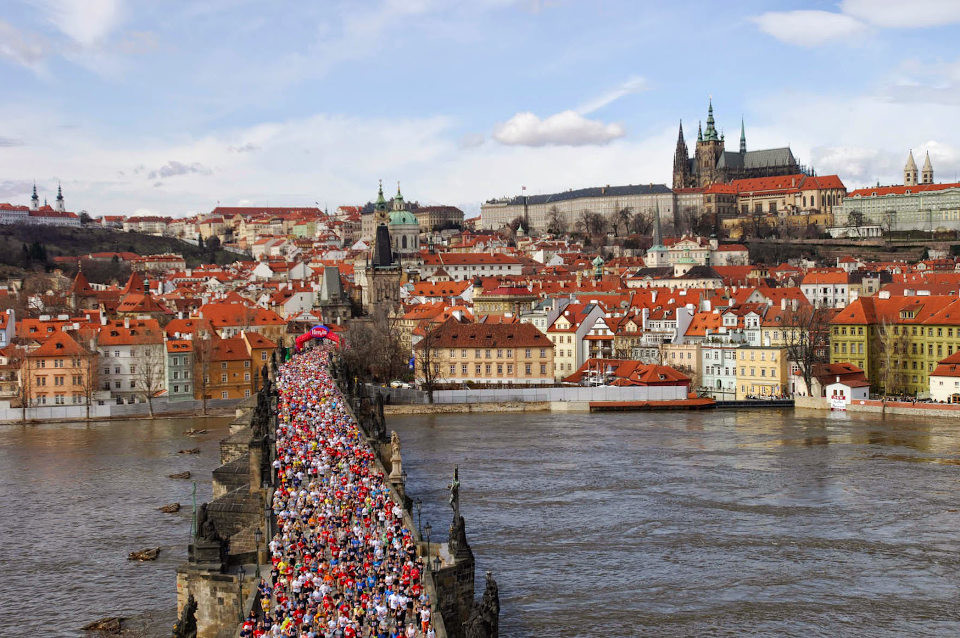
Capalbo continued: “We hoped against hope that autumn would be better. But it was not to be.â€
Large sporting events will not be permitted in the center of Prague, Capalbo explained, forcing the cancellations. He said that all registered runners will have the option to transfer their entries to the 2021 or 2022 editions of these events for no additional cost.
“The decision taken is extremely difficult for us,†Capalbo added. “But we take comfort knowing that Czech government officials had the foresight and the wisdom to take action designed to keep us safe. We take comfort knowing that our health care professionals were tireless and brilliant in helping to treat the virus. We take comfort knowing that when it hurts this bad we must be doing something good. And we take comfort knowing that we will run again.â€
The Sportisimo Prague International Half-Marathon, part of the international SuperHalfs race series, was originally scheduled for Saturday, March 28, but was then postponed until Sunday, September 6. The Birell Grand Prix, a 10-K with a women’s 5-K, was always scheduled for Saturday, September 5. Collectively, these events had 26,192 finishers in 2019, according to the Race Results Weekly Athletes Performance Database. The half-marathon was the largest event with 10,517 finishers.
Capalbo emphasized that RunCzech’s other races outside of Prague were still scheduled to happen on the revised schedule his organization issued earlier this year: the Mattoni Olomouc Half-Marathon (August 30), Mattoni Ústà Half-Marathon (September 19), Mattoni Karlovy Vary Half-Marathon (October 24), and Mattoni České Budějovice Half-Marathon (October 31).
These cancellations in Prague follow closely the cancellations of three of the running industry’s most important events: the Boston Marathon (postponed from April 20, to September 14, before being cancelled), the BMW Berlin Marathon (September 27) and the TCS New York City Marathon (November 1). Dozens of other fall road races have also been cancelled across the Americas, Europe and Japan including large and important events like the Great North Run Half-Marathon in England, Buenos Aires Marathon in Argentina, the Dam tot Damloop 10 Mile in the Netherlands, the Paris-Versailles 16-K in France, and the Osaka Marathon in Japan.
Capalbo, an Italian who has lived in the Czech Republic for decades, remains optimistic. “Very often, over the course of our 27-year history, when we’ve faced adversity, we’ve looked for inspiration from our guiding spirit, Emil Zatopek,†Capalbo wrote. “A man who famously said that when you feel like you can’t go on, ‘go faster.'â€
by Let's Run
Login to leave a comment
2020 Postponed Prague Marathon Now Cancelled
The 2020 Volkswagen Prague Marathon, which had been postponed from May 3, to October 11 due to the COVID-19 pandemic, has now been cancelled. In addition two other important road races in Prague which are also organized by the Czech Republic's most important race organizer RunCzech, the Sportisimo Prague International Half-Marathon and Birell Grand Prix, have also been cancelled. All three events had received World Athletics Gold Label status.
"We were ready with our races," wrote RunCzech president Carlo Capalbo in an open letter to the runners and other stakeholders involved in his organization's events. "Everyone was in place. Our team. Our volunteers. Our partners and suppliers. Everything was ordered and most of it in our warehouse. And then? COVID."
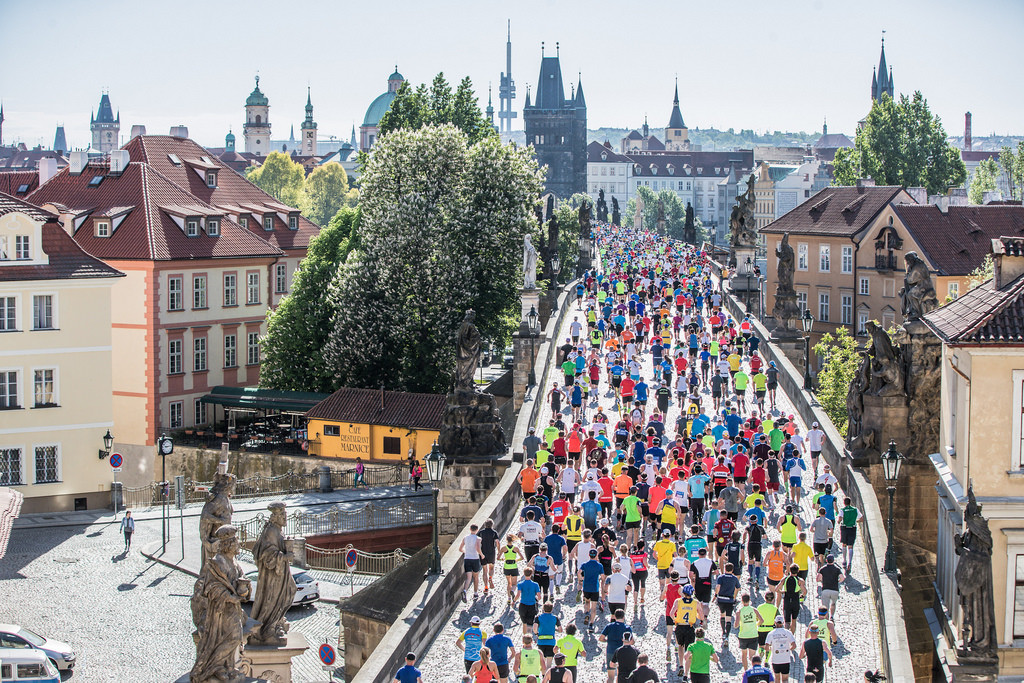
Capalbo continued: "We hoped against hope that autumn would be better. But it was not to be."
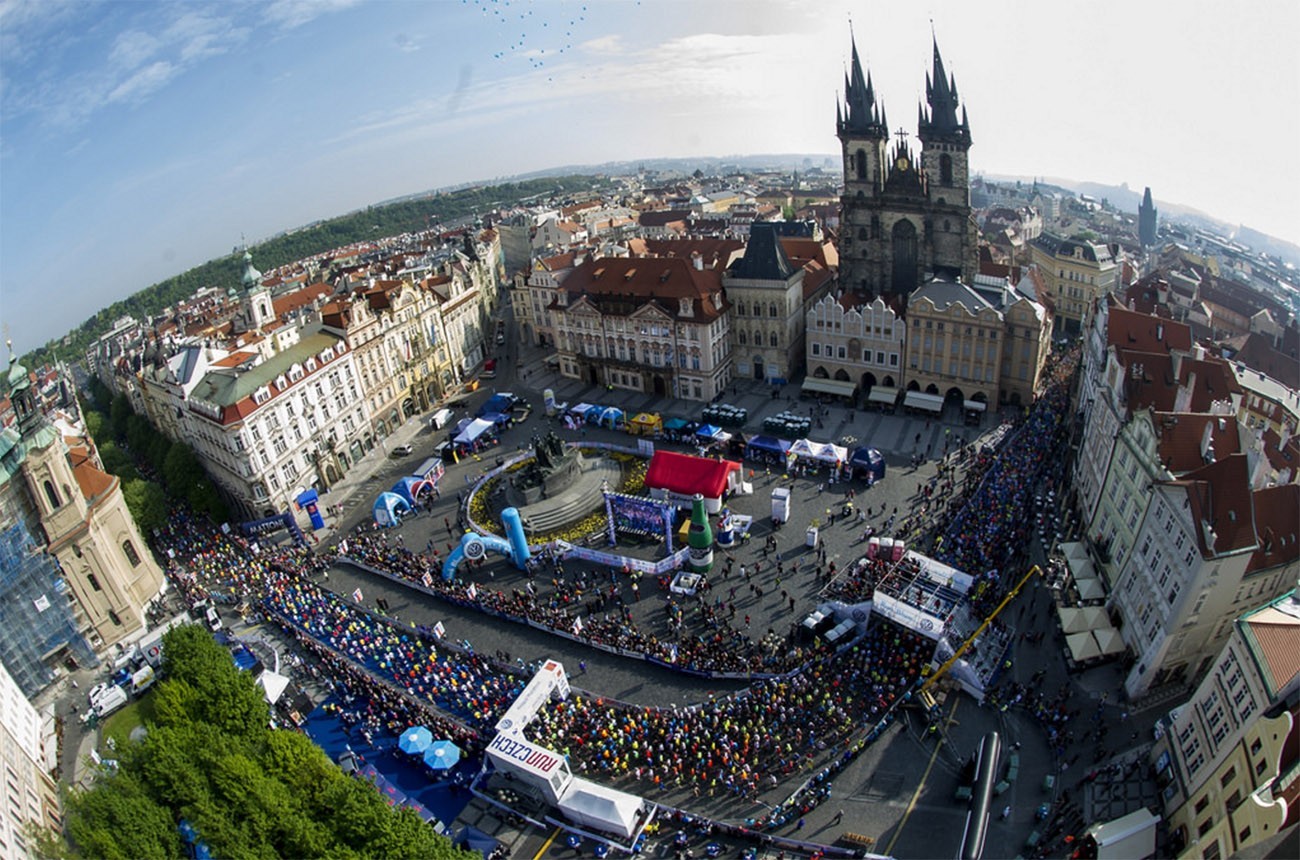
Large sporting events will not be permitted in the center of Prague, Capalbo explained, forcing the cancellations. He said that all registered runners will have the option to transfer their entries to the 2021 or 2022 editions of these events for no additional cost.
"The decision taken is extremely difficult for us," Capalbo added. "But we take comfort knowing that Czech government officials had the foresight and the wisdom to take action designed to keep us safe. We take comfort knowing that our health care professionals were tireless and brilliant in helping to treat the virus. We take comfort knowing that when it hurts this bad we must be doing something good. And we take comfort knowing that we will run again."
The Sportisimo Prague International Half-Marathon, part of the international SuperHalfs race series, was originally scheduled for Saturday, March 28, but was then postponed until Sunday, September 6. The Birell Grand Prix, a 10-K with a women's 5-K, was always scheduled for Saturday, September 5. Collectively, these events had 26,192 finishers in 2019, according to the Race Results Weekly Athletes Performance Database. The half-marathon was the largest event with 10,517 finishers.
Capalbo emphasized that RunCzech's other races outside of Prague were still scheduled to happen on the revised schedule his organization issued earlier this year: the Mattoni Olomouc Half-Marathon (August 30), Mattoni Ústí Half-Marathon (September 19), Mattoni Karlovy Vary Half-Marathon (October 24), and Mattoni Ceské Budejovice Half-Marathon (October 31).
These cancellations in Prague follow closely the cancellations of three of the running industry's most important events: the Boston Marathon (postponed from April 20, to September 14, before being cancelled), the BMW Berlin Marathon (September 27) and the TCS New York City Marathon (November 1). Dozens of other fall road races have also been cancelled across the Americas, Europe and Japan including large and important events like the Great North Run Half-Marathon in England, Buenos Aires Marathon in Argentina, the Dam tot Damloop 10 Mile in the Netherlands, the Paris-Versailles 16-K in France, and the Osaka Marathon in Japan.
Capalbo, an Italian who has lived in the Czech Republic for decades, remains optimistic. "Very often, over the course of our 27-year history, when we've faced adversity, we've looked for inspiration from our guiding spirit, Emil Zatopek," Capalbo wrote. "A man who famously said that when you feel like you can't go on, 'go faster.'"
by David Monti
Login to leave a comment
Prague Marathon
The Volkswagen Prague Marathon, established in 1995, has evolved into a premier event on the international running calendar, renowned for its scenic course through one of Europe's most picturesque cities. The marathon's route meanders through Prague's historic streets, offering runners views of iconic landmarks such as the Charles Bridge and Old Town Square. The predominantly flat terrain provides an excellent...
more...The postponed Haspa Marathon Hamburg will be allowed to take place with 10,000 runners, both elite and mass races
In a surprising turn of events, the postponed Haspa Marathon Hamburg will be allowed to take place with both elite and mass races on Sunday, September 13. The event, which was originally scheduled for April 19, has been granted an exemption by German authorities –who had implemented a ban on all large events through October 24– because organizers have agreed to implement a rigorous anti-COVID hygiene plan. The event is a World Athletics Gold Label Road Race.
“We are optimistic that the Haspa Marathon Hamburg will be started on 13 September,” said chief organizer Frank Thaleiser through a statement. “We have the plans and the infrastructure required. We will now make detailed plans together with the city to realize the race.”
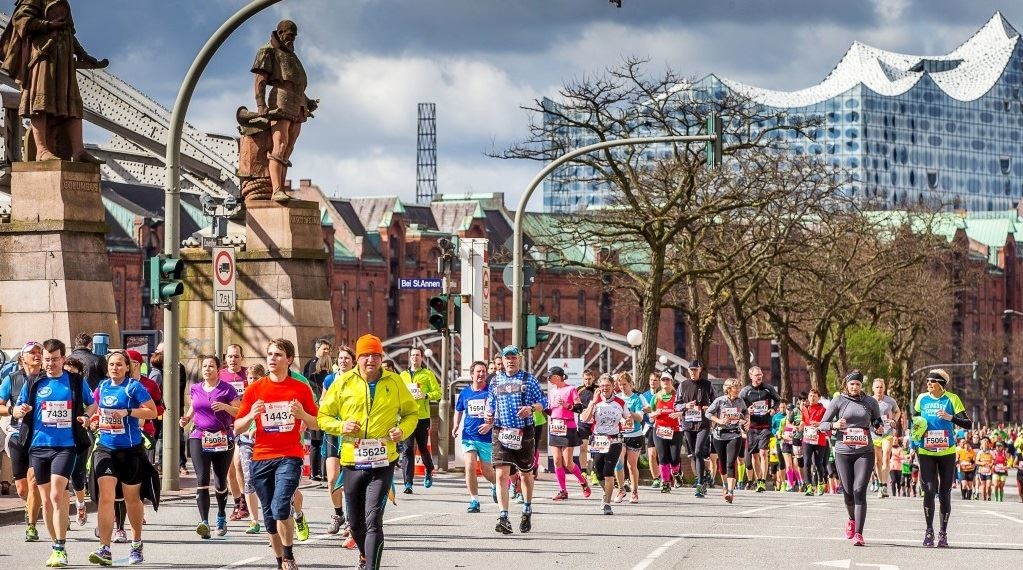
Organizers are expecting 10,000 runners for the marathon, plus an additional 4,000 in a companion half-marathon (last year’s marathon had 10,079 finishers). The marathon and half-marathon will have different start and finish areas. Runners in the half-marathon will start in several groups between 8:00 and 8:30 a.m., while the marathon runners will begin racing at 9:30 a.m. with a starting time window of just under two hours. The athletes will be sent on the course in “batches” of 1,000 per starting group in roughly ten-minute intervals.
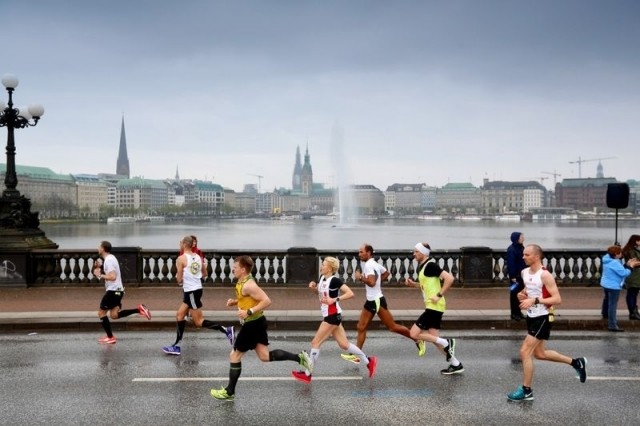
To ensure physical distancing before the race, runners will assemble in predetermined groups in different halls of the Expo building. There, and also in the finish areas, a total of 120,000 square meters of space will be available to the organizers and under their control; spectators will not be allowed to enter. Disinfection stations will be set up both in the event areas and along the course.
Moreover, all participants will be given a tubular scarf with a breathing filter. These must be worn over the nose and mouth in the event area including the start and finish areas. During the race runners must have these with them and put them over mouth and nose after they cross the finish line. No open drinks or individual food offerings will be available in the finish area; instead all participants will receive a refueling package. Other facilities which are usually on offer, such as massage and showers, will not be available.
“The organizational and hygiene policy should demonstrate that a running event with up to 14,000 participants within a city environment can be carried out responsibly while respecting the restrictions on contact and current hygiene guidelines since the outbreak of the COVID-19 pandemic,” Thaleiser added.
The elite field will be scaled down to about 30 athletes, organizers said. These will be the only athletes standing together on the starting line. These athletes will have to undergo testing for the novel corona virus before the race, and will only be drawn from certain countries given travel restrictions. Participation by athletes from countries where the novel corona virus poses a higher risk will not be allowed, either in the elite or the mass field.
The detailed hygiene policy was developed with the help of Manchester Metropolitan University in England which offers a masters degree in Crowd Safety and Risk Analysis.
The Haspa Marathon Hamburg was founded in 1986. Ethiopians Tadu Abate (2:08:26) and Dibaba Kuma (2:24:42) were the race champions in 2019. The course records are 2:05:30 by Kenya’s Eliud Kipchoge in 2013, and 2:21:54 by Ethiopia’s Meselech Melkamu in 2016.
Separately, the massive BMW Berlin Marathon, scheduled for Sunday, September 27, has yet to announce how their event will be staged this year, if at all. Their most recent statement, dated May 27, said that officials were continuing “to put all our energy into considering various options” for the race. An announcement is expected, soon.
by David Monti
Login to leave a comment
Haspa Marathon Hamburg
The HASPA MARATHON HAMBURG is Germany’s biggest spring marathon and since 1986 the first one to paint the blue line on the roads. Hamburcourse record is fast (2:05:30), the metropolitan city (1.8 million residents) lets the euphoric atmosphere spill over and carry you to the finish. Make this experience first hand and follow the Blue Line....
more...Berlin Marathon´s organizers have said they need more time to examine their options as discussions continue on whether the race will take place in 2020
SCC Events had previously announced that the World Marathon Major would not take place on its original September 27 date, leading to many publications reporting the race as cancelled.
This was due to restrictions put in place by the local Government, which placed a ban on gatherings of more than 5,000 people until October 24.
A decision is still to be made by SCC Events on this year's race, however, with further information to be released by the end of June at the latest.
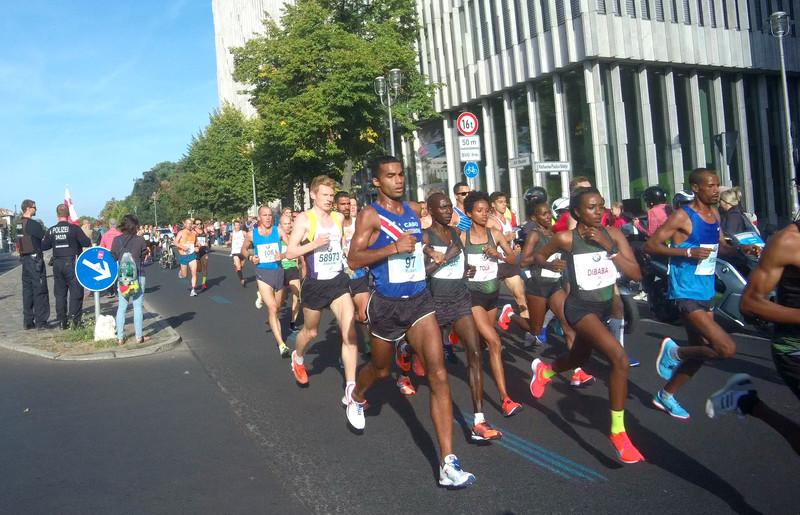
Many major marathons around the world have faced a similar fate with the races in Boston and London, which are also part of the World Marathon Majors, postponed to September and October respectively.
"Due to the size of the event and the large number of people involved, we need a little more time to examine different options for this implementation of the further procedure," SCC said.
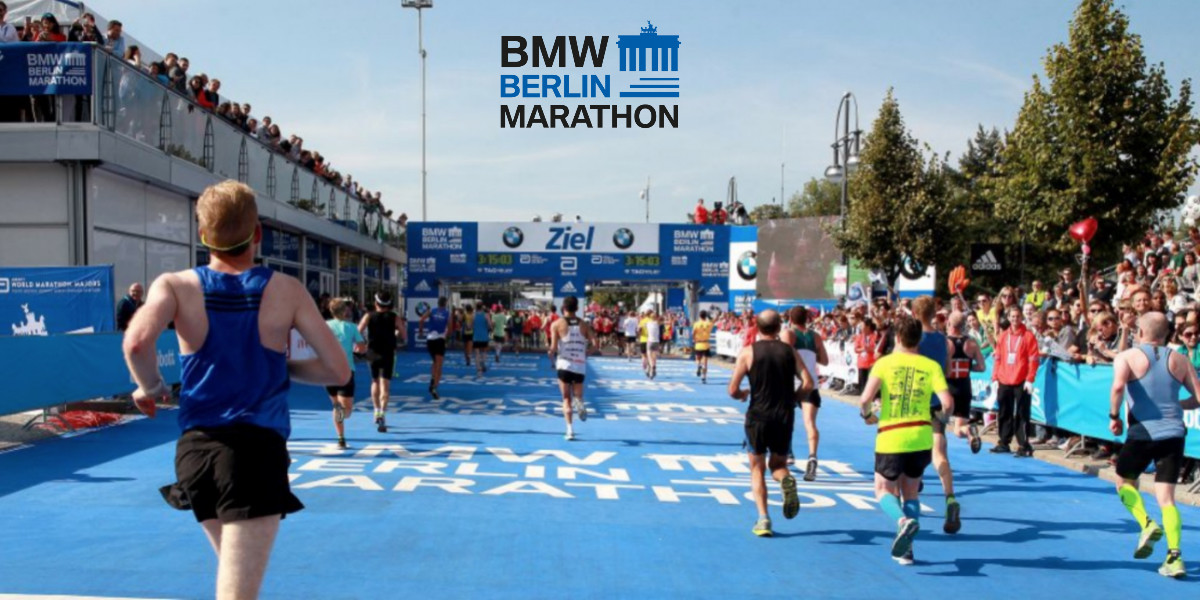
"In addition, at the moment we cannot work on the upcoming tasks in full team strength; like many others, the SCC Events team is currently on short-time work.
"Nevertheless, as usual, we put all the available energy into this process and will contact you by the end of June at the latest with details on the further procedure relating to the BMW Berlin Marathon.
"If we have new information beforehand, we will of course let you know immediately."
In Germany, there are more than 172,000 confirmed cases of COVID-19 nationwide, resulting in the deaths of more than 7,600 people.
The 2018 edition of the race saw Kenya's Eliud Kipchoge smash the men's marathon world record in a time of 2 hours 1min 39sec.
This was nearly bettered by Ethiopia's Kenenisa Bekele last year, who was two seconds short on his way to victory.
by Michael Houston
Login to leave a comment
BMW Berlin Marathon
The story of the BERLIN-MARATHON is a story of the development of road running. When the first BERLIN-MARATHON was started on 13th October 1974 on a minor road next to the stadium of the organisers‘ club SC Charlottenburg Berlin 286 athletes had entered. The first winners were runners from Berlin: Günter Hallas (2:44:53), who still runs the BERLIN-MARATHON today, and...
more...World record holder Brigid Kosgei will defend her title at the Virgin Money London Marathon
The 25-year-old Kenyan broke Paula Radcliffe’s 16-year-old marathon world record at the Bank of America Chicago Marathon last October clocking an incredible time of 2:14:04. The record-breaking run came six months after Kosgei won the London Marathon for the first time.
“I am very much looking forward to returning to the Virgin Money London Marathon," Kosgei said. "Last year was an incredible year for me and it started by winning in London. Coming back will be very special and I hope it can be the start of another memorable year.”
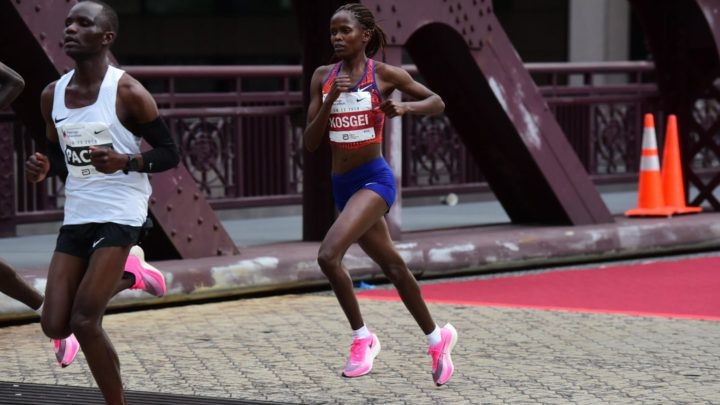
Brigid Kosgei is joined in the elite women’s field by a stellar list of rivals, four of whom have also run sub-2:19 marathons.
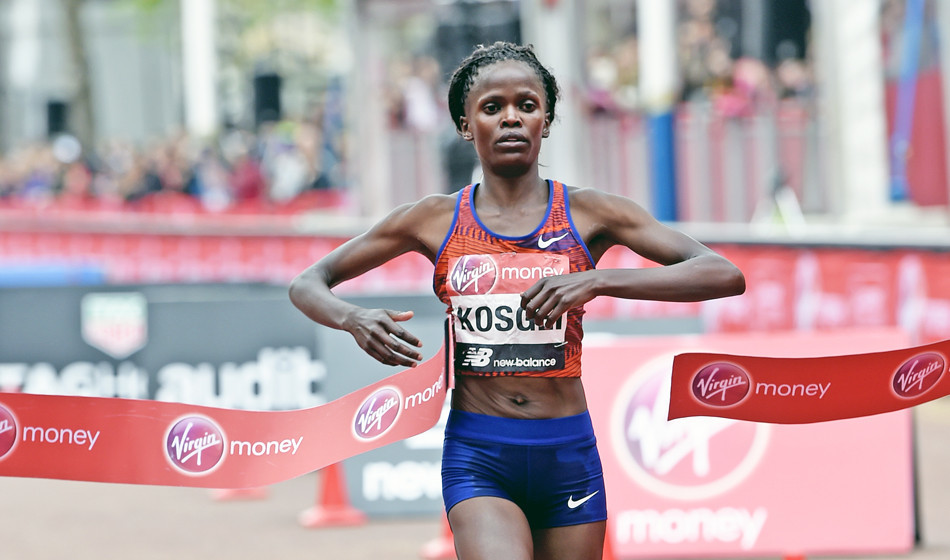
The list includes 2018 London Marathon winner Vivian Cheruiyot of Kenya, three-time BMW Berlin Marathon champion Gladys Cherono of Kenya, 2019 Valencia Marathon champion Roza Dereje of Ethiopia and the reigning world champion Ruth Chepngetich, also from Kenya.
Also on the start line will be the world half marathon record holder and 2019 TCS New York City Marathon champion Joyciline Jepkosgei who is joint top of the Abbott World Marathon Majors (AWMM) Series XIII leaderboard alongside Kosgei and Chepngetich.
The London elite men's field will be announced on Tuesday 14 January and the complete fields announced on Friday 17 January.
Login to leave a comment
TCS London Marathon
The London Marathon was first run on March 29, 1981 and has been held in the spring of every year since 2010. It is sponsored by Virgin Money and was founded by the former Olympic champion and journalist Chris Brasher and Welsh athlete John Disley. It is organized by Hugh Brasher (son of Chris) as Race Director and Nick Bitel...
more...At least US$2.5million in extra revenue will be made available for a comprehensive integrity programme for road running in 2020, under a new funding scheme announced by World Athletics and the Athletics Integrity Unit
World Athletics has today announced a schedule of more than 165 Label road events that will be held in 2020, including the first Platinum Label races.
Each race will contribute to the system approved by the World Athletics Council this year, by which the financial burden for out-of-competition drug testing is shared by all road race stakeholders – organisers, athlete managers and athletes.
Races will contribute according to their status: Platinum marathons $66,667, Gold marathons $15,000, Silver marathons $10,000 and Bronze marathons $5,000; Platinum road races $20,000, Gold road races $10,000, Silver road races $5,000 and bronze road races $2,500.
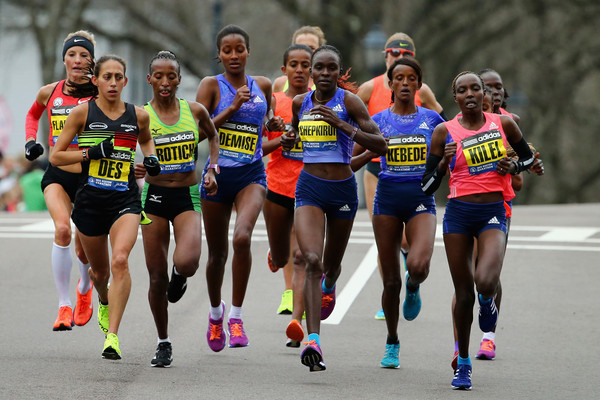
The list of Label events that will take place from January to September 2020 was released today. More races will be added when their race dates are confirmed.
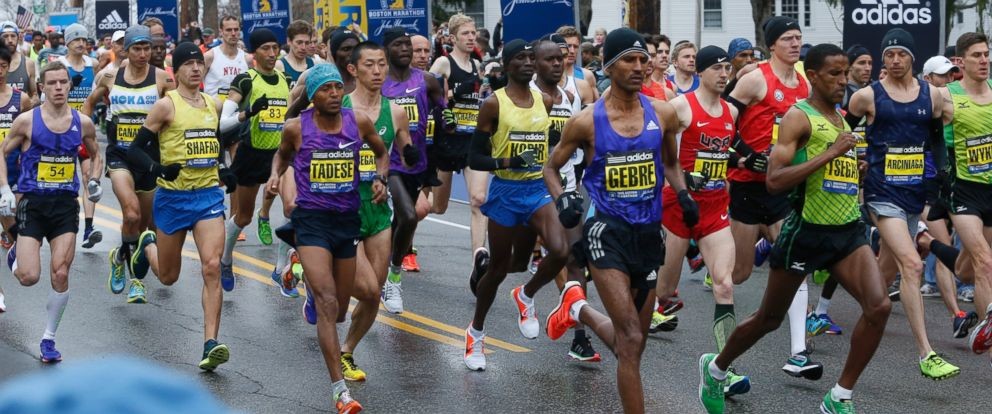
Their contributions, together with the fees managers pay for their athletes included in the testing pool – $500 for Gold status athletes and $1000 for Platinum – and the 1.5% levy on prize money that athletes agreed to contribute, make up the bulk of the fund. In all, that means some US$2.6 to 3.2 million in funding will be available in 2020. The programme, which includes out-of-competition testing, investigation and education, will be carried out by the Athletics Integrity Unit.
The list of Gold and Platinum status athletes for 2020, determined by their position in the world rankings, was also released today.
“This is a brilliant example of our key stakeholders coming together to protect the integrity of our sport,’’ World Athletics CEO Jon Ridgeon said. “I would like to thank our athletes, race directors and athlete managers for supporting this important scheme, which will greatly enhance the Athletics Integrity Unit’s efforts to ensure that all leading road runners are subject to a comprehensive anti-doping programme.’’
Under the previous system, the AIU and IAAF had funding to test just the first 50 athletes (the marathon and half marathon athletes) in the testing pool, which left an alarming shortfall in out-of-competition testing of athletes who compete on the rapidly expanding and increasingly lucrative road running circuit. World Athletics granted 103 races label status in 2017. That number grew to 114 in 2018 and 136 in 2019.
David Howman, Chairman of the Athletics Integrity Unit, said: “This is a great reflection on the commitment to integrity of the road running industry. It is encouraging that so many races, athletes and managers have signed up to make tangible financial contribution to address the challenges in a proactive manner.
“With this new funding we will be able to put together a comprehensive integrity programme that will ensure that a level playing field can be enjoyed by all road runners. We are in advance stage of planning its implementation and this will begin with extensive education sessions this December in Ethiopia and Kenya, where a vast majority of the Platinum and Gold Label athletes are based.”
Platinum Label to debut in 2020.- The new Platinum Label races, first announced in 2018, will be introduced in 2020. Nine races have been granted Platinum status thus far, with up to three more late season races to be confirmed early next year.
Platinum Label races are required to have at least three athletes with Platinum Status, per gender, and at least four athletes with Gold Status (or higher) start the race and compete with a bonafide effort. (2020 Label Road Race regulations).
The number of Platinum Status athletes for 2020 will be fixed at 30 per gender and determined in a two-phase process. The first, based on positions in the world rankings on 15 October 2019, will include the top 19 ranked athletes in the 'marathon' event group, the top three ranked athletes in the 'road running' event group (excluding any athletes who acquired Platinum Status in the 'marathon' group) and the top ranked athlete in the '10,000m' event group (excluding any athletes who acquired Platinum Status in the 'marathon' and 'road running' event groups).
The second phase will add seven more athletes, per gender, based on positions in the world rankings on 28 January 2020: the top four ranked athletes in the 'marathon' group, the top two in the 'road running' group and the top one in the 10,000m event group who had not yet achieved Platinum Status.
World Athletics Platinum Label events, Tokyo Marathon, Nagoya Women’s Marathon, Seoul Marathon, BAA Boston Marathon, Virgin Money London Marathon, Media Maratón de Bogotá, BMW Berlin MarathonBank of America Chicago MarathonTCS New York City Marathon
by World Athletics
Login to leave a comment
Kenya’s Gladys Cherono returns to the Berlin Marathon in search of a fourth victory on Sunday
One year on from breaking the course record at the BMW Berlin Marathon, Kenya’s Gladys Cherono returns to the IAAF Gold Label road race in search of a fourth victory on Sunday.
Cherono clocked 2:18:11 in the German capital 12 months ago, winning her third Berlin Marathon title and breaking a course record that had stood for 13 years. A fourth triumph here would give her more wins than any other woman.
“I’ve trained well and my aim is to retain my title,” said Cherono, who stands at sixth on the world all-time list. “I hope also to set a personal best.”
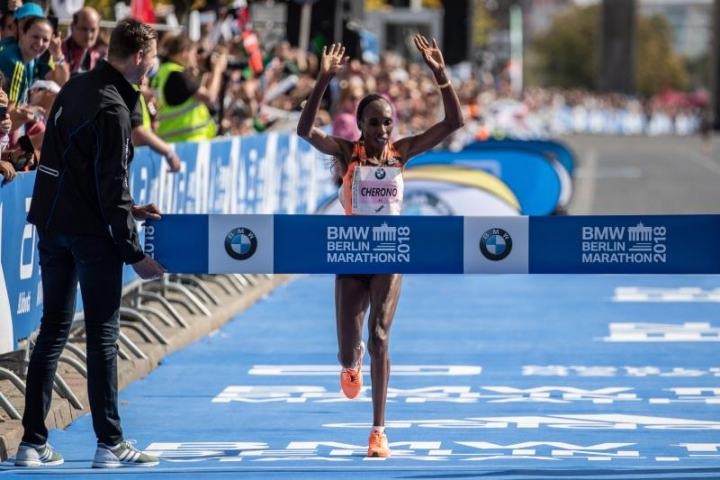
Although her compatriot Vivian Cheruiyot has had to withdraw because of achilles tendon problems, multiple world and Olympic gold medalist Meseret Defar could prove to be a tough competitor.
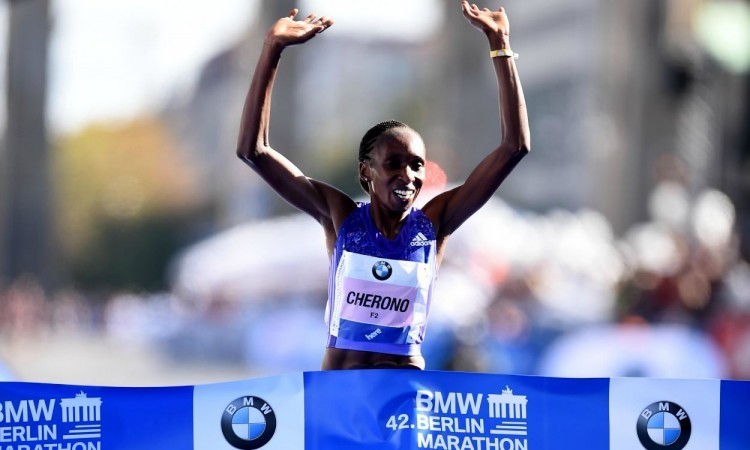
The Ethiopian won Olympic titles at 5000m in 2004 and 2012 and earlier this year clocked a PB of 2:23:33 in what was just her second marathon to date.
“I have had many injuries in recent years but now I’ve been training well,” said the 35-year-old. “I decided to run Berlin because the course is so fast.”
Another Ethiopian, Olympic bronze medalist and 2015 world champion Mare Dibaba, is keen to get back to the form that brought her to a PB of 2:19:52.
Germany’s Melat Kejeta will be making her marathon debut and is hoping to run 2:22, which would be comfortably inside the Olympic qualifying time of 2:29:30 and would make her the third-fastest German woman of all time. Compatriot Anna Hahner is also targeting the Olympic qualifying mark.
by IAAF
Login to leave a comment
BMW Berlin Marathon
The story of the BERLIN-MARATHON is a story of the development of road running. When the first BERLIN-MARATHON was started on 13th October 1974 on a minor road next to the stadium of the organisers‘ club SC Charlottenburg Berlin 286 athletes had entered. The first winners were runners from Berlin: Günter Hallas (2:44:53), who still runs the BERLIN-MARATHON today, and...
more...The worlds 10 most scenic marathons that are worthy of your bucket list
These are the 10 most scenic marathoners you need to put on your bucket list
1) Midnight Sun Marathon, Norway. Head to Tromso, Norway to try an Arctic Marathon where the sun doesn’t set…literally! Norwegians experience the “Midnight Sun” from May 20 to June 22, which allows runners to run a marathon during the night. A big portion of the race happens along the coast, so runners enjoy picturesque views of the Norwegian sea as well as the snow-capped peaks.
2) BMW Berlin Marathon, Germany. This marathon that starts and ends at the Brandenburg Gate takes runners in a large loop around the city. This is the perfect marathon to experience a slice of history as marathoners will pass the iconic Reichstag, Berlin Cathedral, Tiergarten and Potsdamer Platz, to name a few.

3) ​Marathon du Medoc (France). This is a wine and food festival disguised as a marathon! The course will take you through the vineyards of the Médoc in Gironde. Held in the Southwest of France near Bordeaux; food stands and wine tasting stalls dot the entire course of this event. Nibbles offered include pastas, oysters, cheese, steaks, fruits, and the region's famous wines to wash down everything. This fun marathon usually turns into a carnival of spirited, costumed runners as participants are encouraged to dress, according to the year’s theme.
4) The Hong Kong Marathon (Hong Kong). This is easily the biggest participation sporting event in Hong Kong with over 70,000 runners from 90 countries participating in it. Marathoners enjoy some of the best urban landscape. This iconic race unfolds against the backdrop of Hong Kong’s breath-taking skyline and harbour. The full marathon and half marathon, both start at Nathan Road in Tsim Sha Tsui racing up into New Territories, and heading back down to a spectacular finish in Victoria Park on Hong Kong Island. The Hong Kong Marathon has been awarded Gold Label status since the 2016 and with total prize money of US$300,000, it is one of Asia's most prominent marathons.
5) Big Five Marathon (Limpopo, South Africa). This is undoubtedly the wildest marathon in the world! Conducted within the private Entabeni Game Reserve in South Africa, this marathon runs through the African savannahs. True to the marathon’s name, you have a chance of bumping into lions, leopards, rhinos, elephants, and cape buffaloes in addition to the other animals like giraffes, antelopes, etc., along the way. The safety of the runners is not compromised as park rangers watch over the Big Five Marathon to ensure that participants can gaze safely at zebras, leopards, and antelopes as they run.
6) Great Wall Marathon (China). This marathon isn’t for the faint hearted, but it’s the race of a lifetime. Strictly speaking, the marathon route overlaps the Great Wall of China for a small section of the race, but this relatively short section on the Wall is a challenging 5,164 steps. Participants get to run through old villages and see sweeping hillside views, with hundreds of enthusiastic locals cheering for them.

7) Skarkasse 3-Laender Marathon (Germany, Austria and Switzerland). This unique marathon offers runners an opportunity to run through three countries - Germany, Austria and Switzerland in one single race! This 26.2-mile journey starts on the island of Lindau, Germany, before taking runners through several Austrian towns, and then crossing the Swiss border and finishing in Bregenz. The flat terrain, half of which courses along the shores of Lake Constance, features a mix of cobblestone, gravel and asphalt.
8) Big Sur Marathon (California, USA). For the past two years, the Big Sur Marathon sells out in record time! Traversing through one of the world’s most scenic courses, meandering through the coastline along the azure blue waters of the Pacific ocean and redwoods, the Big Sur International Marathon held in California ranks high on the list of challenging marathons due to its alpine terrain and strong headwinds. Known for its incomparable natural beauty and dramatic coastal scenery, this race has a strict 6-hour time limit to complete it.
9) Patagonian International Marathon (Patagonia, Chile). This marathon will take you through the jaw-dropping landscapes of Torres del Paine National Park, a route which makes way through turquoise waters, towering peaks and pristine glaciers. This is also the most eco-friendly race in the world. Instead of medals, participants have a tree planted in their name. The organisers also encourage you to carry your own water bottles to avoid cup waste. So, go ahead and fulfil your dream of running in one of the most pristine places on the planet!
10) Australian Outback Marathon (Australian). Big open skies, cool rock formations, soft red earth under your feet, this marathon was made for adventure seekers and nature lovers. This marathon will give runners a glimpse of the famous Uluru and Kata Tjuta rock formations and sacred sites of the aboriginals of the area.
Login to leave a comment
Midnight Sun Marathon
The Midnight Sun Marathon first started in 1989 and has runners from most of the world, attracted by its special feature of running in the midnight sun. The race starts and finishes at the city center. The runners are facing the Tromso Bridge after 2 km; an uphill from 6 to 43 meters over sea level. After running about 20...
more...Ethiopian Kenenisa Bekele has been added to the men’s field at Berlin Marathon
Organizers of the BMW Berlin Marathon have announced that Kenenisa Bekele has joined a loaded men’s field for the IAAF Gold Label road race on 29 September.
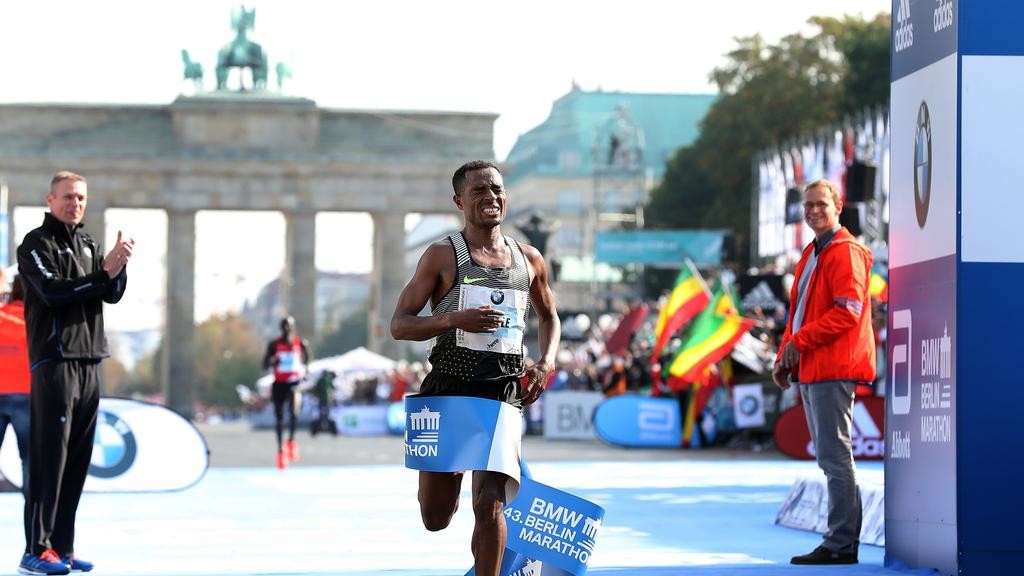
Bekele is one of the greatest distance runners of all time. Along with his three Olympic gold medals, he has amassed 17 world titles on the track, indoors and outdoors, and cross country. His world records for 5000m and 10,000m have stood for 15 years.
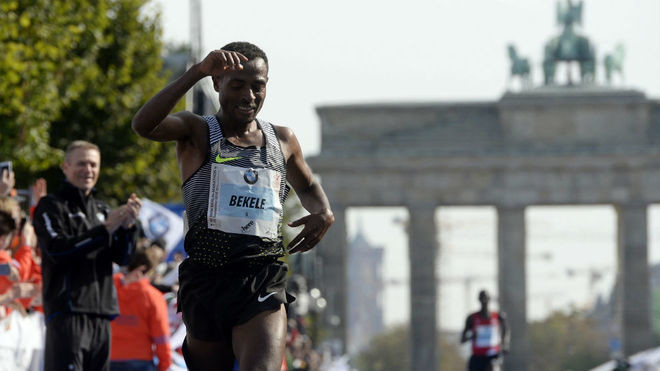
He stepped up to the marathon in 2014 and set a course record of 2:05:04 in Paris on his debut at the distance. He set a personal best of 2:03:03 – which, at the time, was an Ethiopian record and just six seconds off the then world record – when winning the Berlin Marathon in 2016.
On 29 September he will line up against compatriots Guye Adola, Leul Gebrselassie, Sisay Lemma and Birhanu Legese in what looks set to be another memorable race in the German capital.
by IAAF
Login to leave a comment
BMW Berlin Marathon
The story of the BERLIN-MARATHON is a story of the development of road running. When the first BERLIN-MARATHON was started on 13th October 1974 on a minor road next to the stadium of the organisers‘ club SC Charlottenburg Berlin 286 athletes had entered. The first winners were runners from Berlin: Günter Hallas (2:44:53), who still runs the BERLIN-MARATHON today, and...
more...Mary Keitany, Vivian Cheruiyot And Tirunesh Dibaba will battle at the London Marathon
The defending champion Vivian Cheruiyot and the current TCS New York City Marathon champion Mary Keitany return to the Virgin Money London Marathon in 2019.
They join their compatriots Gladys Cherono (2018 BMW Berlin Marathon champion) and Brigid Kosgei (2018 Bank of America Chicago Marathon champion) meaning the winners of the last four Abbott World Marathon Majors will be on the Start Line in London on Sunday 28 April.
Cheruiyot, who is also the reigning Olympic 5000m champion and the runner-up behind Keitany at last November’s TCS New York City Marathon, said: “It was a great moment for me winning last year’s Virgin Money London Marathon and I am very much looking forward to returning in April.
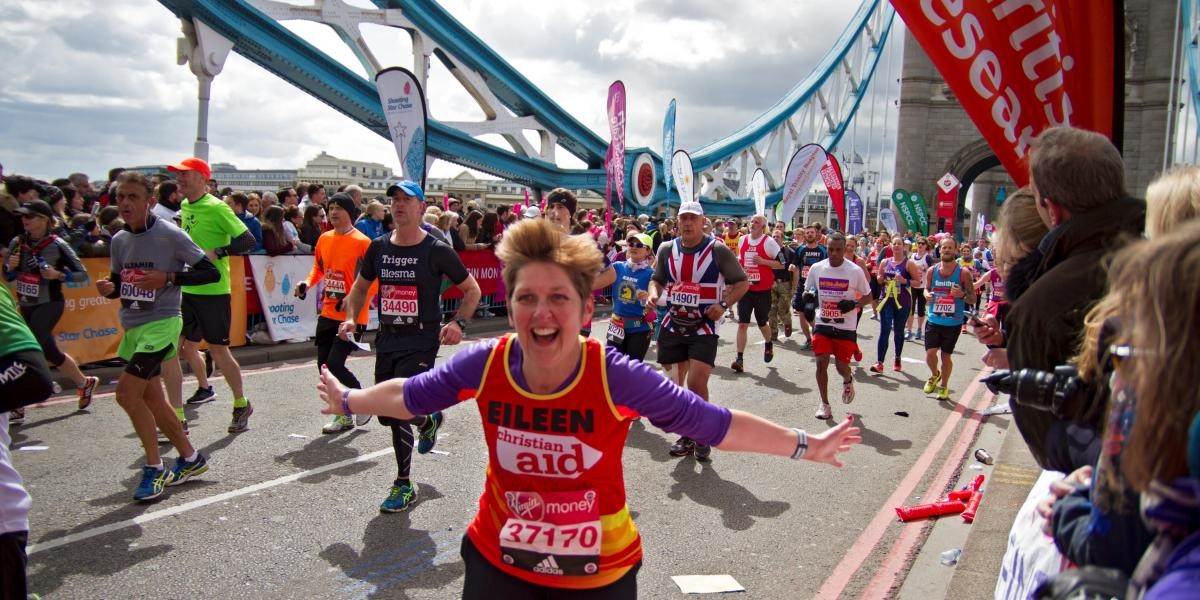
“The line-up for this year’s race is, once again, incredibly strong so I know I will need to be at my very best to repeat last year’s victory but it is a challenge that I’m really looking forward to. I will be ready.”
Also confirmed to run are the Ethiopian trio of Tirunesh Dibaba, the three-time Olympic champion on the track and third fastest woman of all time, who finished second in London and won Chicago in 2017, Tadelech Bekele, who finished third in London last year, and 21-year-old Roza Dereje, second in Chicago and winner of the Dubai Marathon in 2018.
Cherono, Kosgei and Keitany top the current Abbott World Marathon Majors Series XII rankings with 25 points apiece from their wins in Berlin, Chicago and New York. Dereje and Cheruiyot are on 16 points apiece following their second places in Chicago and New York respectively. The Series XII title could be decided in London.
The Abbott World Marathon Majors series adds up points for the best finishes in the world’s six best marathons. Series XII started at the 2018 BMW Berlin Marathon and will finish at the same race in 2019, taking in the 2018 Bank of America Chicago Marathon, 2018 TCS New York City Marathon, 2019 Tokyo Marathon, 2019 Boston Marathon and the 2019 Virgin Money London Marathon.
Hugh Brasher, Event Director, said: “This is a truly amazing women’s field which features the five best women marathon runners in the world last year. The stage is set for a fascinating race on Sunday 28 April.
Login to leave a comment
TCS London Marathon
The London Marathon was first run on March 29, 1981 and has been held in the spring of every year since 2010. It is sponsored by Virgin Money and was founded by the former Olympic champion and journalist Chris Brasher and Welsh athlete John Disley. It is organized by Hugh Brasher (son of Chris) as Race Director and Nick Bitel...
more...World record holder Eliud Kipchoge will defend his title at the Virgin Money London Marathon
Eliud Kipchoge has confirmed he will be running this year's London Marathon. The 2018 World Athlete of the Year, broke the world record in the marathon in Berlin last September, clocking 2:01:39. The 34-year-old Kenyan won his third London marathon title last year, clocking 2:04:17. He is unbeaten in three appearances in London, having notched victories in 2015 and 2016 as well. He also set the course record of 2:03:05 in that 2016 race.
Kipchoge will face Mo Farah of Great Britain, who was previously announced. Farah set the European record over the distance in Chicago last October when he clocked 2:05:11 to collect his first major marathon victory. Earlier in the year, Farah finished third in London in 2:06:21, at the time a national record.
“I had a memorable 2018, winning the Virgin Money London Marathon and then setting a new world record at the BMW Berlin Marathon," Kipchoge said. "I’m hoping that 2019 is just as good to me."
Kipchoge also said he's looking forward to another match-up against Farah.
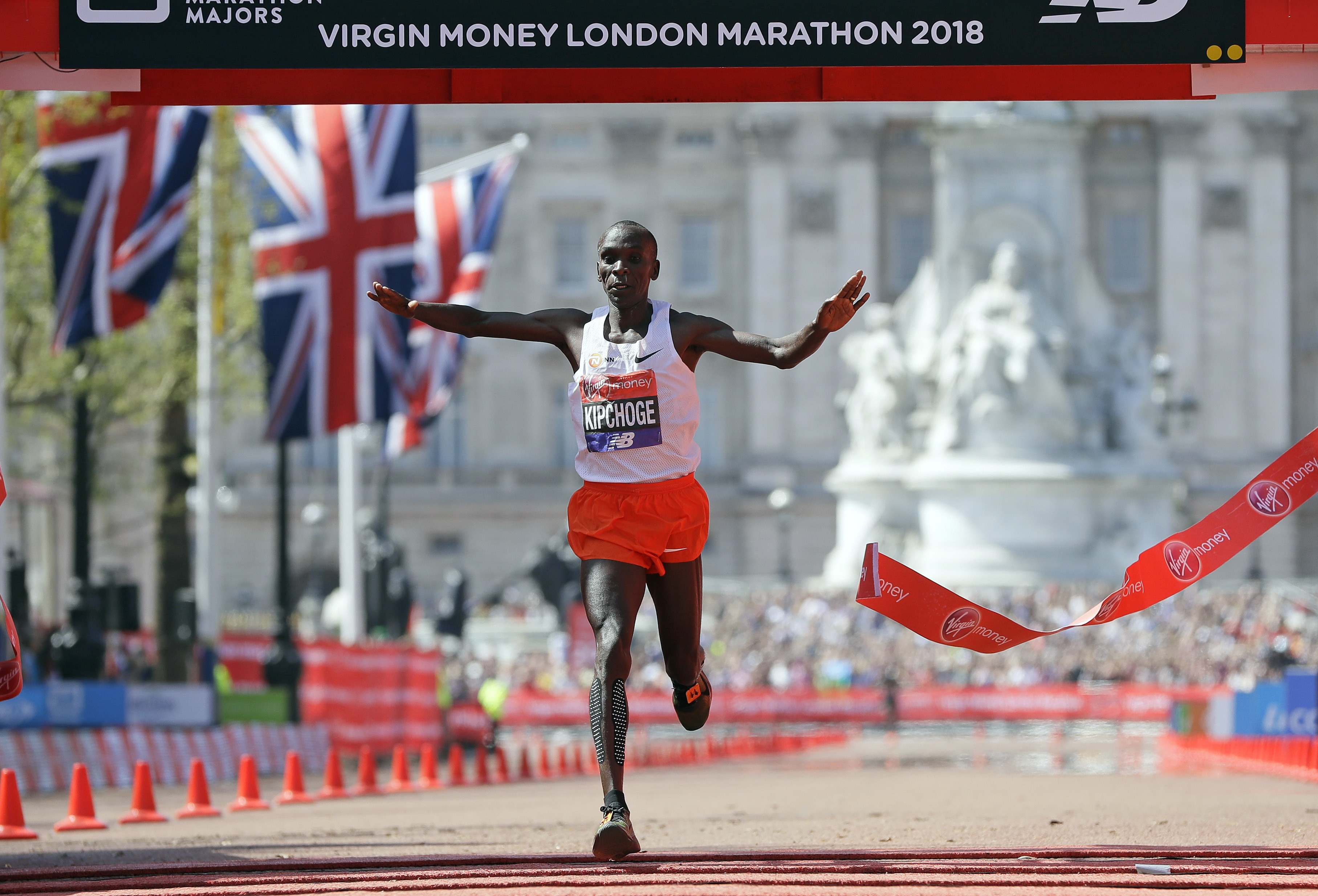
“He is a great champion and proved in Chicago that he can win a major marathon so I relish the battle with him and also the many other great athletes that I’m sure will once again be on the start line in London.”
Those include Ethiopia’s 22-year-old rising marathon star Shura Kitata also returns after finishing runner-up to Kipchoge last year and placing second in the 2018 TCS New York City Marathon.
"There is no doubt that Eliud Kipchoge is the greatest marathon runner of all time," said Hugh Brasher, Event Director of the London race. "His world record at the BMW Berlin Marathon was a legendary sporting moment and one more win at the Virgin Money London Marathon would make him the most successful athlete in the history of the elite men’s race in our event’s illustrious history.
“Since Sir Mo Farah won the Bank of America Chicago Marathon in October, everyone has been talking about another head-to-head between Mo and Eliud and we are absolutely thrilled that this showdown will happen at the 2019 Virgin Money London Marathon."
Login to leave a comment
TCS London Marathon
The London Marathon was first run on March 29, 1981 and has been held in the spring of every year since 2010. It is sponsored by Virgin Money and was founded by the former Olympic champion and journalist Chris Brasher and Welsh athlete John Disley. It is organized by Hugh Brasher (son of Chris) as Race Director and Nick Bitel...
more...Dallas Marathon, Texas’ longest running and largest marathon continues title partnership with BMW global brand through 2023
The Dallas Marathon today announced a multiyear title sponsorship extension with BMW of North America and the Dallas-Fort Worth Area BMW Centers.
Texas’ longest running marathon and the largest annual sporting event in North Texas will continue to be known as the BMW Dallas Marathon through 2023.
“We are thrilled to be extending our title partnership with BMW for the next five years, which includes the Dallas Marathon’s 50th anniversary in 2020,” said Paul Lambert, President of the Dallas Marathon.
”As one of the world’s most admired and distinguished brands, BMW has partnered with us in elevating our guest experience for the thousands of participants and spectators who travel far and wide to participate in our Marathon Weekend of Events.”
The Dallas Marathon was BMW’s first title sponsorship of a major U.S. running event when its partnership was launched in 2016. In just two years, BMW has coordinated several exclusive initiatives for BMW Dallas Marathon participants, including a chance to receive a VIP trip and entry to the BMW Berlin Marathon through its sweepstakes program.
Additionally, the Dallas-Fort Worth BMW Centers work with the Dallas Marathon in coordinating a series of free 5K social runs leading up to race weekend to help promote awareness and excitement throughout the local community. “BMW is looking forward to extending our title partnership with an iconic marathon that represents our brand very well in a major metropolitan market,” noted Craig Westbrook, VP of BMW North America.
”Together, BMW and the Dallas Marathon will continue to fuel health and wellness and raise funds for the race's beneficiary the Texas Scottish Rite Hospital for Children.”
Login to leave a comment
Jerome Drayton's Canadian marathon record of 2:10:09 has stood for nearly 43 years
Login to leave a comment
BMW Berlin Marathon, fast times and intense battles, maybe a world record
Login to leave a comment
Abera Kuma of Ethiopia wants to break the world record at BMW berlin marathon
Login to leave a comment
Ethiopian Tirunesh Dibaba has been confirmed for the 45th annual BMW Berlin Marathon
Login to leave a comment
Wilson kipsang, Eliud Kipchoge and Zersenay Tadese will face off at BMW Berlin Marathon
Login to leave a comment


